Welcome to Dr. Elzeiny Islamic Studies Class
1. This is a site for translation of the
Holy Quran using easy English.
2. This is a site for Meaning of
Quran in Pictures.
3. Books about the Names of
Allah ﷻ [Book 1] [Book 2] [Brief Meanings]
Choose for yourself. Where would you like to
live?


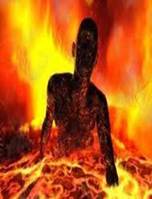
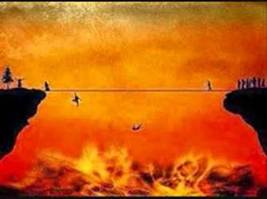


Table of Contents
Lesson [2]: The Knowledge of Allah ﷻ.
Lesson [3]: The Name of Allah ﷻ Al-Wakeel (The One we depend on) Part 1
Lesson [4]: The Name of Allah ﷻ Al-Wakeel (The
One we depend on) Part II
Lesson [5]: Sweet and Sour Mercy
Lesson [6]: Believe in the Unseen World
Lesson [7]: Pillars of Faith - Believe in Allah ﷻ.
Lesson [8]: Pillars of Faith - Believe in Angels.
Lesson [9]: Pillars of Faith - Believe in the Books, the
Prophets the Day of Judgment and the Qadar
Lesson [11]: Pillars of Islam – (3) Zakah, (4) Fasting
and (5) Haj.
Lesson [13]: Reply to "Muslims are terrorists
and Islam is the religion of terror"
Lesson [14]: Reply to “Islam Spread by the Sword”
Lesson [15]: Reply to “Sharia (Islamic Law) is too
Harsh”
Lesson [16]: Reply to “Sharia (Islamic Law) is too old”
Lesson [17] Reply to Hijab Issues.
Lesson [19]: Reply to “Islam Allows Men to have four
wives - Women can’t be leaders”.
Lesson [20]: Reply to “Islam Allows Slavery”
Lesson [21]: Reply to “Islam is not an American Religion
and Mohamed ﷺ is not an American Name”
Lesson [24]: Scientific Miracles of the Holy Quran.
Lesson [25]: Why We are being Tested - The Wisdom
of Fitnah and Trials for The Believer.
Lesson [26]: Hadeeth of Intentions. You must have a
sincere intention to Allah ﷻ
Lesson [27]: Sunah and Bida’a (Innovations) - Legal and
Illegal Changes.
Lesson [28]: Enjoin Good and Forbid Evil - Speaking
Truth to Power
Lesson [29]: The Hadeeth Collections: Hadeeth of
Intentions Part I:
Lesson [30]: Doing Business with Allah ﷻ
Lesson [31] Lessons from COVID-19 Crisis – By Sheikh Dr.
Yasir Qadhi.
Lesson [32] The American Dream – By Sheikh Dr. Yasir
Qadhi.
Lesson [35]: Modern Challenges – Speech to the
Muslim Youth by Dr. Yasir Qadhi.
Lesson [36]: 7 Wisdoms of pain and suffering –
Shaikh Dr. Yasir Qadhi
Lesson [37]: – The Day of Judgment [1] (Lecture No.
1). By Shaikh Dr. Yasir Qadhi
Lesson [0] Preparations

Click here to learn how to do your homework.
Click here to learn how to get the Arabic Keyboard.
Lesson [1]: Our Enemies.

Click
here to watch the video recording of the class
Or
Click
here to listen to the class.
Or
(Optional) Click here for a short
video (60 sec) to learn why we should be thankful for what we have
Homework:
[Part I]: If you have not done this already,
send me an email to hw@zeiny.net telling me about yourself. What you
want me to know about you. It is very confidential. I will not share it with
anyone. If you are using your parent’s email, you may print it out and give it
to me in person. Please include a picture of yourself in the email. You can
take a selfie picture of yourself and email it to me.
[Part II]: Listen to the audio recording of
the class or watch the video, read the notes and answer the following questions
thoroughly. Short answers are not accepted. You must send me the homework via
email hw@zeiny.net
1. Why did Allah ﷻ
create in General?
2.
Why did Allah ﷻ create humans and Jinn kinds in
particular?
3.
Why didn’t he create just angels and trees that would cause no
corruption and blood shed?
4.
Who are our four enemies (evil motives)? Give examples.
5.
Why did Allah ﷻ create the Shytan and his other enemies?
6.
If there is no meanness, would kindness exist? Explain why?
7.
Can we have free will if we don’t have evil motives? Give an
example of a creation of Allah ﷻ that has no evil motives at all. Are they
being tested?
8.
Can things happen without Allah ﷻ making them happen? Is Allah ﷻ
responsible of evil?
9.
What are the tests of submission? Explain and give examples.
10.
After the Shytan starts the temptations, would he be able to make
it grow? Explain.
11.
If no one can avoid the startup of temptations in his/her heart,
how can we fight temptations then and how come we are held responsible of what
we will do as result?
12.
Mention the story of the son of Adam who committed a monstrous act
due to the temptations of jealousy. What was his name and who was his victim?
13.
What are the good motives? Explain each motive and show why it is
good for us.
14.
When believers ask bad people to give charity to the poor and
needy, they reply and say that we are not going to feed them. Allah ﷻ is
the one that should feed them not us. How would you reply to this argument?
15.
If the engineers design a bad airplane and it fell down kill 400
passengers. Was it the responsibility of Allah ﷻ to stop this tragedy? Why doesn’t Allah ﷻ
stop this from happening?
16.
Why does Allah ﷻ allow evil, pain and suffering, such as
Holocaust and 911? Was it the responsibility of Allah ﷻ to stop them from happening?
17.
Why does Allah ﷻ let bad things happen to good people?
Board Notes:
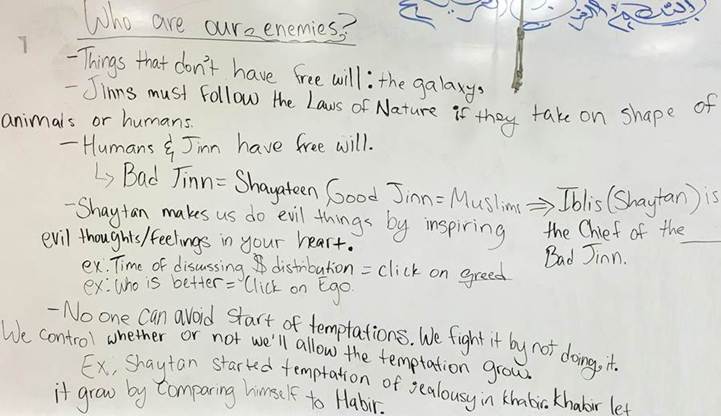
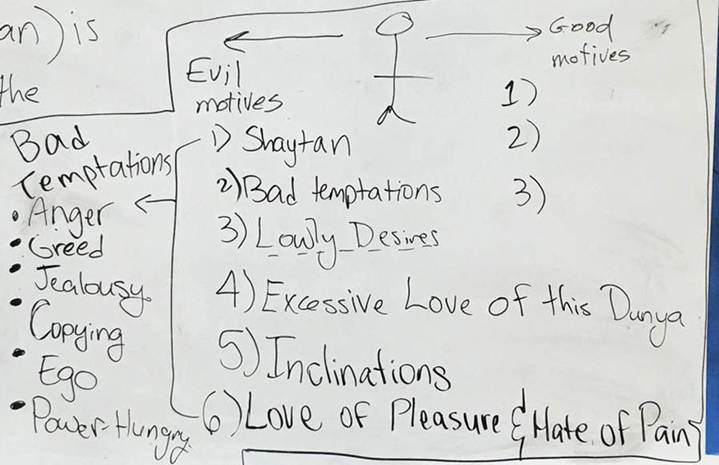
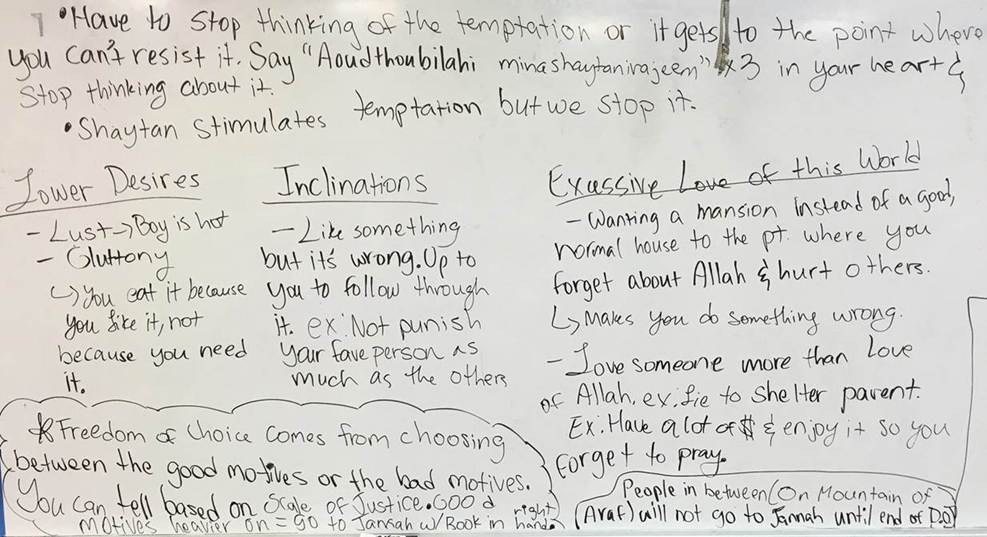



Lesson [2]: The Knowledge of Allah ﷻ.


Click
here to watch the video recording of the class
OR
Click here to listen to the class.
OR
Click here to read the written
notes.
Homework:
Listen to the audio recording or watch the video
recording of the class, read the notes, and answer the following questions
thoroughly. Short answers are not accepted. You must email me the homework via
email hw@zeiny.net
Allah ﷻ knows everything that happen and would
happen in the future. Allah ﷻ guides whom so
ever he wills and misguides whom so ever he wills. Allah ﷻ seals the
ears of the bad guys so that they can’t hear the truth. Allah ﷻ blinds their
eyes so that they can’t see the truth. Allah ﷻ locked their hearts from understanding the
truth. Allah ﷻ already wrote everything that will happen in a book.
1.
What
is the ridiculous understanding of these statements?
2.
How can I know your answer ahead of time without forcing you to
follow my answer? Explain using the metaphor of prediction and example of the
cows who fly on their own.
3.
What is the opposite of the statement "Allah ﷻ
guides whom so ever he wants and misguides whomsoever he wants”? Prove that
this statement is true by proving that the opposite is impossible.
4.
Can
good exist without evil? Explain why?
5.
Can
good deeds exist without bad deeds? Explain why?
6.
Why
doesn’t the Shytan repent knowing that he will be burning in hell without end?
7.
Is
it possible for us to have a free will if bad deeds don’t exist?
8.
If
it is already written, then how come we have freedom of choice?
9.
He
already wrote our deeds. We have no choice. How come he is punishing the wrong
doers?
10.
Allah
ﷻ doesn’t want to guide me. It is not my fault. How do you
reply to that ridiculous argument?
11.
Why
did Allah ﷻ create evil people knowing that they will end up in hell?
12.
Explain
how Allah ﷻ is helping out the believers for choosing to believe in him and
submit to him. Give examples.
13.
Explain
how Allah ﷻ would misguide the people who chose evil.
14.
The names of Allah ﷻ (الأول)
means the first without start and the twin name of
this name is (الآخر)
which means the last without end. Explain this in terms of time. Use the
example of the story board.
15.
Explain how Allah ﷻ controls the time and he does not change
or age with time.
16.
Allah ﷻ made the time able to age everything else. Explain the previous
statement and use that to explain how Allah ﷻ contains time and everything else is
contained in time.
17.
Mention the story of Omer RA with the guy who was arguing that he
stole because it is the decree of Allah ﷻ and it is not his fault. What was the
reply of Omer RA?
18.
Is our will superior to Allah ﷻ's will? Mention the relevant Ayat from
Surat [Takweer, 81:28-29] and
from Surat [Al-Insan,
76:29-30]. Explain them.
19.
The knowledge of Allah ﷻ is surrounding
knowledge. What does that mean?
20.
How many books Allah ﷻ has? What are they
and what is the difference between them?
21.
Why did Allah ﷻ prescribed 50 prayers initially knowing
that it would be five at the end?
22.
How do you increase your wealth and life?
23.
What is the story of the person who used to say “O Allah ﷻ I
disobeyed you so many times and you never punished me”? Explain
24.
What was the story of the bird who stole meat?
25.
Believers are always thinking about their deeds and link them to
the events happening. How about the nonbelievers? Why did the Prophet ﷺ
said that they are like camels?
26.
Describe the Knowledge of Allah ﷻ using the metaphor of oceans and trees?
Use [Cave, 18:109] and [Loqman, 31:27]
Board Notes:







Lesson [3]: The Name of Allah ﷻ Al-Wakeel (The One we depend on) Part 1


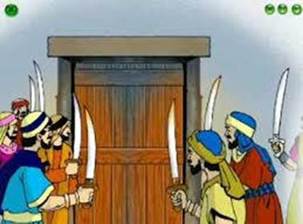
Click
here to watch the video recording of the class.
Or
Click
here to listen to the audio recording of the class.
Or
Click
Here to Read the Written Notes for Al-Wakil Part I.
Homework:
Listen to the audio recording or watch the video
recording of the class, read the notes, and answer the following questions
thoroughly. Short answers are not accepted. You must email me the homework via
email hw@zeiny.net
1.
What is the meaning of the name Al-Wakeel?
2.
Explain the word "Tawfik توفيق".
Who does control Tawfik?
3.
Since we cannot expect Allah ﷻ to vacuum your carpet and wash your
dishes, then how do you depend on Allah ﷻ in both of these
tasks? What could go wrong?
4.
How do you reply to the one who says "If I do my part, then
there is nothing left for Allah ﷻ to do".
5.
Depending on Allah ﷻ is the job of the heart. Doing your part
is the job of the brain and muscles. Explain this sentence with examples.
6.
If a person studies for a test, why does he need to depend on
Allah ﷻ? What could go wrong?
7.
In the case of a Muslim student who did not study because he is
claiming that he “depends” on Allah ﷻ and non-Muslim student who studied who
doesn’t know Allah ﷻ. Who would pass the test and why?
8.
Is Tawfik granted only for believers or for anyone? Explain why?
9.
Is Tawfik granted only for the ones who depend on Allah ﷻ or
for anyone? Explain why?
10.
Explain the probability of failure?
11.
Mention the story of tying the camel and how did Prophet Mohamed ﷺ
comment on this?
12.
How do you reply to the ones who say "I tied the camel, what
is left for Allah ﷻ to do"?
13.
How do I depend on Allah ﷻ to heal my
sicknesses? What are the two extremes regarding this issue? Explain how is
Islam in the middle?
14.
What did Omar Ibn Al-khatab say
regarding the people who stayed in the Masjid claiming that they depend on
Allah ﷻ to bring them sustenance? Explain?
15.
The engineer who built Titanic said "Even God cannot sink
it". What happened and how did Allah ﷻ make him fail?
16.
Explain how was the arrogance of the captain in terms of speed and
life boat.
17.
Why the evil Arab Lord couldn’t kill the Prophet ﷺ
before the event of Hijrah? What did they do to make killing of the
Prophet ﷺ possible?
18.
Explain in detail the plan of immigration of the Prophet ﷺ
from Macca to Medina.
a.
Direction of travel.
b.
Asmara flock of sheep.
c.
Food and water supplies.
d.
Spying.
e.
Sleep in bed.
f.
Returning the trusted things.
g.
Hiding for the first few days.
h.
Routing.
i.
Who was the companion of the Prophet ﷺ during his immigration?
j.
Who was the woman of the two belts? How did she get this name?
What was her relationship to the Prophet ﷺ and Abo Bakr?
What was her role during the Prophet ﷺ migration to Madina?
k.
Who was the person who was spying on the Arab Lords? How? What was
his relationship to Abo Baker Al-Sidiq?
19.
The plan of the Prophet ﷺ failed three time? Explain the three times
and how did Allah ﷻ save him?
20.
About why Alawsat saved the Prophet ﷺ three times:
a.
What is the meaning of the concept of being desperate? How is it
related to this subject?
b.
What was the first miracle that Allah ﷻ saved his Prophet ﷺ with? What
happened to the assassins that were surrounding the house of the Prophet ﷺ?
What did the Prophet ﷺ do to them before he leaves? Why?
c.
What was the second miracle that Allah ﷻ saved his Prophet ﷺ with?
d.
Who was the guy that was trying to capture the Prophet ﷺ
for a prize? What was his name? And what was the prize? The Prophet ﷺ
promised him something. What was it? Why did the Prophet ﷺ promise him?
When did this promise become true, i.e. after what battle?
21.
Failure to plan is a plan to fail. Explain this statement and how
is it related to the subject of how to depend on Allah ﷻ?
Board Notes:
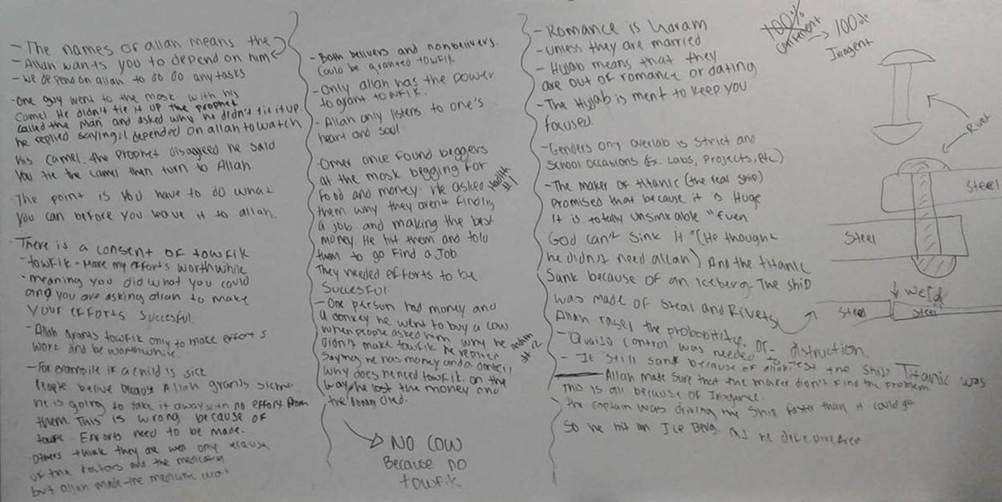




Board Pictures from prior years:
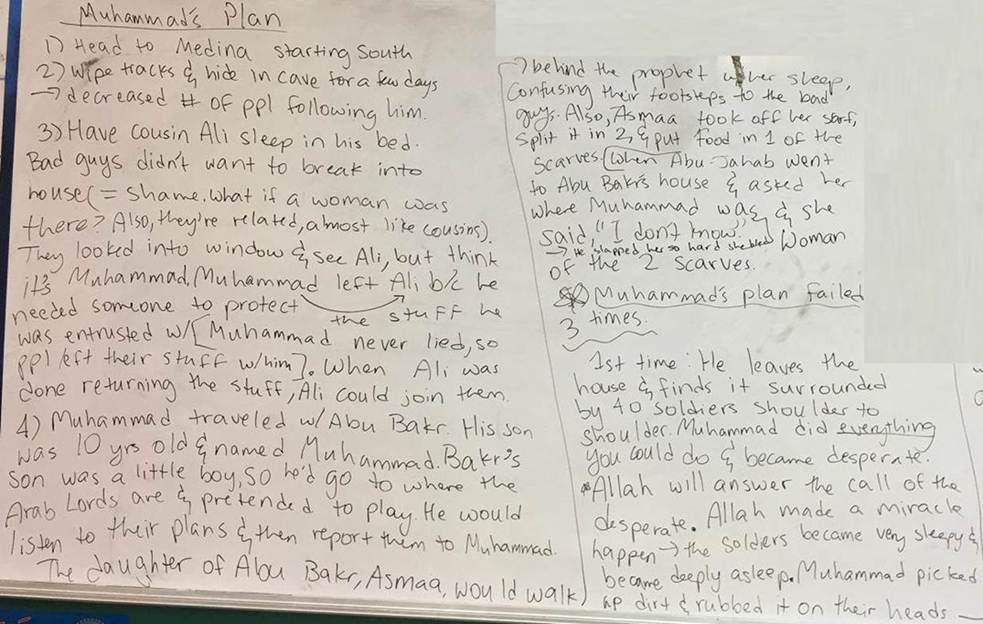

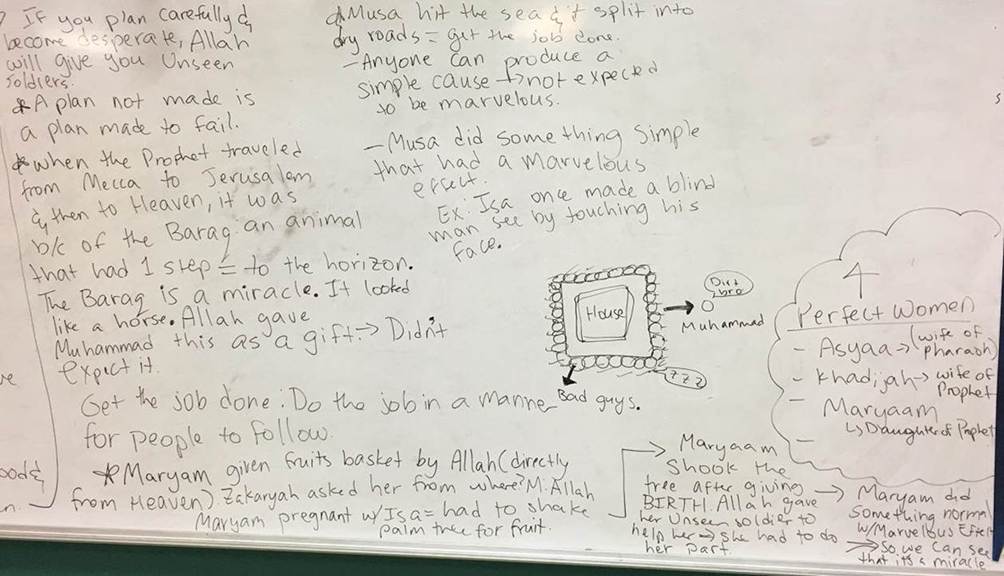
Lesson [4]: The Name of Allah ﷻ Al-Wakeel (The One we depend on) Part II

Click here to watch the video recording of
the class.
OR
Click
here to listen to the audio recording of the class.
Or
Click
Here to Read the Written Notes for Al-Wakil Part II.
Homework:
Listen to the audio recording or watch the video
recording of the class, read the notes, and answer the following questions
thoroughly. Short answers are not accepted. You must email me the homework via
email hw@zeiny.net
1. Explain the law of “be
and its”? Hint: (36:82)
2. Did Allah ﷻ create and has been governing the universe using the
laws of “be and its”? Explain in details.
3. For anything to exist in
reality, it had to exist in the knowledge of Allah ﷻ first. Why?
4. If Allah ﷻ will excuse anyone from using the laws of nature, who
would be exempted?
5. Regarding the unseen soldiers
sent from Allah ﷻ to save you.
a. Mention the three times
the Prophet ﷺ became desperate and what were the unseen soldiers sent from
Allah ﷻ to save him?
b. When does Allah ﷻ help you with unseen soldiers? Are they available for
anyone? How do you qualify for them? (Hint Faith | desperate | this link).
6. About the incident of
Isra and Mirag:
a. What was the destination
of each trip?
b. What were the means of
transportation of each trip?
c. Why did not Allah ﷻ
take his Prophet ﷺ straight from Makkah to his final
destination? Why did he stop by in the middle at the Aqsa Masjid?
d. What are the three
sacred Masjids in Islam? List them in the order of importance.
7. In the comparison
between the immigration of the Prophet ﷺ Mohamed ﷺ to Madina and his Isra’a trip:
a. What was the difference
between the Isra’a and the Higra?
b. Which trip was
dangerous?
c. In which trip the
Prophet ﷺ was in desperate need of miraculous
transportation? Why?
d. Why did Allah ﷻ
make the Prophet ﷺ follow the laws of nature in his
immigration to Madina but in the Isra’a he gave him a
miraculous mean of transportation?
e. How is this related to
the topic of depending on Allah ﷻ?
8. About the fruit basket Allah ﷻ sent several times
from Jannah to Mariam in her worship place:
a. What was so special
about the fruit basket?
b. What did Allah ﷻ ask Mariam to do after she gave birth to Prophet ﷺ
Isa?
c. In comparison to her
condition after labor, which condition she was in more need of food?
d. Why did Allah ﷻ
ask Mariam to use the means available to her after labor to get food? Why not a
fruit basket gift from Jannah?
e. How many people are
needed to shake a palm tree hard enough for the dates to fall?
f. How is this related to
the topic of depending on Allah ﷻ?
9. Regarding the escape of
Prophet Musa and the children of Israel from Egypt:
a. What happened when the
children of Israel while escaping?
b. What was the response of
Prophet Musa to their cry?
c. What did Allah ﷻ
ask Prophet Musa to do? What tool did he use to do the task?
d. Why did Allah ﷻ require him to use this tool to part the sea? Why not
part the sea right away?
e. How is this related to
the topic of depending on Allah ﷻ?
10. Does depending on Allah ﷻ (Tawakul) related to the future or the past? When do we say
“In Sha’a Allah ﷻ” and when do we say “Masha’a
Allah ﷻ”?
11. For
the following list of benefits gained from Tawakul, explain each one in detail. You may use your own examples.
a. In the incident of
Prophet Mohamed ﷺ traveling using his donkey and there was
a young youth setting behind him. What did the Prophet ﷺ advised him
regarding things that would come to him and things that wouldn’t come to him?
b. Dependence on Allah ﷻ makes a person fearless and worriless. How?
c. Spiritual Tawakul can’t be on other than Allah ﷻ?
Explain.
d. A person missing the bus
that got in an accident. Who delayed that person?
e. Mention the story of the
guy who was laid off from his job. Was he happy and what happened to him?
f. Sometimes we ask Allah ﷻ
for things that we desire so much but they are bad for us. Would Allah ﷻ
give them to us? Comment.
12. When a calamity happens and we become sad.
a. Are we allowed to be
sad? Can we stop ourselves from being sad?
b. How to handle our
sadness the right way and the wrong way? Give an example that explains your
answer.
13. When something good happens and we become
happy.
a. Are we allowed to be
happy? Can we stop ourselves from being happy?
b. How to handle our
happiness the right way and the wrong way? Give an example that explains your
answer.
14. When we worry about something and we become
worried.
a. Are we allowed to be
worried? Can we stop ourselves from being worried?
b. How to handle our worry
the right way and the wrong way? Give an example that explains your answer.
Lesson [5]: Sweet and Sour Mercy


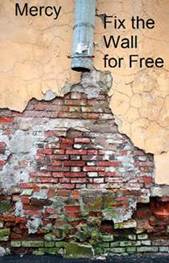
Click
here to watch the video recording of the class.
OR
Click here to listen to the audio
recording of the class.
OR
Click here to read the written
notes.
Homework:
Listen to the audio recording or watch the video
recording of the class, read the notes, and answer the following questions
thoroughly. Short answers are not accepted. You must email me the homework via
email hw@zeiny.net
1.
In your own words, mention the story of Prophet Moses (Mosa and
the Righteous slave of Allah ﷻ. Hint use Quran 18:60-82
2.
What are the two types of knowledge? Explain.
3.
What are the two types of mercy?
4.
In the first event, which was damaging the boat, who was the one
who made the decision? Which type is this mercy?
5.
In the second event, which was killing the boy, who was the one
who made the decision? Which type is this mercy?
6.
In the third event, which was fixing the wall of a ruined house,
who was the one who made the decision? Which type is this mercy?
7.
Compare the type of mercy that comes directly from Allah with the
type of mercy that comes from his creation.
8.
Explain how is that you may pray for something which is bad for
you or hate something which is good for you. Give a few examples.
9.
Mention a few lessons that you learned from the story.
10.
When something bad happens to you, are you allowed to feel sad and
cry? You should change your sadness to what?
11.
When something good happens to you, are you allowed to feel joy
and happiness? You should change your Happiness to what?
12.
When you are worried, you should change your worry to what?
Board Notes:

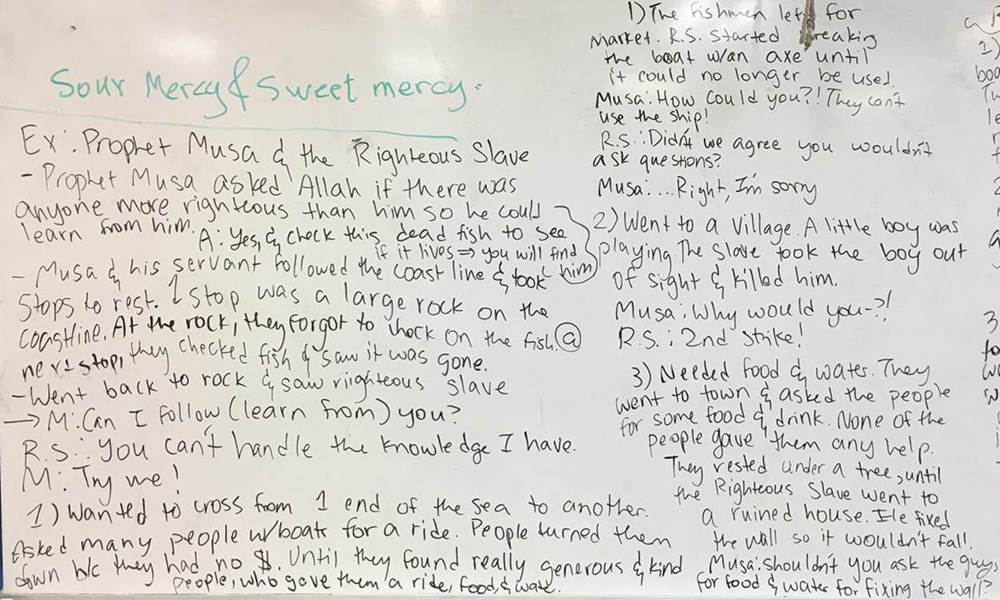

Lesson [6]: Believe in the Unseen World

Click
here to watch the video recording of the class
OR
Click
here to listen to the audio recording of the class.
OR
Homework:
Listen to the audio recording or watch the video
recording of the class, read the notes, and answer the following questions
thoroughly. Short answers are not accepted. You must email me the homework via
email hw@zeiny.net
Possible life in higher dimensions
1. Use the metaphor of the
people who live in 2D to show that we are being seen and accessed from higher
dimensions. Can we see them? Can they see all of us? What would they see if you
place your finger in their 2D plane?

2. Do we see everything in
existence? Mention few examples of things that exit but we don’t see them.
Mention the relevant joke about the smart kid and his atheist teacher.
Possible life in higher frequencies:
1. What is the frequency
our bodies and the solid objects around us?
2. Comparing the ones with
higher frequency with the ones they have lower frequency. Which one is more
powerful and why?
3. From what angels were
created and from what Jinn were created?
4. It is believed that the
nature of Jinn is a body of energy. How can they make us see them? How can the
angels make us see them as well?
5. What is the theory of
relativity e=mc2 and how is it related to the story of the
throne of the Queen of Sheba?
6. Which creation would
have more frequency, the Jinn or the angels?
7. Is it possible that
higher frequencies creations occupy the same space we occupy as the same time?
Is it possible that they can reach our entire bodies?
8. If the Jinn make us to
see them by altering their frequency to the visible spectrum or convert their
energy into mass. What laws are they bound to, our laws of nature or their
laws?
About the importance of believing of the world of unseen
1. What are the two worlds
that we have? To which one Allah ﷻ, his angels and life after? What
world that we live in now? To which world belong the things that we can feel
using any of the five senses?
2. Mention the Ayah where
Allah ﷻ praised the ones who believe in the Unseen. For what reason
Allah ﷻ praise them?
3. From an Islamic
perspective, what is the difference between to know and to believe? Use the
metaphor of the furnace.
About the relationship between death and sleep
1. How would death open the
door to the unseen world? Mention the Ayah in the Quran that explains this.
2. What are the Ayat and
Hadith that mention the relationship between death and sleep?
3. Is lying more difficult
or saying the truth?
4. Lying takes a lot of
brain work and good memory. Mention the joke of the teacher who quizzed the
four students about the flat tire.
5. When the angels ask you
the three questions right after death, how come you can't lie and give the
correct answers?
6. Compare the punishment
in the grave with nightmares.
7. Compare the joy in the
grave with sweet dreams.
8. If you want to torture
someone in this life, which part (Body or Soul) you can apply the torture non?
How about in the grave? How about in Hell fire?
9. Explain the metaphor of
the body and soul as compared to the car and the driver? Explain when is the
soul going to be alone and when is the soul is coupled with the body?
10. How can the soul control
the body? What is the interface between the body and the sould?
11. During the time we were
in our mother’s womb the universe to us was that tight place. After birth the
universe became very huge. How about the relationship between the seen universe
and the unseen universe?
Board Notes:
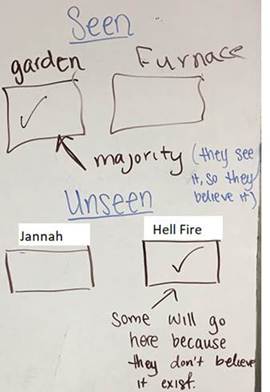


Lesson [7]: Pillars of Faith - Believe in Allah ﷻ.
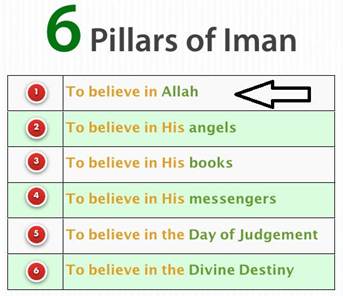
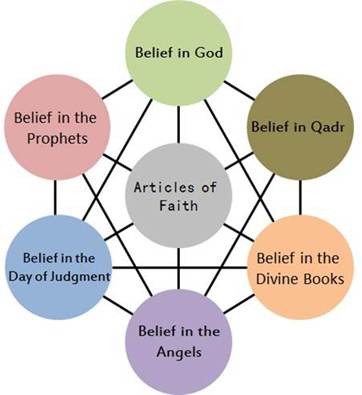


Click
here to watch the video recording of the class
OR
Click
here to listen to the audio recording of the class.
OR
Homework:
Listen to the audio recording or watch the video
recording of the class, read the notes, and answer the following questions
thoroughly. Short answers are not accepted. You must email me the homework via
email hw@zeiny.net
Theology:
1. Mention the Hadith where
Angel Gibriel came in a form of a man and asked him questions? Mention only the
part related to the pillar of faith.
2. Allah ﷻ is One
(Wahid) and He is Unit (Ahad). What is the difference between these two
attributes of Allah ﷻ?
3. Which Surah known to be
one third of the Quran? Why?
4. What did Allah ﷻ
provide us with to see him with our brains?
Why having One God is mercy to us?
5. Many Gods lead to what according to Surat Al-Anbya’a (21:22)
6. Many Gods lead to what according to Surat Al-Moemnon (23:91)
7. Explain the disasters that would result from
having many Gods? which God we and the entire existence are required to submit
to God A or God B or God C?
8. The ultimate purpose of all creation is to
submit to which God?
9. What is the Name used in the Arabic Bible to
refer to God?
Various Arguments
10. Logical argument about the existence of God.
a.
How many of the people on earth deny the existence of God?
b.
What is the meaning of the statement “God did not create man, man
created God”?
c.
What is the watch maker argument?
d.
Explain the metaphor of the ship that leaves India and reach New
York. How is that metaphor related to Allah ﷻ, the sun and the moon?
e.
Why must we have a big boss?
f.
When we see beautiful painting of nature, how does this make us
feel about the artist who drew the picture and about Allah ﷻ?
11. Denying the existence of Allah ﷻ, the creator, seems unreasonable. What
caused the atheists to don’t want to admit the existence of the Creator?
a.
Religions are wrong and don’t make sense. So, ……...
b.
Atheist who rejected religions are essentially have rejected
Christianity and then assuming that ………...
c.
Explain how is the Christian religion was used as a slave mind
management system? What was the response of the smart slaves?
d.
Explain how people deny the existence of God when they see
tragedies. Example the holocaust. What would be their arguments?
e.
Man (victims) says where are you God? God replies …………..
f.
How do we reply to the ones who said “Shall we feed the ones whom
Allah ﷻ should have fed” Yasin (36:47)?
g.
Tell the joke about selling parts of the paradise by the church in
the old days.
12. Theory of evolution.
a.
Are Muslim against the entire theory of evolution? What is the
part that we disagree with?
b.
Why the racist people draw monkeys to describe black people? How
does this relate to the theory of evolution?
c.
Why theory of evolution (Darwin’s theory) would justify the
killing of the “less developed humans.”
d.
What is the Arian race? Who promoted its superiority over all
other races? Explain the disaster that resulted from that.
13.
People attempt to ignore the presence of God. What is the name of the people
who just ignore the presence of Allah ﷻ? Summarize their beliefs.
Pictures of the Board:


Lesson [8]: Pillars of Faith - Believe in Angels.
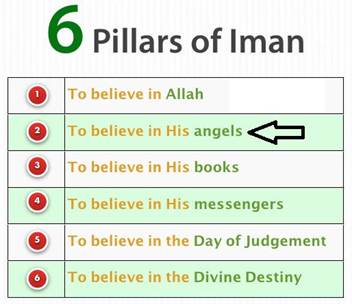

Click
here to watch the video recording of the class
OR
Click
here to listen to the audio recording of the class.
OR
Homework:
Listen to the audio recording or watch the video
recording of the class, read the notes, and answer the following questions
thoroughly. Short answers are not accepted. You must email me the homework via
email hw@zeiny.net
1.
Why is it not appropriate to Allah ﷻ to do all tasks by himself? Give examples of tasks that
it is not appropriate for Him to do.
2.
What is the Royal way of getting something done?
3.
Angels could be a body of energy made of what? Can they take the
form of humans? Did Gibril came to the Prophet ﷺ in
a form of a man? What did the man look like?
4.
In the Hadith of Pillars of faith, the Hadith that we are studying
now, who was talking to the Prophet ﷺ?
5.
Angels don’t ever disobey Allah ﷻ? Why?
6.
Do angels go to hell or heaven? Why?
7.
Mention the names and the role of 11 angels. of different angels
doing different tasks.
8.
Complete: The wandering angels. Don’t enter a house that has a
………. Don’t attend a lecture or a talk where a woman is ………. or a man who is not
………...
9.
What is the job of the Guardian Angels? Do they do their job with
both good and bad guys or only good guys?
10.
Regarding the angels on the right and left, who is in charge of
the other? Why?
11.
Who are the two Angels that were converted to humans and sent to
earth? Why did Allah ﷻ do that to them? What happened at the end?
12.
Who taught black magic? Is it Halal or Haram? The sorcerer Kafir?
Why?
13.
How does the sorcerer please the Jinn? How is this communication
would make of the condition of the sorcerer?
This video is about a
sorcerer who was trying to invoke Jinn. Obtained from “The Kingdom of Solomon
movie.”
Pictures from the Board:




Additional Material

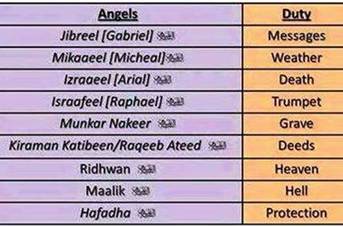
https://en.wikipedia.org/wiki/Angels_in_Islam
Muslims believe that
angels, or malaikah,
were created before humans with the purpose of following the orders of Allah ﷻ and communicating with humans. Muslims believe that angels,
like all other creatures, were created by God. In Islamic belief, angels
communicate messages from Allah ﷻ to humanity.
The
Messenger has believed in what was revealed to him from his Lord, and [so have]
the believers. All of them have believed in Allah ﷻ and His angels and
His books and His messengers, [saying], ‘We make no distinctions between any of
His messengers.’ And they say, ‘We hear and obey. [We seek] your forgiveness,
our Lord, and to You is the [final] destination.’ (Qur’an 2:285)
Muslims also believe that angels are with them
at all times. They have two angels, which sit on either shoulder and are known
as Al-Kiram and Al-Katibun.
One of the angels records the good things the person has done and the other
records the bad things the person has done. Allah ﷻ will judge each person based on these
deeds, deciding whether they are worth of Paradise (Jannah or Hell
(Jahannam).
Lesson [9]: Pillars of Faith - Believe in the Books, the Prophets the Day of Judgment and the Qadar
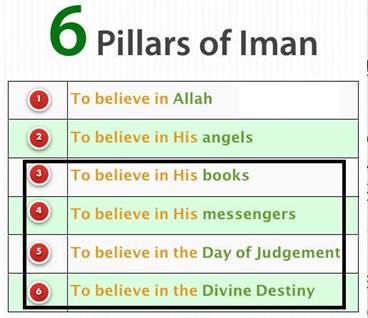

Click
here to watch the video recording of the class
OR
Click here to listen to the audio
recording of the class.
OR
(1)
Click
here to read the notes about belief in the books and the Prophets.
(2)
Click
here to read the notes about belief in the Day of Judgment.
(3)
Click here to read the notes about
belief in Qadar.
Homework:
Listen to the audio recording or watch the video
recording of the class, read the notes, and answer the following questions
thoroughly. Short answers are not accepted. You must email me the homework via
email hw@zeiny.net
Belief in Books and Prophets:
1. How many Prophets and
how many messengers were sent by Allah ﷻ?
2. What is the difference
between a Prophet and Messenger? Explain how the messenger is sent to non-believers
but the Prophet is sent to believers. Explain in detail.
3. Since no more Prophets
will be sent, Allah ﷻ substituted the Prophet with what?
Explain how and why?
4. Did each Prophet teach
the same faith about Allah ﷻ? Why? Explain.
5. Each Messenger came with
different Sharia laws. Give three examples of differences between the Sharia
laws of the Messengers.
6. What are the similar
things between Sharia laws for each messenger?
7. Explain why the three
heavenly “religions” teach that the only acceptable religion and way of life is
their version of religion. What would happen if they didn’t teach that?
8. Who are the people of
the book? Explain do we consider them the best Non-Muslims.
9. Because Prophets are
teachers, what do they need to teach from?
10. What are the benefits of
having books (scriptures) while the Prophets are alive? What is the use of
these books after the Prophets die?
11. All books now have been
changed due to translations and manipulations except the Quran. Why did Allah ﷻ
declare that he will be guard the Quran from being lost, manipulate it or
changed until the Day of Judgment?
12. Explain the telephone
game and how it affected the authenticity of previous scriptures?
Belief in the Day of Judgment:
13. If there is no day of
judgment, then good guys and bad guys end up equal. Explain how they are the
same. Is it fair?
14. If there is no day of
judgment, then it will make no sense for us to fight our temptations and lower
desires. Explain why.
15. What would you say about
a judge who makes good guys equal to bad guys? How this is related to belief in
the Day of Judgment?
16. What are the three
spiritual motivations that will motivate someone wake up very early in the
morning and go to Fajr?
17. How many rounds we have?
The true winner is the one who wins which one of them? Explain.
18. Prove logically that the
society that has faith gives more charity than the society that doesn’t have
faith.
19. Briefly describe what
will happen in the Day of Judgement?
Belief in the Qadar (fate):
20. Who has been writing our
books when we were children? What happens as you grow older?
21. Allah ﷻ
knows about what we will be written in our books. How do you reconcile
this with the fact that we are writing our own books and that we have the
freedom to write them?
22. What are the decisions
that have been made by Allah ﷻ and we have no choice over? Can we
question Allah ﷻ, reject or change any of these decisions?
23. What is the story of the
parents who accidently left their children to die in the garage due to carbon
dioxide coming out of their running car? What did they do after the accident to
be able to handle with the harsh reality?
24. In the grief management
classes, what is the first thing they teach? How is that related to the sixth
pillar of faith in Islam?
25. Why bad things may
happen to good people? Isn’t it cruel to make good people suffer? Relate to the
story of Musa (AS) and the righteous slave, ruining the boat and killing the
boy.
26. Some people are born
with all the fame and wealth they need, while others are deprived? Are we born
to equal rights? Are we born to equal opportunities? Who controls the
distribution of wealth?
27. If our share of wealth,
health and whatnot, were pre- assigned. Then what is our role in obtaining
them? Explain and mention the story of the camel of Ali Ibn Abi Talib (RAA)



Lesson [10]: Pillars of Islam – (1) After Faith, There is No Deity Except Allah ﷻ and Mohamed ﷺ is His Messenger Must be Established First Before any Thing else. (2) Establishing prayers.

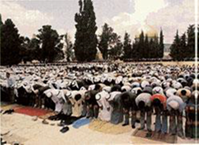
Click
here to watch the video recording of the class
OR
Click
here to listen to the audio recording of the class
OR
(1) Click
here for the written notes about Shihada must be
established first.
(2) Click here for the written notes
about establishing the five times prayers.
(Optional) Click
here for extra written notes about Shihada must be
established first.
Homework:
Listen to the audio recording or watch the video
recording of the class, read the notes, and answer the following questions
thoroughly. Short answers are not accepted. You must email me the homework.
1. What is the difference between the 6 pillars of faith and the 5 pillars of worship? Which one must come first?
2. Briefly mention the black stone incident and how it is related to the subject.
3. Prophet Mohamed ﷺ was the most loved and respected by his people. He was Al-Amin (the most trust worth) and then he became the most despised and the most liar who lies about God himself. Why? What happened?
4. Why did the Arab lords reject La Ilaha Ila Allah ﷻ and Mohamed ﷺ is Rasol Allah?
5. How many years the Prophet ﷺ lived? How many years was he a Prophet? How many years in Makkah? How many years in Al-Madina? What was the purpose of the Makkah era and what was the purpose of Al-Madina period?
6. What is the difference between the Ayat of the Quran that was revealed in Makkah and the ones that was revealed in Al-Madina?
7. Using the metaphor of building a foundation, which one comes first removal of the dirt or establishment of foundation? How is this related to the topic?
8. Did La Ilaha Ila Allah ﷻ come first or the moral values, or the rules of Halal and Haram? What did Aisha RA say about obeying the rules of dos and don'ts? Did these rules come first or last? Why?
9. How many easier ways the Prophet ﷺ could have used to establish Islam? Summarize all of them. Explain how the intended objective of each way was achieved after the establishment of “La Ilaha Ila Allah ﷻ. Mohamed ﷺ Rasool Allah”.
10. What is wrong with moral values when they are based on materialism? Give the example of gambling in Lake Tahoe and Indiana and throwing food in the ocean.
About Establishing the Prayers Five Times a Day
11. What are the tests of Islam (tests of submission)? Why are we being given these tests? Explain how Ramadan is a test to us.
12. Using the metaphor of the father who sent his son to study in a faraway college, relate to the following:
a. Concept of Salah? What is the phone number you need to call on Allah ﷻ?
b. Concept of laws of nature? Who to thank for the check? How is that relevant to the law of nature?
c. Evolution? hint I have no father or mother.
13. Describe the remembrance of Allah ﷻ curve with time to show the relationship between prayers and the remembrance of Allah ﷻ.
14. Focusing in the prayers is a problem. In what case it would be forgiven and in what case it will not?
15. What is the name of the Shytan whose job is to make people unable to focus during prayer?
16. Mention the joke about the guy who insisted that the Imam prayed Zuhur two Raka instead four Raka.
Board Notes:
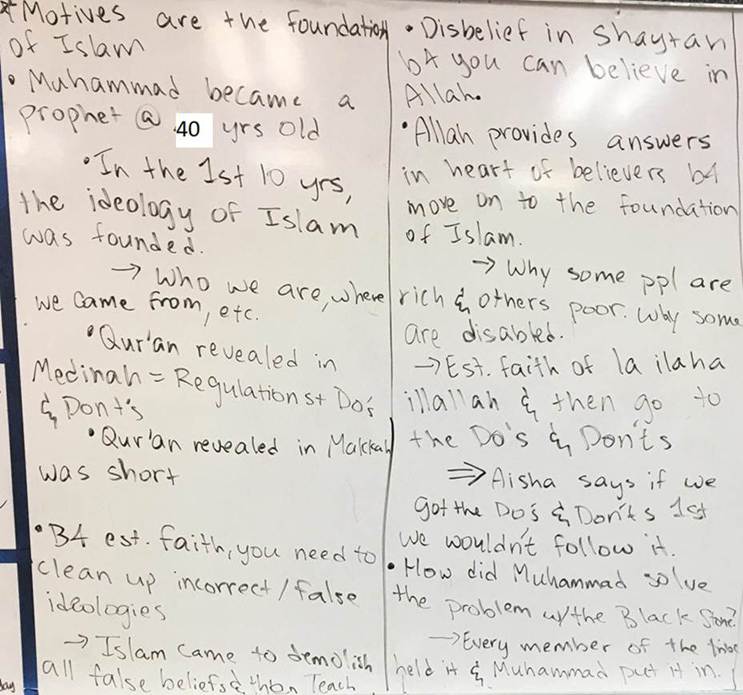
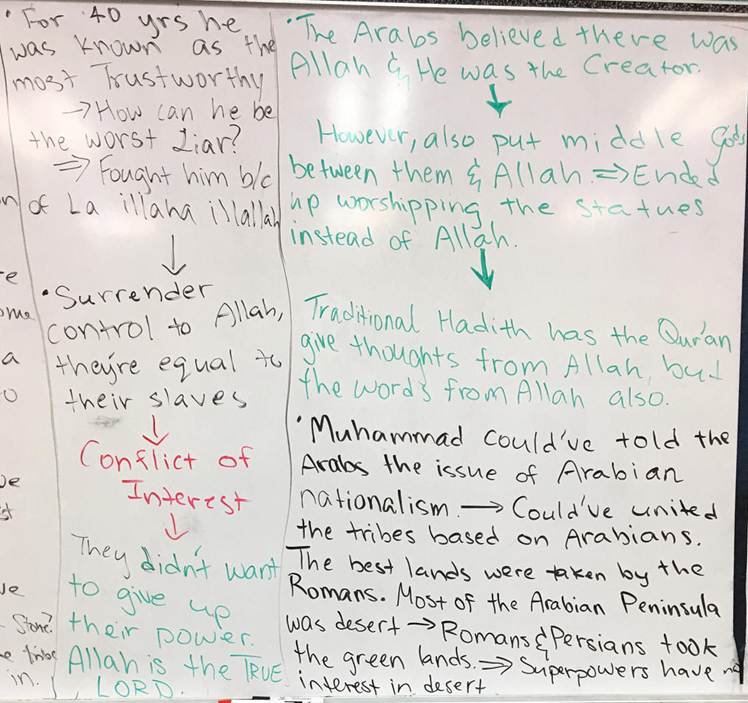
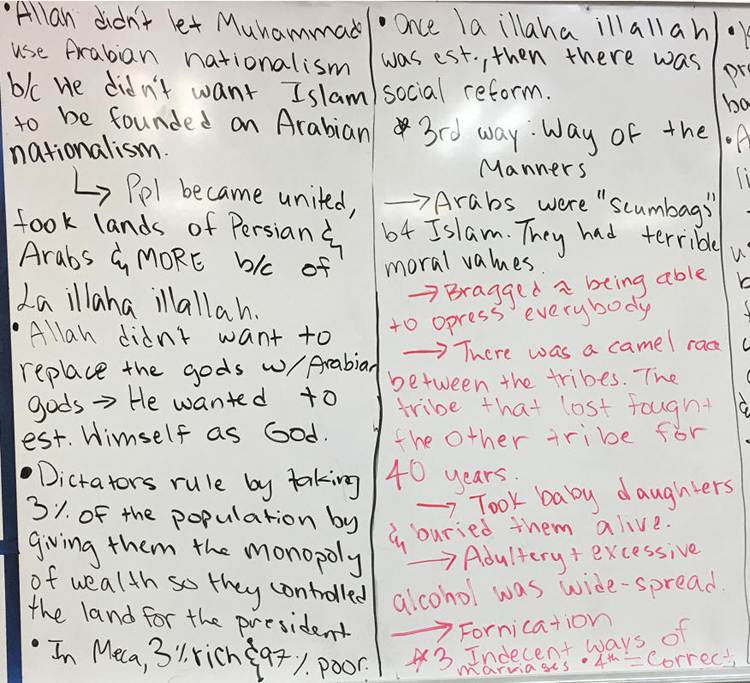

Lesson [11]: Pillars of Islam – (3) Zakah, (4) Fasting and (5) Haj.




Click
here to watch the video recording of the class
OR
Click
here to listen to the audio recording of the class.
OR
Click here to read the written
notes of the class.
Homework:
Listen to the audio recording or watch the video
recording of the class, read the notes, and answer the following questions
thoroughly. Short answers are not accepted. You must email me the homework.
1. What do we mean by
spiritual muscles? How is this related to Ramadan?
2. Why Ramadan is a
training camp? Mention four of the most important benefits of fasting Ramadan
(the ones mentioned in class).
3. What is the Hadith Qudsy and how is it different than regular Hadith or
Quran?
4. In the Hadith Qudsy, Allah ﷻ said that all the
worship of the children of Adam to him except fasting it is to me and I am the
one who would reward for it. Explain the meaning of this Hadith.
5. If people convert their
cash money into other forms (like diamond for example) for the purpose of
evading Zakah. Would they be exempted from this Zahah or
what?
6. Mention the rules
of Zahat of cash, gold and other valuable things.
7. Mention the rule
of Zakah for farming for both cases of irrigation (by rain or by
effort).
8. Mention the rules of
the Zahah for oil and other mines.
9. Regarding
paying Zakah on jewelry, boats, cars and homes. In what situation do
we have to pay Zakah on them and in what situation we don’t have to
pay Zakah on them.
10.If you loan someone money, do you have to
pay Zakah on the loan?
11.What are the lifelong loans, such as
mortgage, is it allowed to deduct the loan amount from the Zakatable money?
12.In Surat Yasin 36:47,
Allah ﷻ mentioned that bad people argue that
they shouldn’t feed the poor and needy because if Allah ﷻ
wants them to be fed, then he should feed them himself. How do you reply
to this argument?
13.Does Allah ﷻ provide the share of wealth of the poor
people directly to them? Explain.
14.About the Hadith of the Prophet Mohamed ﷺ saying
that I swear in the Name of Allah ﷻ that the charity
doesn’t decrease the wealth. Explain how and use the example of someone having
$1000 and donated $200 to explain how this $200 charity did not decrease his
wealth when compared to someone that has $1000 and didn’t donate anything.
Explain how the money left after donation ($800) is worth more than the
original $1000.
15.How do you reply to someone who says that the
Haj trip is dangerous because it is so crowded? Hint. Fill the blanks. People
travel and go to crowded places for .........................................
Muslims travel to Haj for .........................
16.Click here to watch
the video of Malcom X and explain how Haj changed his views of racism?
17.Click here to watch
the video about the Haj. Briefly summarize the Haj rituals.
18.Does everyone required to do Haj? Who are the
exempted ones, if any?
19.How do you reply to someone who says that how
come that Allah ﷻ would let the Masjids, his houses on
earth, burn and would let the people doing Haj to his house die?
Lesson [12]: Reply to "Quran Says: Kill them where ever you find them". Does the Quran Really Sanction Violence Against 'Unbelievers'?

Defending Islam against Stereotypes.
Click
here to watch the video recording of the class
OR Click
here to listen to the audio recording of the class.
(Optional)
See Dr. Yasir Qadhi lecture about modern Jihadist.
(Optional)
See Dr. Yasir Qadhi lecture about the Reality of ISIS: Modern Muslim
Fundamentalism.
(Optional)
See Dr. Yasir Qadhi lecture about Muslims Condemn Terrorism.
(Optional)
See Dr. Yasir Qadhi lecture about American Foreign Policy and the Rise of ISIS.
(Optional) See Reply of the Muslim Scholars to
the arguments raised by ISIS: Letter
in Arabic, Letter
in English and Letter in
Other Languages.
Homework:
Listen to the audio recording or watch the video
recording of the class, read the notes, and answer the following questions
thoroughly. Short answers are not accepted. Must email me the homework.
1. Regarding the expressions “infidels” and “holy war”. Do they exist in
Islam? What were the unbelievers called in . See Surat Al-Kafiron [109].
2. See Surat Al-Kafiron [109] gives a message of tolerance. How?
Explain?
3. Write Ayat Quran (2:190 to 192) that
include the statement "Kill them where ever you find them". Explain
the Ayat and then explain the deception of those who quoted this part of Ayah
to stereotype Islam.
4. What were the
instructions given by the Prophet ﷺ to the armies before they left to battle?
5. Quran (5:5) Proves
that Islam is very tolerant with other religions. Explain in details.
6. If Muslim men can marry
non-Muslim women, then why Muslim women can't marry non-Muslim men?
7. Explain the rule in (Quran 60:8-9).
Show the tolerance in these Ayat.
8. Why 911 is considered to
be an evil act in Islam? Explain how the name of Islam was hijacked in 911?
9. Do radicals kill
non-Muslims only? Explain. Why do they kill Muslims?
10.Vigilantism is prohibited in Islam. Explain
why and relate to 911.
11.We and the people of the book
worship the same God Quran [29:46]. How do we reach to God and how do Christians
reach to God?
12.How do we Muslim view trinity?
13.Do Muslims honor Jesus? How is Jesus viewed
in religions other than Islam and Christianity?
14.Bin Laden said, it is either with us or you
are a hypocrite. George W. Bush said, you are either with us or with the
terrorists. Do you agree with these statements? What is your position from
these statements?
Lesson [13]: Reply to "Muslims are terrorists and Islam is the religion of terror"
Defending Islam against Stereotypes.
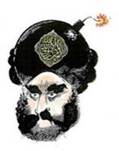

Click
here to watch the video recording of the class
OR Click
here to listen to the audio recording of the class.
Homework:
Listen to the audio recording or watch the video
recording of the class, read the notes, and answer the following questions
thoroughly. Short answers are not accepted. Must email me the homework.
The example of Hitler

1. How do you reply to the
ones who say Bin Laden shares the same religion as yours?
2. What religion was
Hitler? How many people did he killed?
3. Is it right to blame
Hitler’s acts on his religion?
4. Do we need to tell the
Cristian people that Hitler doesn’t represent Christianity or they already know
that?
5. Do we need to tell the
Cristian people that Bin Laden doesn’t represent Islam or they already know
that?
The example of Anti-Abortion Terror

1. What is the Christian
Army of God?
2. What was its motives?
3. How many kinds and
counts of violence it did?
4. Was the Christian Army
of God motivated by Christianity?
5. Is it okay to blame
Christianity for it? Why or why not?
The example of IRA

1. What is the IRA? What
was its religion?
2. What did it do to be
considered an Army of terror?
3. What was its motives?
4. How many kinds and
counts of violence it did?
5. Was the Christian Army
of God motivated by Christianity?
6. Is it okay to blame
Christianity for it? Why or why not?
The example of Timothy McVeigh

1. Who is Timothy McVeigh?
What religion he was?
2. What did McVeigh do? How
many were his victims?
3. What was the motive
behind McVeigh acts?
4. Can we say that McVeigh
acts represent America? Why or Why not?
5. What was the end of
McVeigh?
The example of Ku Klux Klan (KKK)
Use information from this link to answer the questions below
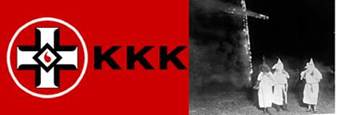
1. What is the KKK? What
was its religion?
2. What was its motives?
3. How many kinds and
counts of violence it did?
4. Was the KKK motivated by
Christianity?
5. Is it okay to blame
Christianity for it? Why or why not?
Other Arguments:
1. What is the point of
mentioning these examples?
2. All American citizens
were hurt once, but we American Muslims were hurt twice. Why? Explain.
3. When a Muslim commits a
crime, the media says a Muslim committed a crime. But when a Christian commit a
crime, the media mention the name of the criminal only and no mention of his
religion. Why and what have been the motives of the media for doing this?
4. Mention the joke about
the Muslim who saved a little girl from being killed by a dog.
5. Was the intent of 911
just to damage the building and kill people? What is the other reason, which
related to unity? Did the terrorist achieve these objectives?
6. Who was Saddam Husain?
Was it appropriate for the media to go to the Masjid inquire about Sadam Husain
and Bin Laden? What is the right place to inquire about them? Why?
7. Use math to prove that
the Al-Qaeda is an extreme radical exception? Would the exception prove the
rule to be true or false? Can you have an exception if you don’t have a rule?
6. Do people who take Islam
seriously be considered radicals? Why?
7. Watch this video about
interview of the news to me and my family right after 911 and mention my
arguments and concerns, and if you agree or disagree.
8. Visit this site and write what do you think about
what is mentioned. Are all terrorists are Muslims?
9. Who are the ones who
carried the largest number of acts of terrorism in US?
10. What was the deadliest
act of terrorism within the United States prior to the September 11
attacks?
11. Summarize the arguments
by President Obama regarding Islam in this video clip.
12. How Hollywood is giving
Islam a bad name? See
this video.
13. In Islam, do we build
coalitions based on justice or religion? Do you prefer to have a bad Muslim
friend or a good non-Muslim friend?
Lesson [14]: Reply to “Islam Spread by the Sword”
Reply to stereotypes:
1. Islam is a religion that
spread with the sword.
2. Islam is a religion that
doesn’t tolerate other religions.
3. In a Muslim state, you
have to either give up your religion or get killed.

Click
here to watch the video recording of the class
OR Click
here to listen to the audio recording of the class.
Homework:
Listen to the audio recording or watch the video
recording of the class, read the notes, and answer the following questions
thoroughly. Short answers are not accepted. You must email me the homework via
email hw@zeiny.net
A. What made people say that about Islam?
B. Summarize the following replies to the
Stereotypes that Islam spread by the sword (violence).
1. Muslims made the invaded county better than it was.
2. When the British occupied Egypt, did they make Cairo better
than London? When the French occupied Algeria, did they make Algeria better
than Paris. When Gorge Bush occupied Iraq, did he make Bagdad better than
Washington or worse than Tijuana?
3. Indonesia.
4. The sword opens a land not a heart.
5. Did the Islamic law accommodate non-Muslim minorities living in
Muslim countries?
6. Non-Muslim worship places are preserved intact.
7. Quran said that "No compulsion in religion" Quran
(2:256).
C. What is the difference between liberation and
occupation.
D. (optional) What is the story of the Coptic
guy and the son of Amro Ibn Al-As عمرو
بي العاص.
E. What is the inquisition? What religion was
the one who did the inquisition? where and when did it start? What was the
purpose? How long did it last? Did Muslims do any inquisition?
Notes:
Answers:
1) From the Quran: The following verses from the Quran forbid
imposing the religion on people. See Quran 2:256 [There is no compulsion in religion], 50:45 [Can’t force them to believe] and 10:99 [Your Lord could have made all people on
earth believe. Who are you (Mohamed ﷺ) to compel them against the will of God].

2) The sword opens a land
and doesn’t open a heart. In other words, the sword was used to expand the
empire not to expand the religion.

3) In Islamic law (Sharia),
any declarations, consent, marriage, divorce, contractual agreement, decision,
testimony imposed by force is invalid.

4) Using force to compel
religion produces nothing but hypocrisy. The person who is under the threat of
the sword will not love or practice Islam nor will teach it to his/her
children.
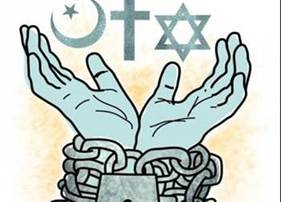
5) Unlike the history of
Christianity that has 400 years of inquisition;
the history of Islam doesn’t have any form of inquisition.
Ugly History: The Spanish Inquisition - Kayla
Wolf (5:41min YouTube Video)
What Punishment Was Like During The Spanish Inquisition (11:13 min YouTube Video)

6) The person who loves and
practice Islam, as well as teach Islam to his children is not the one under the
threat of the sword.

7) The largest population
of Muslims in the entire world is Indonesia.
Islam came to it without any military interaction. It was because Muslim
merchants came in the country to do business.

8) The difference between
occupation and liberation is that occupation makes the invaded country worse
than it was while libration makes it better than it
was. Muslims made the invaded countries better than it was, even better than
their own home land. An example of this fact is Spain. Click here to see how Muslims made Spain better
than the homeland they came from, including Mecca and Madina.
9) Muslims protected the
worship places of other religions. See the pictures of 2000 year old churches
in Muslim courtiers that have been protected by Muslims during the Islamic
rulings.
Very
Old Churches in Egypt still exist and respected to date.

Church of Nativity in Bethlehem where Jesus
was born still exist and respected to date in Palestine.
Crying Wall for Jews still exist and respected
to date in Palestine.

10) Muslim states had many
minorities that have been living safely for hundreds of years and their places
of worship are protected by the
Islamic state.

11) The Islamic Law (Sharia)
has a well established law
that protects the rights of people of other faith that live in a Muslim state.
The Christians and the Jews are called the people of the book in the Islamic Law. In
addition, Other non Muslims
are called the people of Dhima in the Islamic Law.

12) Islam allows a Muslim
man to have a wife who is Christian or Jewish Quran 5:5. This is the highest level of tolerance when
the most beloved person to your heart and the mother of your children is from a
different religion.

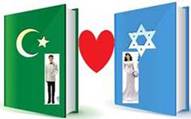
13) Islam allows Muslims to
have relationships with Non Muslims who are not
fighting against the religion of Islam Quran 60:8 & 9 [It basically says that God doesn’t
mind if you have non Muslim Friends and loved one but
he doesn’t want you to have relationships with enemies of the Religion]

14) The reason people
entered Islam after the Muslims used the sword to open the land was because
they ﷺ the difference between the old government and the new
government. They have seen what Islam brought them and they liked it.

15) What Happens to the
Muslims who Denounce Islam Publicly.

• Islam has a policy that says that if you don’t
harm the religion, the religion will not harm you.
• At the time of the Prophet ﷺ, enemies of
Islam used to embrace Islam in the morning and then denounce it in the evening
announcing publicly that Islam is a bad religion. It was a tactic to drive
people away from Islam. The Quran mentions this fact Quran 3:72.
• To stop people from doing this, the Prophet ﷺ
order that the ones who embrace Islam and then denounce it publicly be given
three days chance to correct themselves publicly or get killed.
• If people denounce Islam privately, nothing
happens to them.
• During the three days all what the person has to
do is to declare publicly that he was wrong and then he/she will let go. It is
an easy way out.
• This rule applies only in Muslim countries.

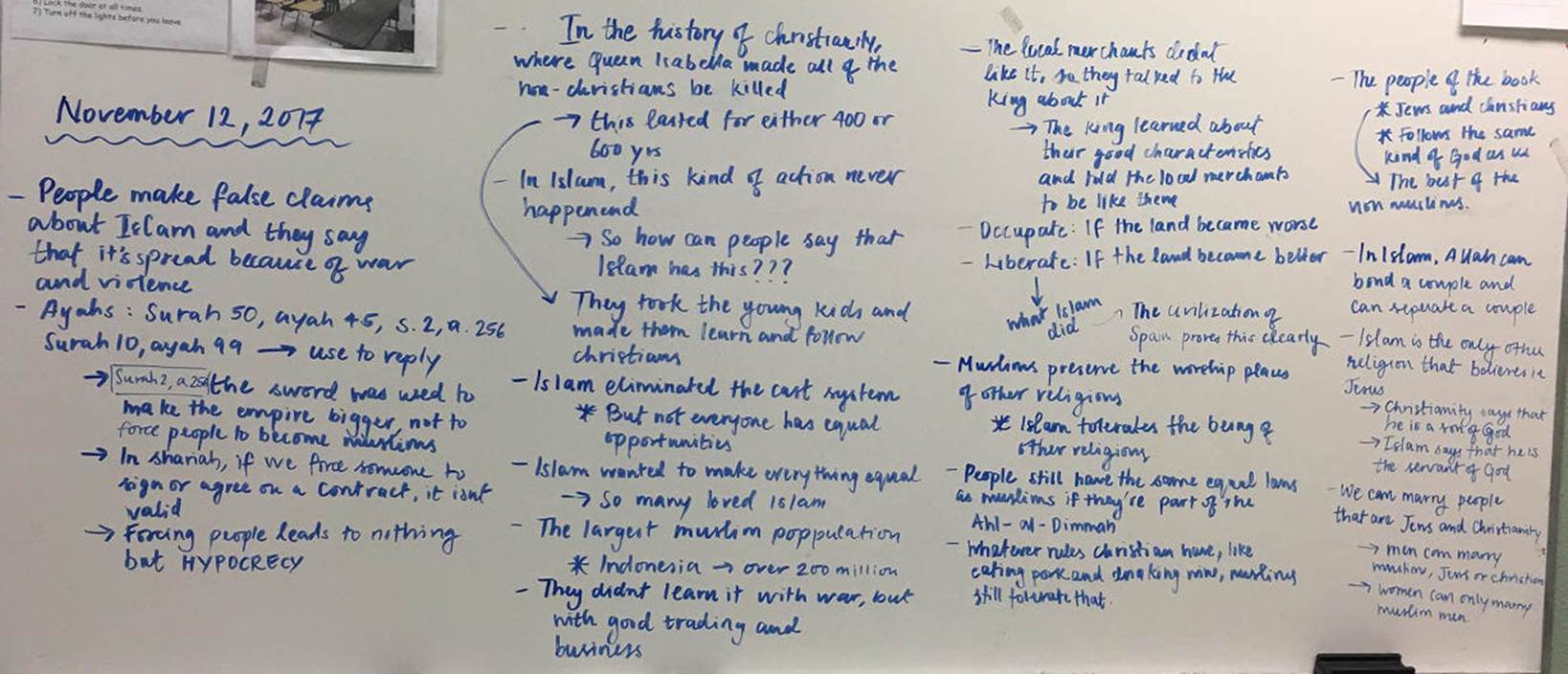
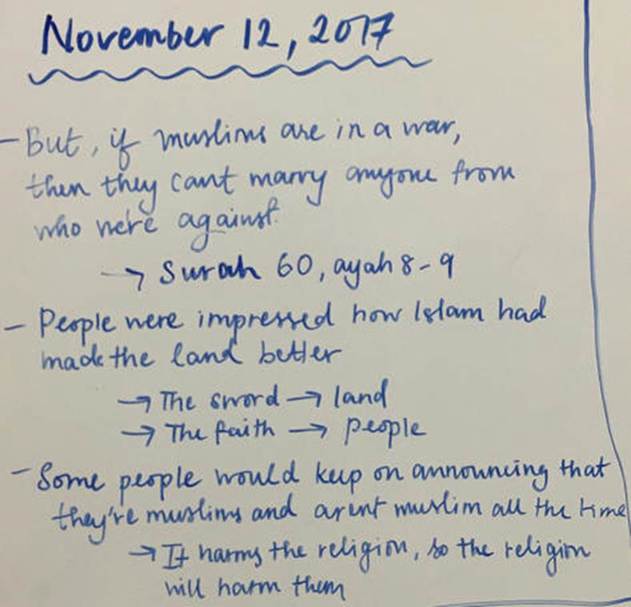
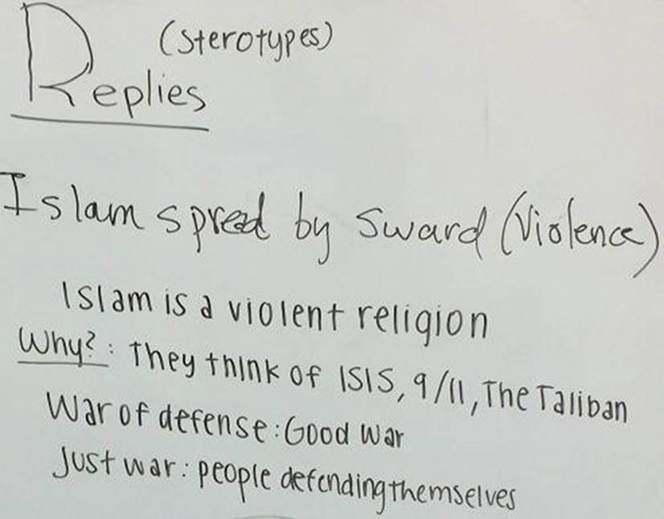
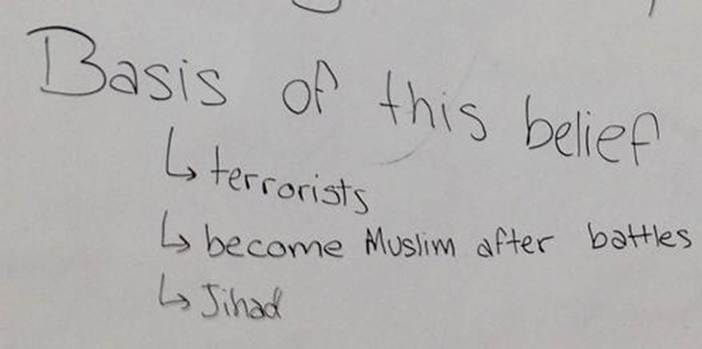

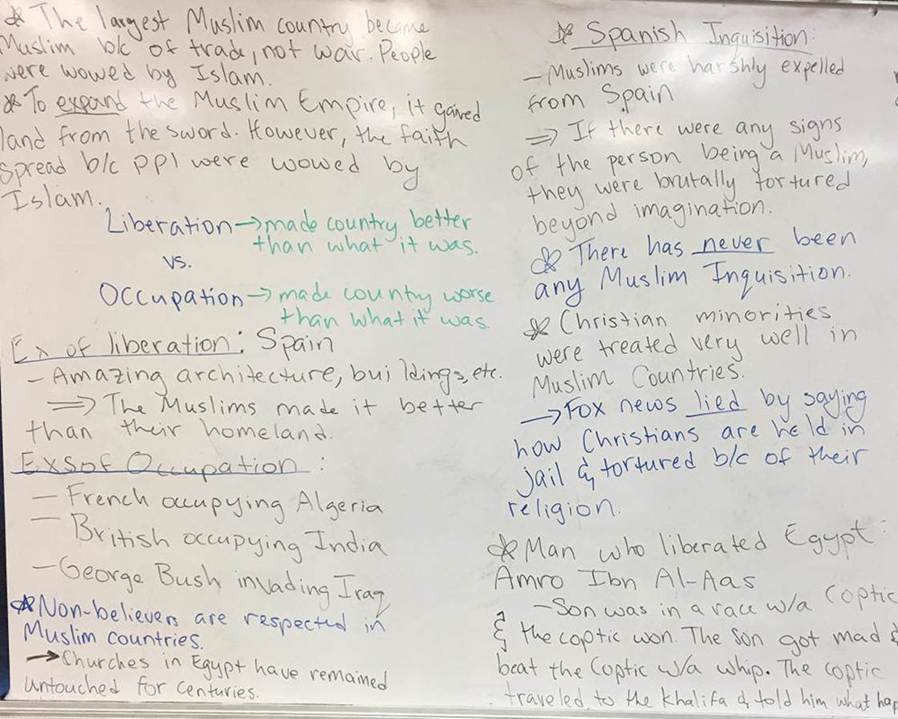
Lesson [15]: Reply to “Sharia (Islamic Law) is too Harsh”
Defending Islam against Stereotypes


Click
here to watch the video recording of the class.
OR
Click here to listen to the audio
recording of the class.
OR
Click
here to read the written notes.
(Optional) Click
here to download/read the book “The Lawful and the Prohibited in Islam”
Homework:
Listen to the audio recording or watch the video
recording of the class, read the notes, and answer the following questions
thoroughly. Short answers are not accepted. You must email me the homework
via email hw@zeiny.net
1.
Is there a country without laws?
2.
There are two kinds of laws regarding the source of the law. What
are they?
3.
If we reject the divine laws, what is the remaining alternative?
4.
Manmade laws made to be biased towards few? Explain the favored
people in Capitalism and Communism.
5.
Why Sharia is not biased to the favor of anyone?
6.
When the name of the Islamic Law (Sharia) is mentioned, people
think about the law of punishment for criminals, why? Isn’t Sharia much more
than that? Explain.
7.
If we assume that what was meant by Sharia is the law of
punishment for criminals, then:
a.
Why they say that Sharia is harsh. Mention the punishments of the
examples given in class and you can add your own as well.
b.
Is Sharia really harsh on criminals? Why?
c.
Justice biased towards criminals (easy punishment) versus justice
to the favor of victims (harsh punishment). Explain how and why Sharia is kind
to victims.
d.
How does Sharia reduce the total number of victims and criminals?
e.
Explain the benefit from a crime / cost of punishment ratio, i.e.,
the worth of a crime. Explain how Islam keeps this ratio low? Explain the table
below?
Worth of a crime = (100% - Chances of getting away) × amount of stolen money

8.
According to Surat Al-Maeda (Maeda 5:44-45), the laws
of life for a life …etc. were mentioned in which book? What is the meaning of
this law?
9.
What is the meaning of the Ayat (Shura 42:39-43) and how
is it related to the subject?
10.
The Ayah in (Shura 42:40) talks about
justice in punishment. It says that the punishment is equal to the offense.
Explain how? Hint: talk about is equal means the same? If someone raped a
victim, then would the punishment be a reverse rape! ....
11.
Is Sharia intended to protect the public space or the private
space?
12.
Does Sharia allow spying on the people in their private places?
Mention the story of Umar and the drunk people.
13.
Difference between the rich thieves and the poor thieves in terms
of how harsh the punishment in both cases?
14.
When did OmarRAA stop
cutting the hands of the poor thieves?
15.
In the Islamic law, what is the value of a bottle of Alcohol? Why?
Board Notes:

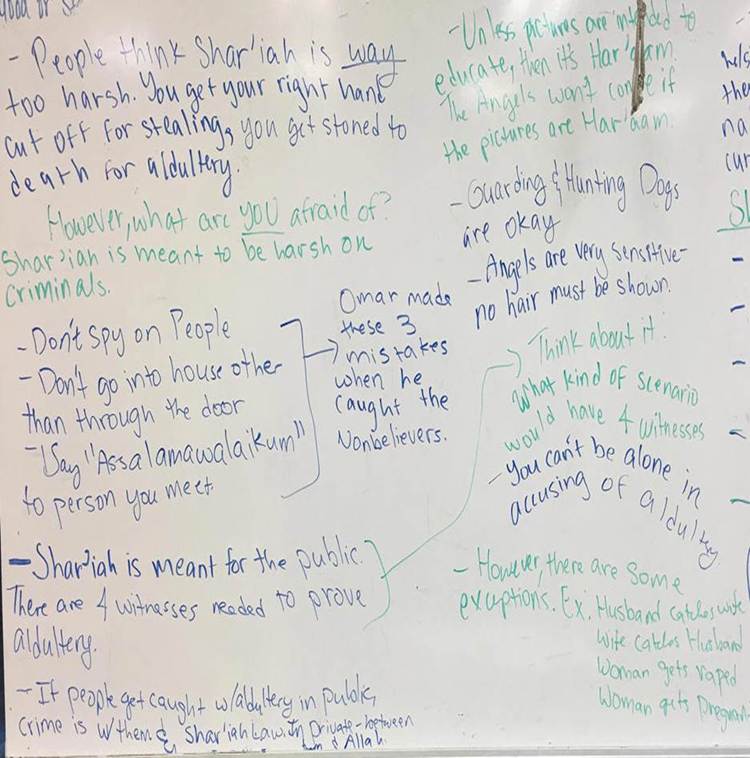
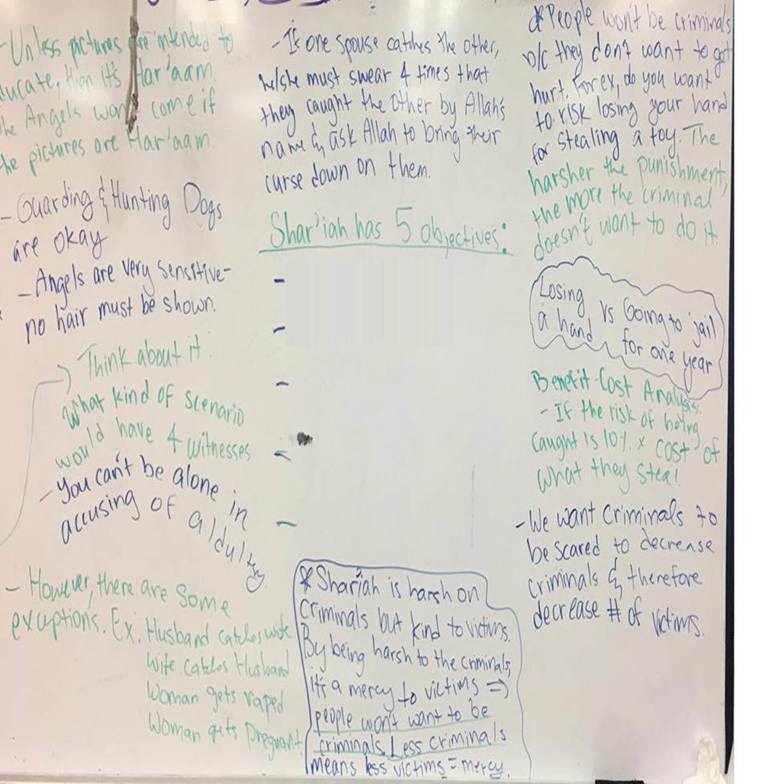
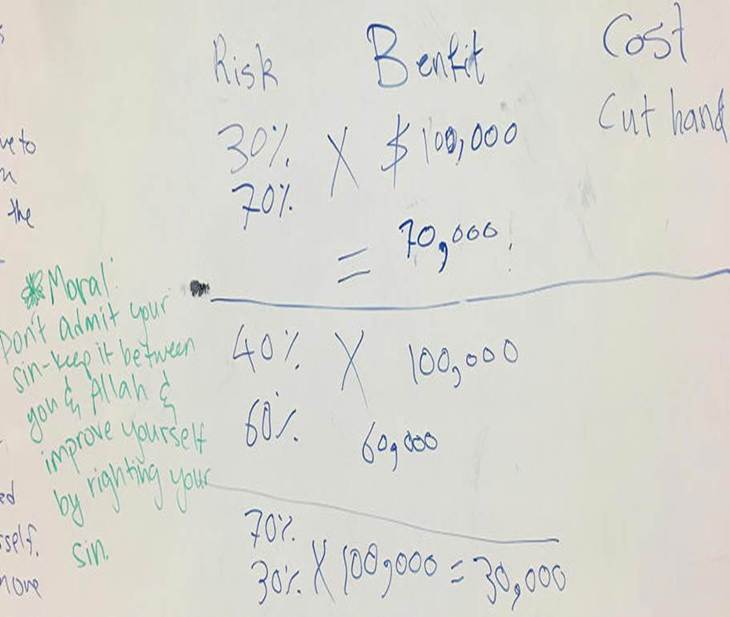
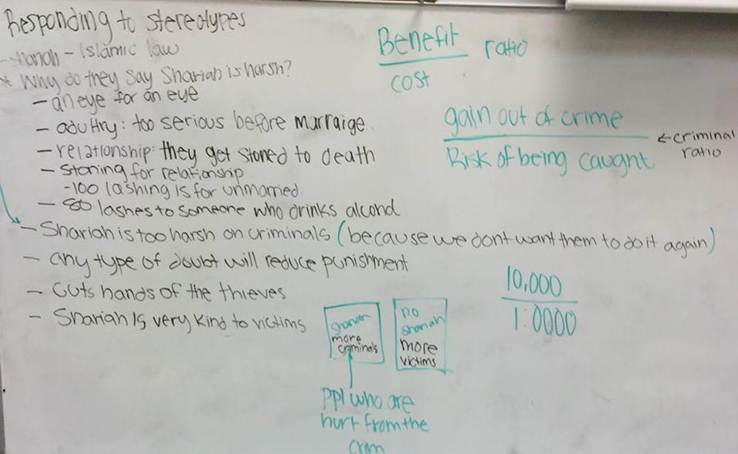
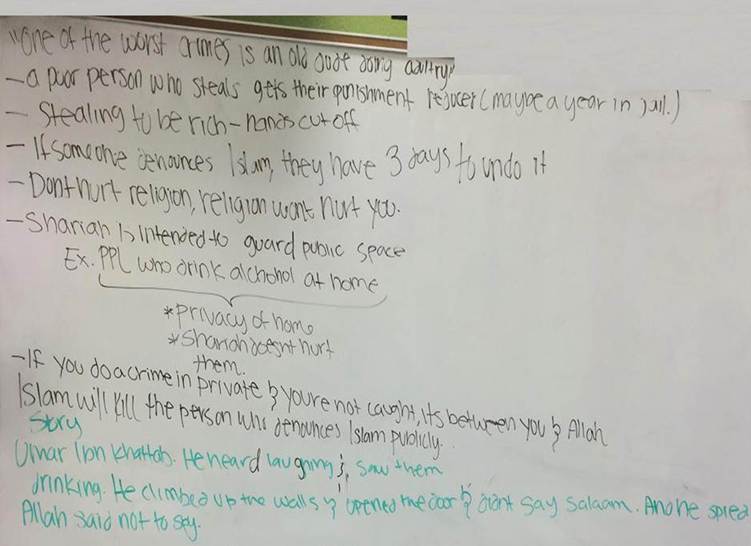
Lesson [16]: Reply to “Sharia (Islamic Law) is too old”
Defending Islam against Stereotypes
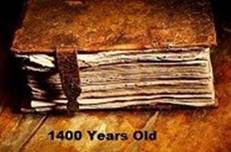
Click
here to watch the video recording of the class.
OR
Click
here to listen to the audio recording of the class.
OR
Click here to read the written
notes of the class.
(Optional) Click
here to download/read the book “The Lawful and the Prohibited in Islam”
Homework:
Listen to the audio recording or watch the video
recording of the class, read the notes, and answer the following questions
thoroughly. Short answers are not accepted. You must email me the homework
via email hw@zeiny.net
1.
How old is the Islamic Law (Sharia)
2.
What is the fixed part of Sharia that does not change with time
and place and what is the variable part that changes with time and/or place?
3.
What are the Ten Commandments? Do they still apply untill today? Do they change with time and place? Why?
4.
Explain the difference between Hallal and Haram versus wise and
unwise?
5.
Does Sharia allow freedom for Haram or corruption? What freedoms
the Sharia provides?
6.
If Sharia allows freedom of choice between Hallal alternatives,
how do you select which alternative to use?
7.
Give an example how the Capitalism laws change with time and place
(Lake Tahoe for example). Comment on that. Which value is controlling? Moral
values control the economy or the economy is controlling moral values in
Capitalism?
8.
Capitalism is based on selfishness and greed. Give three examples
(Extra crops, Safeway stores, Las Vegas buffets).
9.
Mention the haram dealings in doing business?
10.
What is Riba? Explain the equation of Riba as the equation of
Sharia. How are they different? How is the Sharia equation being superior to
Riba equation.
11.
Solve the following Riba puzzle. One of the puzzles that is often
used to illustrate the concept of Riba is the following scenario: Two people
agreed that one is going to lend the other one million today for three million
next year. After the three years were over, the borrower returned only one
million dollars to the lender. The lender disagreed and demanded the remaining
two million. The borrower said that this is Haram Riba and he is not going to
pay it. They went to the judge to rule according to Sharia. If the judge would
rule to the favor of the lender, then he is violating the prohibition of Riba.
If he would rule to the favor of the borrower, then it is not fair for the
lender and he would be supporting injustice. So what
was the fair ruling of the judge?
12.
Explain the following five objectives of Sharia. Use
this link for explanation.
a.
Protection of religion.
b.
Protection of human life
c.
Protection of intellect
d.
Protection of progeny
e.
Protection of wealth
13.
Do these five objectives of Sharia change with time and place?
Why?
Board Notes:
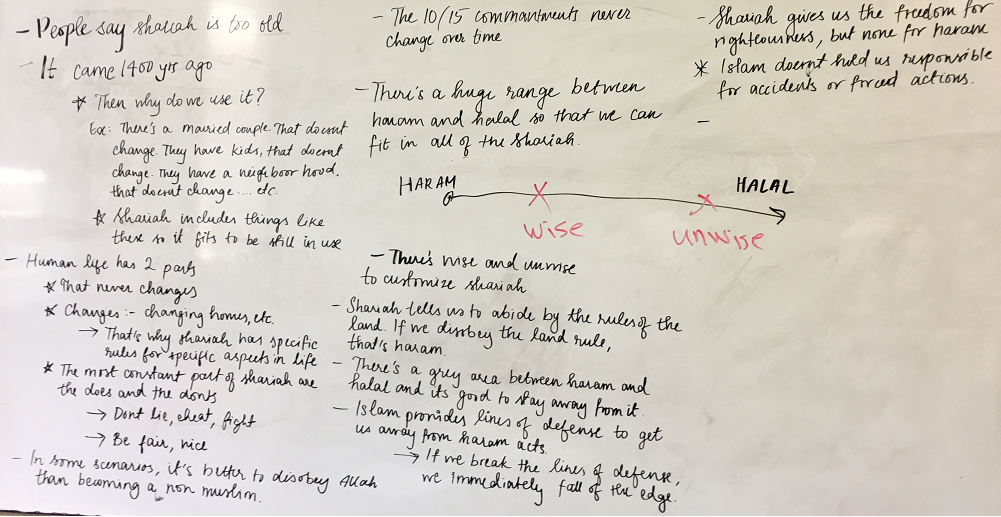
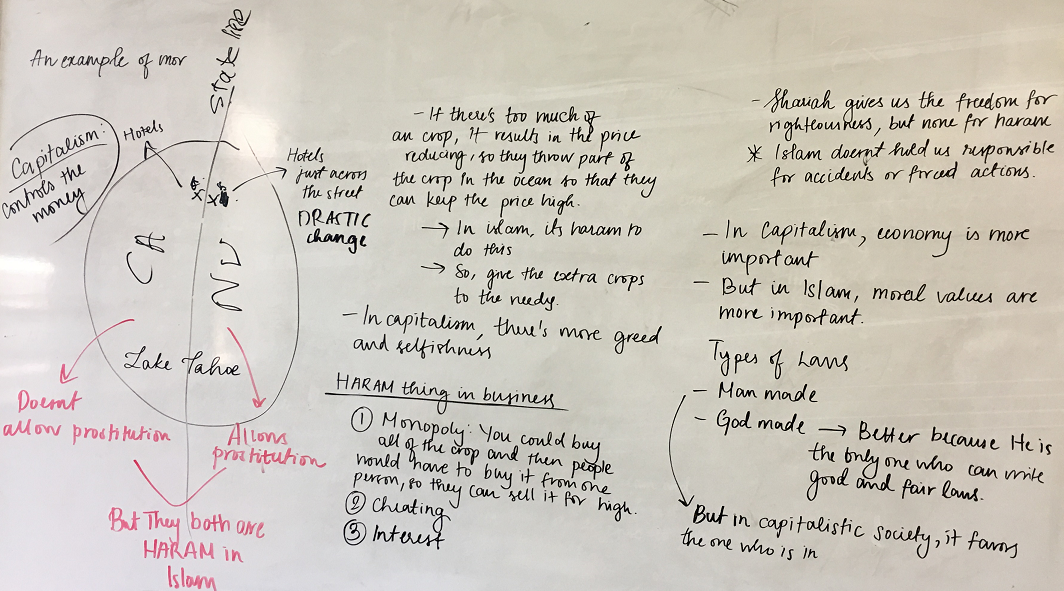
Last Year Notes:
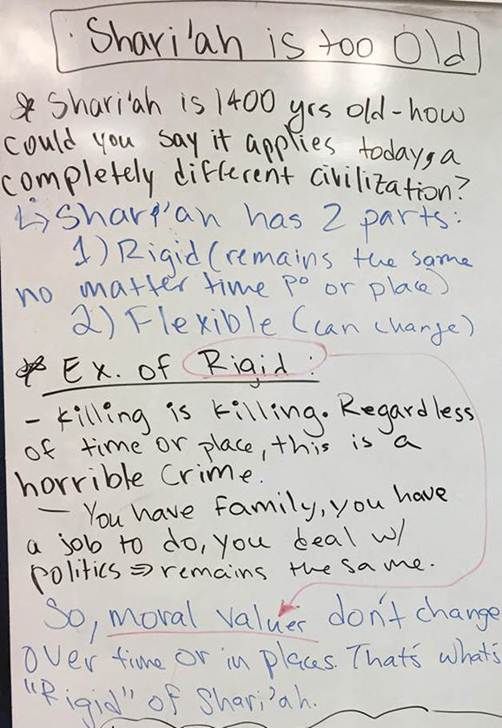
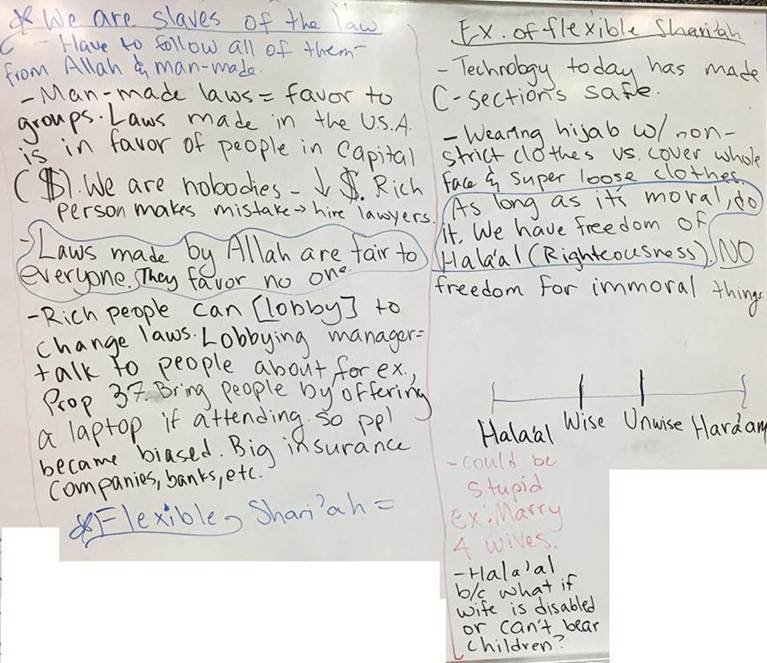
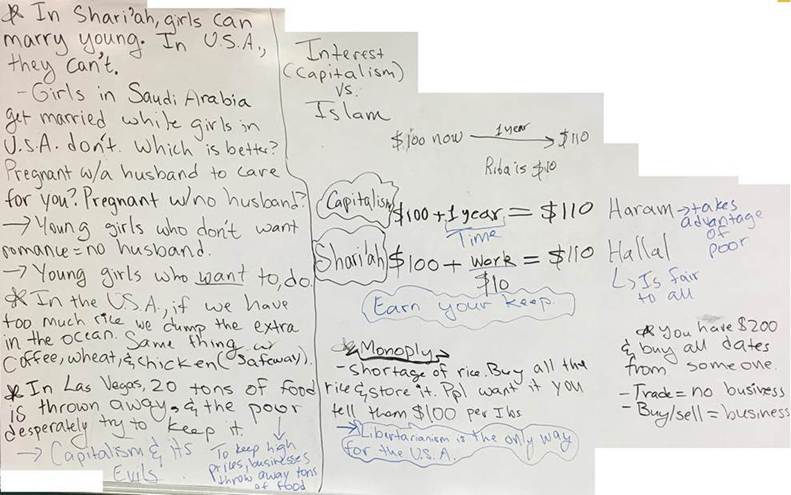
Lesson [17] Reply to Hijab Issues.
Defending Islam against
Stereotypes

Click
here to watch the video recording of the class.
OR
Click
here to listen to the audio recording of the class.
OR
Click here to read the written notes of the
class.
(Optional) Watch the following
video about Hijab (5:41 min YouTube Video Or Download) and use
it as well to answer the questions below.
Homework:
Listen to the audio recording of the class or
watch the video, read the notes and answer the following questions thoroughly.
Short answers are not accepted. You must email me the homework via email hw@zeiny.net
1. What made people say that Islam has double
standards when dealing with men and women in Hijab issues?
2. What made people say
that Hijab is a form of oppression?
3. Is Hijab a Fard?
a. Write and explain the
three Ayat that that prove that Hijab is mandatory not an option? The Ayat
numbers are 24:31, 33:59 and 24:60.
b. Hijab is a Fard is
proven by Ahadeeth. One of them is the Hadeeth of
Asma. What is the Hadeeth of Asama when the Prophet ﷺ her without Hijab?
c. Hijab is also proven by
continuous practice since the days of the Prophet ﷺ. Explain.
4. The Nature of women =
Feminine side (physical appearance) and professional side (talent).
a. Explain.
b. Which side is for
business and which side is for husband family life?
c. Can the Feminine part
(Physical appearance) be used for business?
5. Women and girls can be
spreading unethical temptations by physical appearance. Explain how?
6. The Shytan uses the
physical appearance to generate haram lust. Explain.
7. Why does Islam want to
hide the physical appearance? Explain.
8. Some commercials use the
body of the women to promote product.
a. They appeal to what
attributes of women to promote their products and ideas?
b. Aren’t they lust?
Explain.
c. Mention the story and
the reply of the Muslim women who was told that why would employers hire you
instead of men who have fewer excuses? What was her reply?
9. Because of physical
appearance, pretty women may be promoted over talented ones. Explain.
10.How do you reply to the one who says that my
talent is my look?
11.Women may be looked at as lust objects.
a. Explain. How
b. What happens when a
teacher said that the beautiful secretary is part of the fixed cost of doing
business? What was the response of the female students?
c. A pretty woman reporter
gets an award. Her male coworkers wanted to put her down. What was the story?
d. An almost naked girl was
used for the commercial promoting buying certain kind of bulldozers. What is
the relationship between the body of the women and this construction machine?
What is the implied message?
12.What is the message communicated in high
school culture regarding the physical appearance?
13.There are five lines of defense against
adultery or fornication.
a. What are they?
b. Explain why each one of
them is necessary?
c. Did Allah ﷻ
say don’t commit adultery or don’t approach adultery. What is the difference
d. Is it possible to avoid
adultery if these lines of defense don’t exist? Use the edge of the cliff
metaphor.
e. Is it permissible for a
man to be alone with a woman in a private place to teach her Quran? Mention the
Hadith of the Prophet ﷺ regarding this.
14.The metaphor “Why buy the cow if you can’t
get the milk for free”
a. What is the meaning of
this metaphor?
b. In a haram romance, who
is the loser? Explain why?
c. In a haram romance, who
is taking advantage of the other side, the boy or the girl?
d. Why the divorce causes
bankruptcy to men?
e. Why do men prefer to
have Haram romance over marriage?
Board Notes:
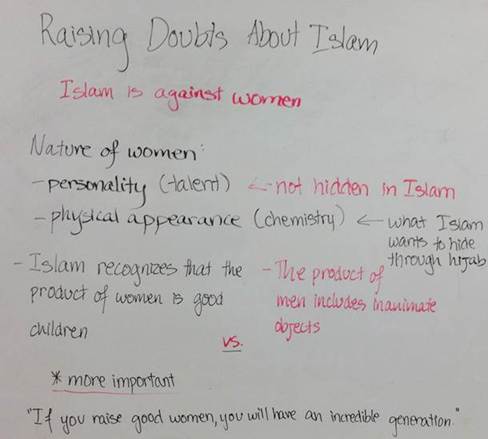
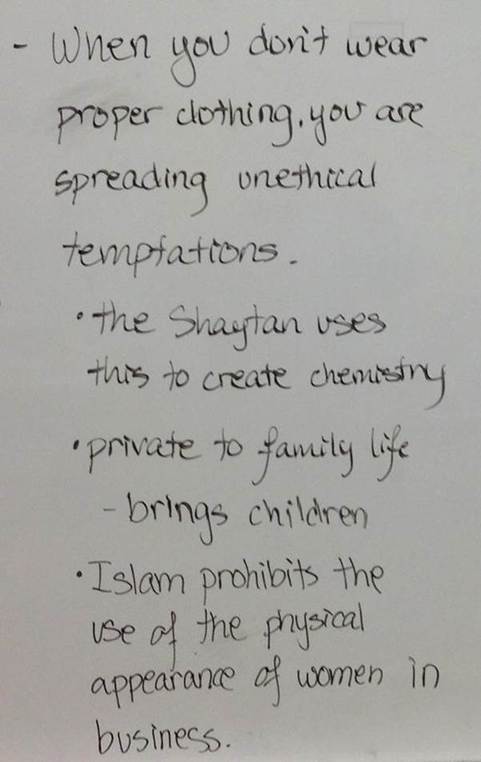


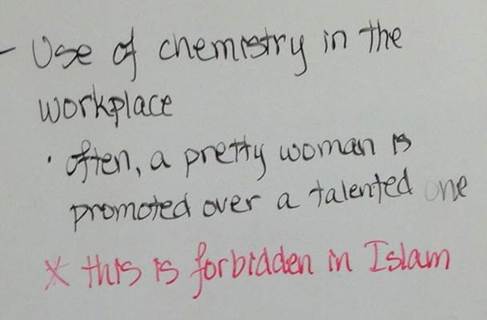
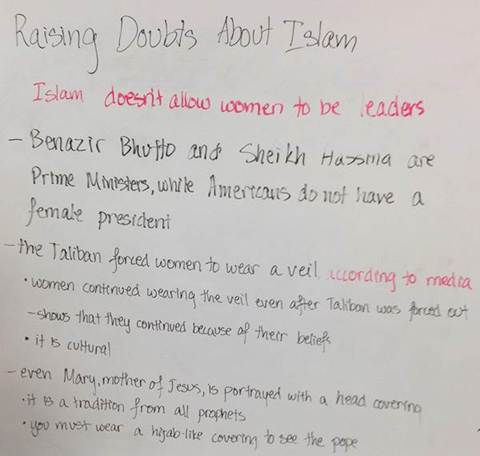
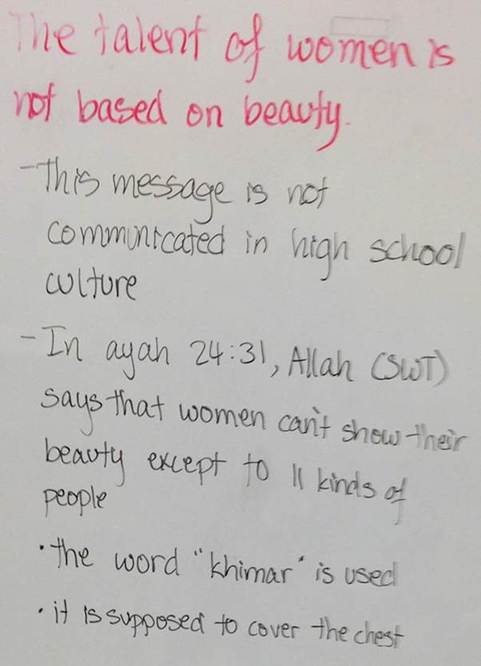
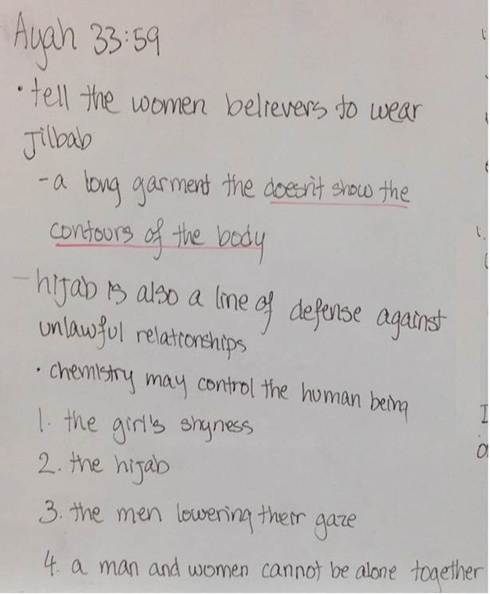
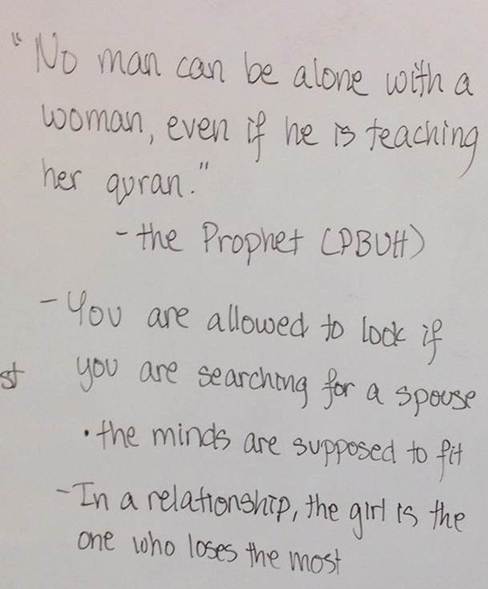
Lines of defense against adultery or fornication are five:
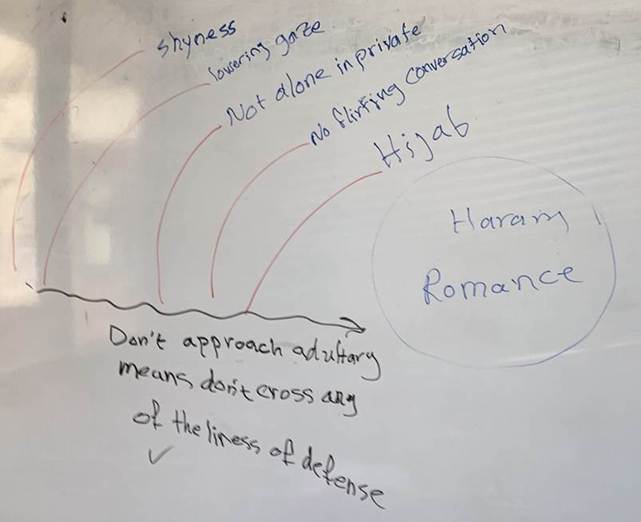
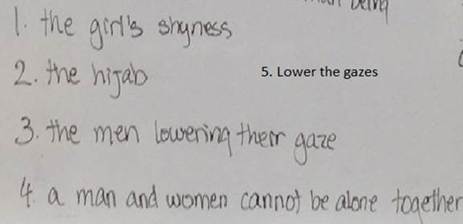
Lesson [18]: Reply to “Women are not Equal to Men - Islam allows girls to marry young - Islam does not allow boys and girls to date before marriage.
Defending Islam against Stereotypes

Equality is not always just.
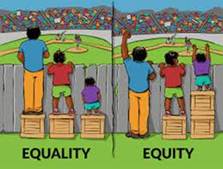
Reply to: Women can’t be leaders

Benazir Bhutto, former prime minister of Pakistan.

Sheikh Hasina, prime minister of Bangladesh.
Click
here to watch the video recording of the class.
OR
Click
here to listen to the audio recording of the class.
OR
Click here to read the notes of the
class.
Homework:
Listen to the audio recording or watch the video
recording of the class, read the notes, and answer the following questions
thoroughly. Short answers are not accepted. You must submit your homework
via email hw@zeiny.net
Status of women before Islam in Early
Christianity:
1. What is Misogyny?
2. Why did early Christianity refer to marriage as the “filth of
marriage”? Get the answer by summarizing
· http://plainislam.blogspot.com/p/filth-of-marriage-devils-gateway.html
OR (pdf format)
3. Is the bible Misogynic?
Get the answer by summarizing:
· https://members.bib-arch.org/biblical-archaeology-review/43/2/7. OR (pdf format)
· OR Christianity,
Religion and Women: Misogyny in the Bible. ( 6:46 min YouTube Video, Download)
4. Why do the following
verses in the bible be considered as the source of misogyny? Genesis 3:6 to 8.
· See Sexist Bible
Verses (2:49 min YouTube Video, Download).
5. Why do we Muslims
consider verse Genesis 3:9 to be a low image of Allah ﷻ?
6. Read and comment
on why women need freedom from religion OR (pdf
format)
Status of women in pre-Islamic Arabia:
7. Why would pre-Islamic
Arabs burry their baby daughters alive?
8. In the pre-Islamic
Arabian society, could women inherit or get inherited? Explain.
9. In the pre-Islamic
Arabian society, could women own or be owned? Explain.
10. In
the old Indian Hindu society, what happens to the wife when her husband dies?
Status of women in Islam:
11. Islam
views that the product of a woman is a human being but the product of a man is
much less value. Explain.
12. What
did Islam do to correct the status of women?
13. Why
would Prophet Mohamed ﷺ and Islam be considered revolutionary
in women rights at the time?
14. Was
Prophet Mohamed ﷺ a feminist, like modern day feminists?
Explain why.
15. Um
Salama used to ask the Prophet Mohamed ﷺ about women. Allah ﷻ would respond
to her questions directly in the verses below. Explain them.
a. The good deeds for both
genders are equally appreciated [Omran 3:195], [Women 4:124] and [Bees 16:97].
b. Listing doers of good
deeds for both genders [Ahzab 33:35]
Equality versus Equity:
16. Explain
the differences between Equity and Equality?
· See
(3:36 min YouTube video, Or download).
· Briefly summarize https://everydayfeminism.com/2014/09/equality-is-not-enough/
17. Give
example of a case where equity is justice and another case where equality is
justice.
18. Why
men and women not compete together in the Olympics?
19. Are men and women being
identical? Are they equal?
Islam allows girls to marry when they are young:
20. Difference
between a pregnant teenager in US and Muslim country. Which one is more
descent?
21. The
alternative does not have to be arranged marriage. Explain.
22. Comment
on arranged marriage, independent marriage without any regard to parent’s
opinion and Islam
23. Would
Islam allow a girl to be forced to marry a person without her consent?
24. Why
Islam does not allow boys and girls to date before marriage? Is it moral? How can girls be taken advantage of?
25. In
Muslim countries would a girl would give herself up to a guy without marriage?
Explain why not? Why would this make girls precious?
26. Why
would a girl wear clothes showing her body when it is freezing cold?
Women can’t be leaders
27.Did the US ever have a female president?
28.How would you reply to the ones who say that
Islam doesn’t allow women to be leaders?
Lesson [19]: Reply to “Islam Allows Men to have four wives - Women can’t be leaders”.

Click
here to watch the video recording of the class.
OR
Click
here to listen to the audio recording of the class.
OR
Click here to read the notes of the
class.
Homework:
Listen to the audio recording or watch the video
recording of the class, read the notes, and answer the following questions
thoroughly. Short answers are not accepted. You must submit your homework
via email hw@zeiny.net
1.
Is polygamy allowed in the bible?
a.
How many wives the bible say about Prophets Ibrahim, Yaqob, Dawod
and Soliman? (6:28 min YouTube Video, Download)
b.
The parable of Jesus and the ten virgins in the Bible (Short
YouTube Video, Download)
2. What are the main
differences between polygamy allowed by Islam and polygamy allowed by other
traditions, such as the bible, the book of Mormon, ...etc.
a. The number is limited to ???
b. Men are not allowed to combine the followings in
the same marriage (women 4:22-23): ???
c. Justice between wives must be enforced (Women 4:3). If you have
doubts of being just, then???.
d. What happen to the one who is
not fair when dealing with his wives?
3. What is serial polygamy? How is it related to
the subject?
4. Is it illegal to have one wife and unlimited
number of girlfriends?
5. What if a man caught
with another woman that is not his wife, is it a crime?
6. What if a man caught
with another woman that is his 2nd wife, is it a crime?
7. Is it illegal for a married man to have a
relationship with another married woman?
8. Not allowing man to have multiple wives make
women lose their rights. Explain?
9. What are the reasons when have multiple wives
is necessary?
10. What is the story of the single woman who
converted to Islam in Canada and was lonely?
11.What is the norm regarding having many wives?
Whey?
12.Who is more likely to survive, baby boys or
baby girls? Why? Hint see this. Male Mortality
is ??% ??????? than female mortality.
13.Wars take the lives of which gender?
14.Why is it nice to have a co-wife sometimes?
What are the advantages of this?
15.What are the reasons for which a woman cannot
have multiple husbands?
16.What is the Cervix cancer and
how is it related to girls who have more than one boyfriend?
Board Notes:
Three set of board notes
are shown below.
Board Notes: (1)


Board Notes: (2)




Board Notes: (3)

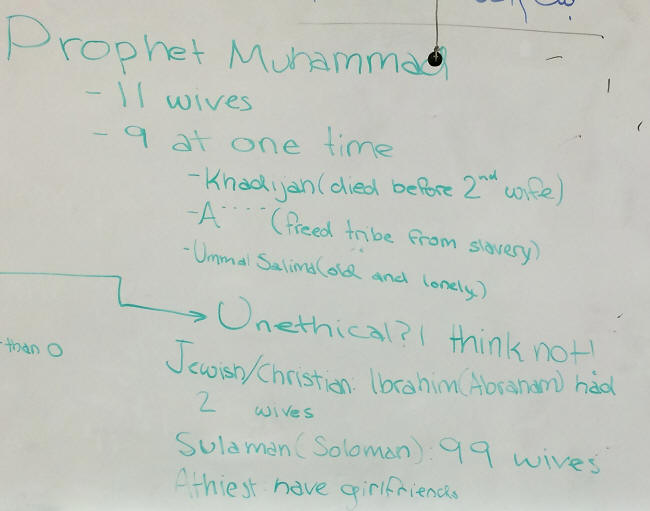

Lesson [20]: Reply to “Islam Allows Slavery”
Defending Islam against Stereotypes.
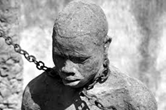
Click here to watch the video
recording of the class
OR
Click here to listen to the audio
recording of the class.
OR
Click here for the written Notes.
1.
Introductory video
·
Islam and Slavery —
Condoned or Condemned? (9:49 min YouTube Video or Download) By Anne-Marie
Ionescu.
·
Does the Bible Condoned Slavery? (4:40 min YouTube Video or Download)
2.
Other optional sources are:
·
Slavery in Islam (really good, comprehensive and very intellectual) by Professor
Jonathan Brown (1:52:22 hours YouTube Video or Download).
·
read this article in Wikipedia about (Islamic Views on Slavery Or Download).
Homework:
Listen to the audio recording or watch the video
recording of the class and read the notes, then answer the following questions thoroughly:
1. When Islam came, was
slavery already existing or did Islam introduce it to the society?
a. Is slavery allowed in
the Bible?
b. Were any the founding
fathers in the US were slave owners? Hint describe George Washington’s slave
women and slave children.
c. Is it reasonable to
compare the 6th century Arabia with the 21st century
America? Why?
2. The Islamic slavery was
in no way comparable to the American slavery. Actually, the American slavery
can’t be called slavery because ……?
3. Islam upgraded the
status of slave-master relationship to be closer to employee-employer
relationship. How?
4. Islam has introduced a
tactic to reduce the number of slaves in a Muslim Society. What was this
tactic? Use the metaphor of water tank to explain the tactic.
a. Source of slavery is
only ……. ???.
Outs are
i. Killing by accident
(Nisa 4:92)
ii. …???
iii. …???
iv. …???
v. …???
vi. …???
vii. ... ???
b. It led to the gradual freeing
of slaves. Freeing all slaves at once would create …..?.
5. All Muslim countries
paned slavery at ….???
6. What are the
possibilities in handling prisoners of war? Rank them in terms of best to
worst.
a. Free them, but they
would come back to …???
b. Slavery
c. ….???
d. ….???
e. ….???
7. No prisons in the past
to handle prisoners of war. The slavery is an alternative to prisons. What are
the advantages of slavery over prison?
In prison, they are burden on the society, have to be ….???, have
to be …???. In Slavery they work for the …???? and get
exposed to …???.
8. Status pf women slaves
before Islam.
a. Women can be ….???.
Islam upgraded the status of slave women from being a master-slave relationship
closer to a man-wife relationship that slave women are treated like wives (A
concubines is a woman who….?). Once it is pregnant her status upgrades automatically
….. Most of the Sultans and leaders that ruled the
Islamic world were children of …???.
b. Islam encourages to get
the slave men and women ….???
9. Slave rights:
a. Access to court
b. ….?
c. …?.
d. ….?
e. ….?
f. …?
g. The Prophet ﷺ said about slaves “Your slaves are your ….???. (Bukhari
#2545).
h. The problem is with
Muslims, not with….???.
10. The
modern examples of handling prisoners of war are:
a. Guantanamo Bay Detention
Camp. Compare slavery in Islam to Guantanamo Bay Detention Camp Click here to learn
about Guantanamo Bay Detention Camp from Wikipedia.
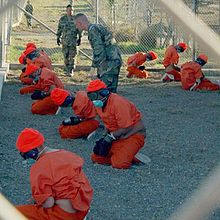
b. The modern example of
Bosnia. …???. Systematic rape as an instrument of ethnic cleansing. ….???.
c. Rape camps happened in
1990s in the middle of Europe that brags about ….
11. The
old example of African Americans.
a. Kidnapped
b. …???
c. ….???
d. …???
e. …???
12. Who
was Malcolm X? Why his last name is X? Briefly talk about his impact on civil
rights. Use this link to read more about
Malcolm X.
Notes (1):
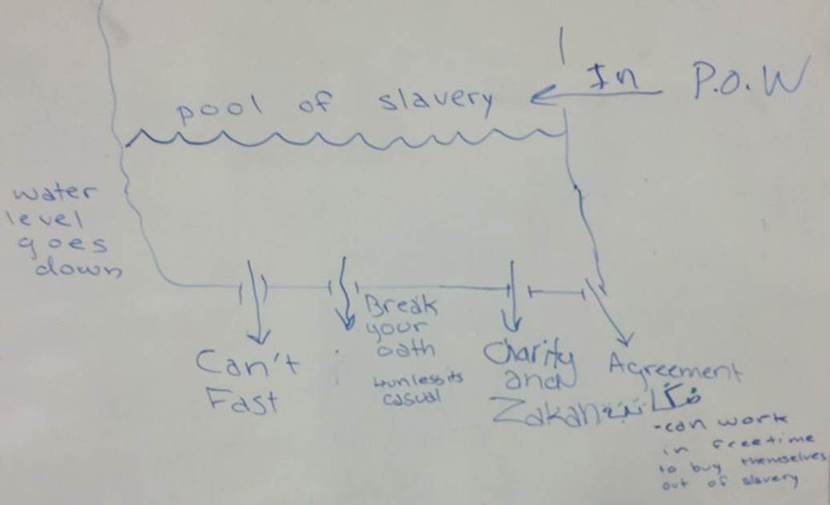

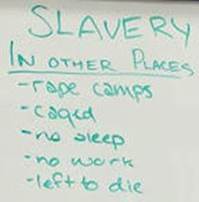
Notes (2):
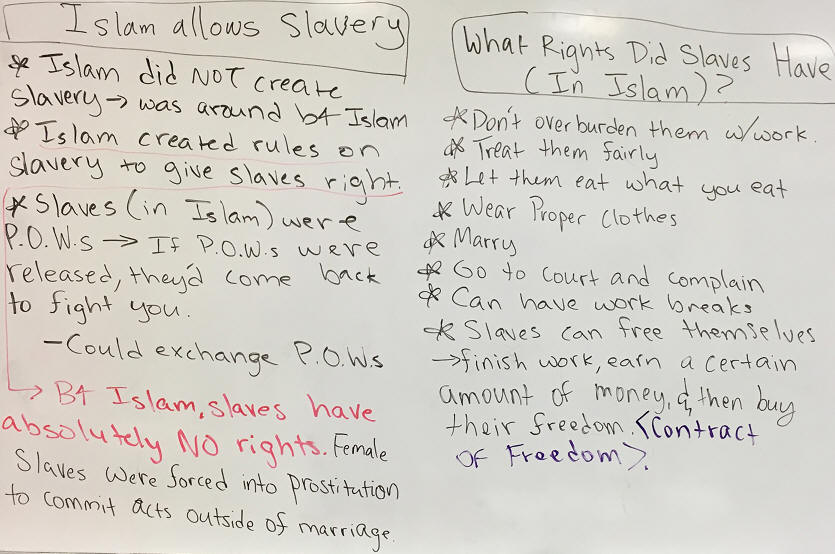
Notes (3):

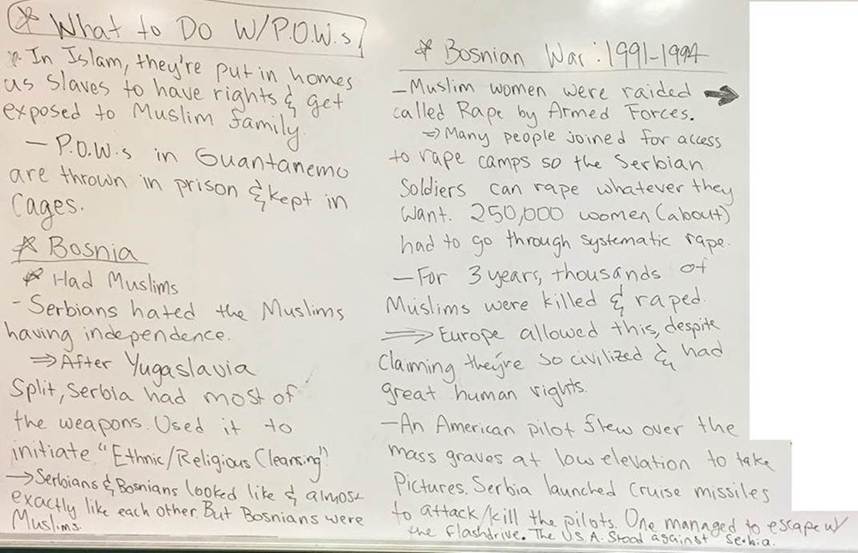
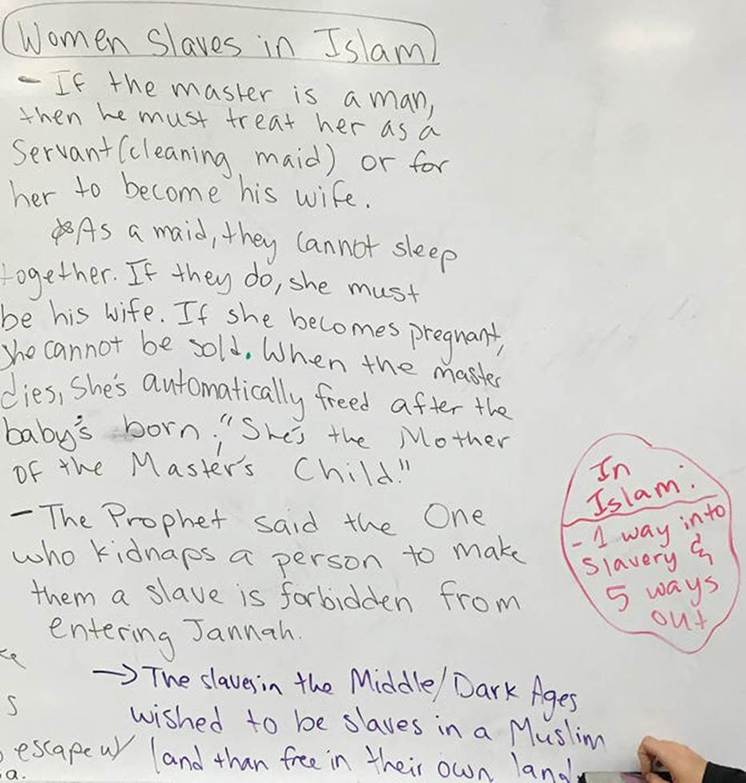
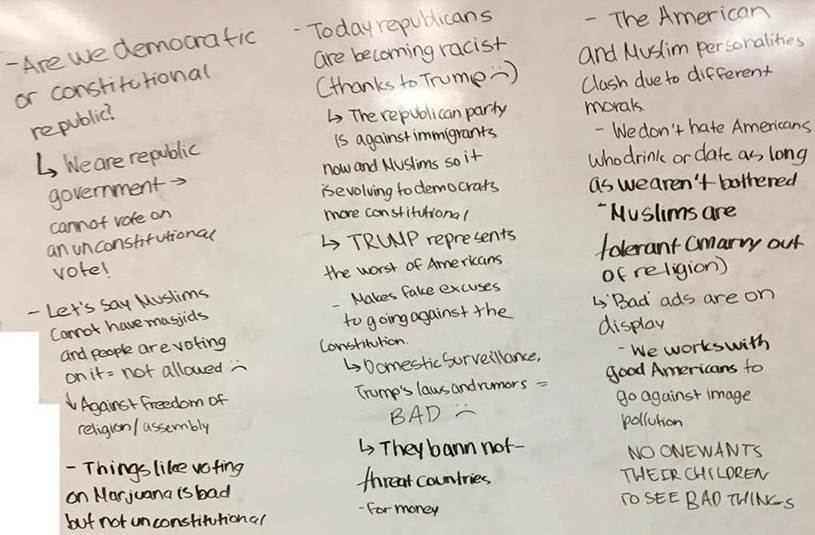
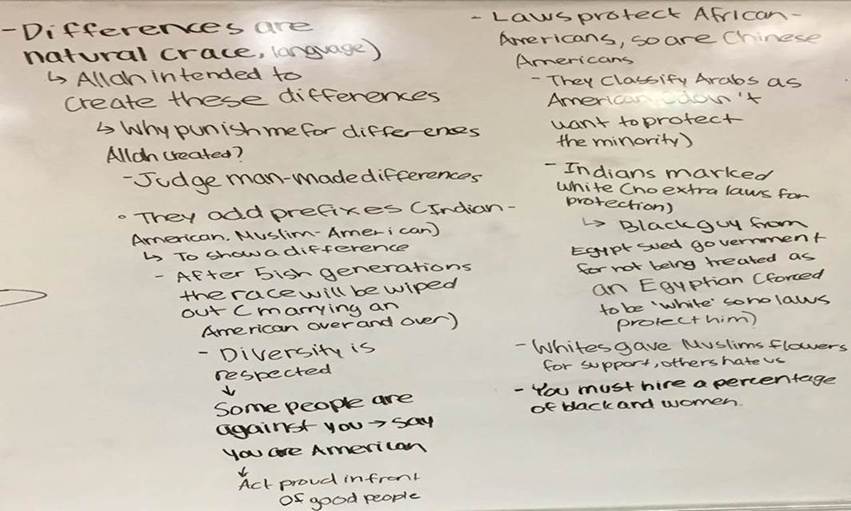
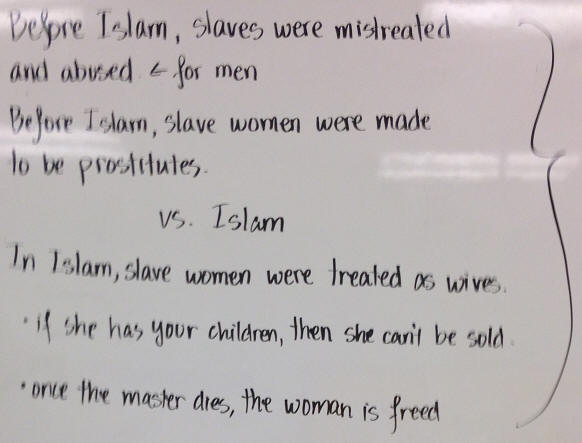

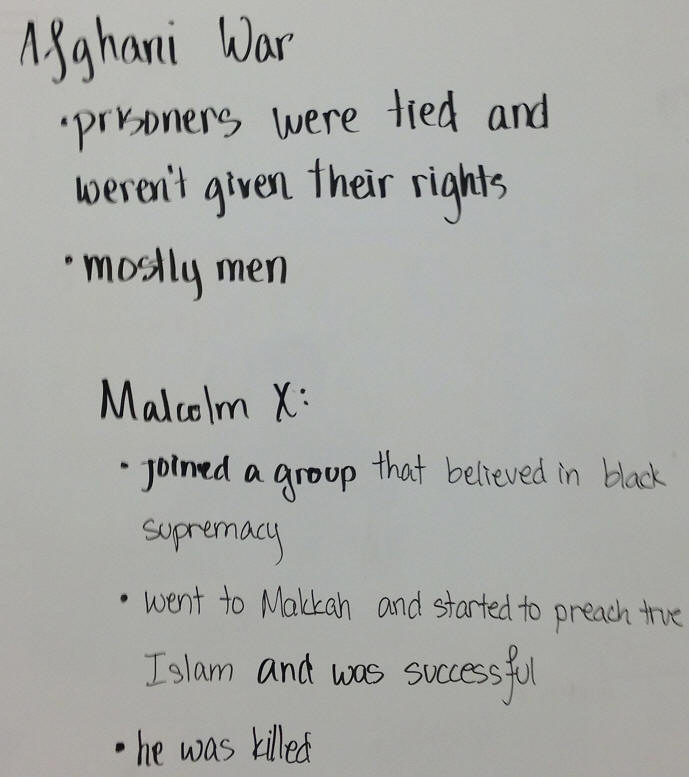
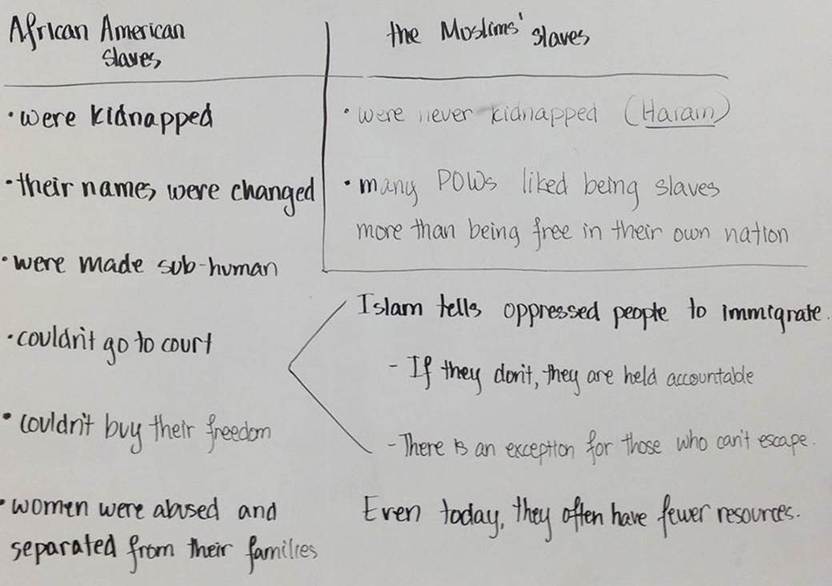
Lesson [21]: Reply to “Islam is not an American Religion and Mohamed ﷺ is not an American Name”
Defending Islam against Stereotypes.

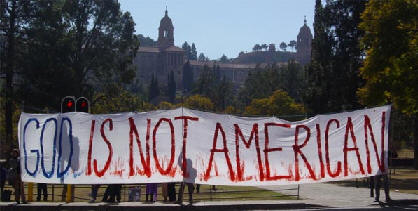
Click here to watch the video
recording of the class.
OR Click here to listen to the audio
recording of the class.
OR Click here to read the notes.
· Introductory videos
a. The Secret History of
Muslims in the U.S. https://youtu.be/dPYIdfYfEKM,
b. How the autobiography of
a Muslim slave is challenging an American narrative https://youtu.be/EBQelGvwkhE
Homework:
Listen to the audio recording or watch the video
recording of the class, read the notes, and answer the following questions
thoroughly. Short answers are not accepted. You must email me the homework
via email hw@zeiny.net
1. What were the birth area of the three religions?
Is Islam the only religion imported from the middle east?
2. Mohamed ﷺ is not a Christian name but it is ….
3. In case of differences between Muslim American
and racist Non-Muslim Americans, the Non-Muslims say go back to your country.
How do you reply to that?
· I am in ….
4. Immigrant Muslims accepted to be American
citizens (naturalized)
· When they were sworn
as US Citizens, they were….. while being aware of it.
US born……. citizens …….
5. In a case of differences between main stream
Americans, they do not say to each other go back to your country. Why? Do they
respect each other’s opinion?
· They ….. go back to your country.
· They don’t say that
because ….
· In fact, the true
Americans are the …..
6. Why love it or leave it is not American? What is
the American culture?
7. You are either with us or with the terrorists
(Bush). You are either with us or you are hypocrite (bin Laden). Reply to both
statements.
8. What is the difference between propaganda and
journalism (decent media).
9. The main stream American media insults the
intellectuals because
…..
10. Natural differences between us …...
11. Allah ﷻ judges us for what
we choose to be not what he chose for us. Explain.
12. Are we democratic or constitutional republic?
Explain the difference between both with examples.
13. What is the American personality? What is the
Islamic personality? Are they against each other or can coexist?
· Islamic personality is ….
· American personality ….
· They both can .. All
over the history, Christians lived fine in a Muslim land, and the other way
around. Muslim …men can marry …. Quran (5:5).
14. Explain how the American personality and the
Islamic personality can work together using the concept of pollution.
· Noise pollution……..
15. Immigrants are being tested but American born
were not tested. Explain this argument. This argument is a reply to what? You
may use the example of the free pens given in a medical conference.
16. We don’t want Sharia. We want to ban Sharia
laws. Explain who said that and how do you reply to them.
17. If the law of the land prohibits Muslims from
praying, fasting, pay Zakah or go to Haj, what do Muslims do then?
Board Pictures (1):
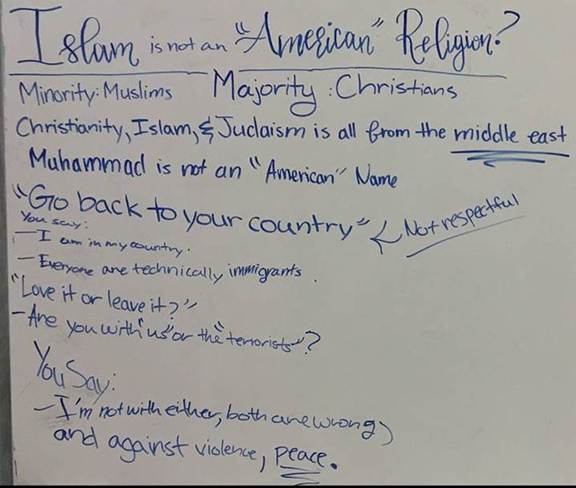
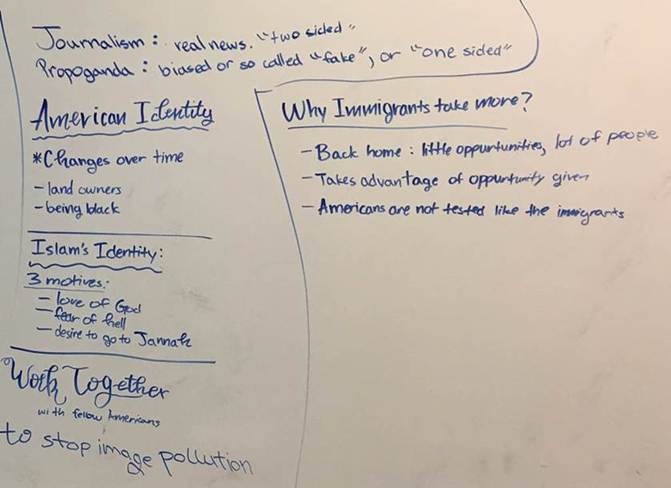
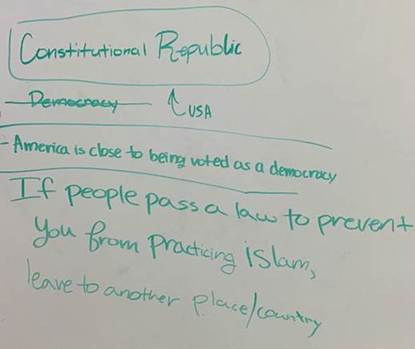
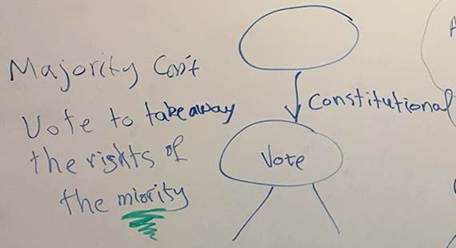
Board Pictures (2):
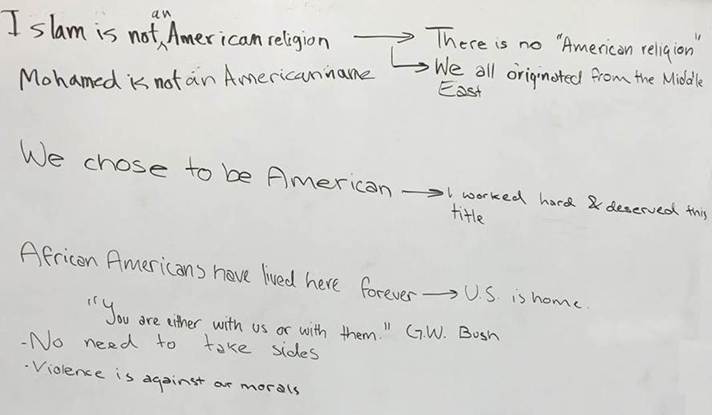
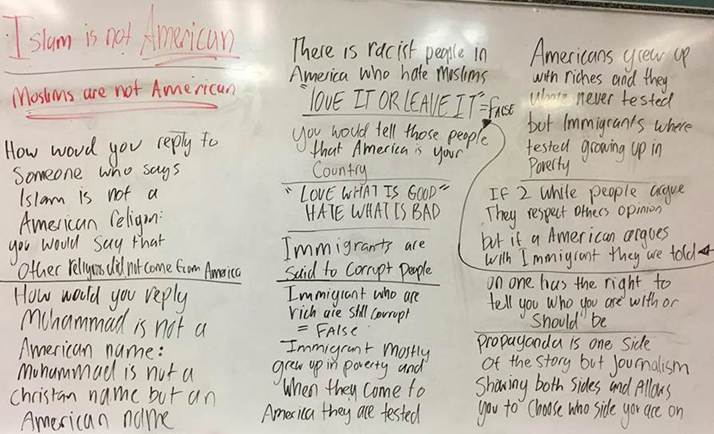
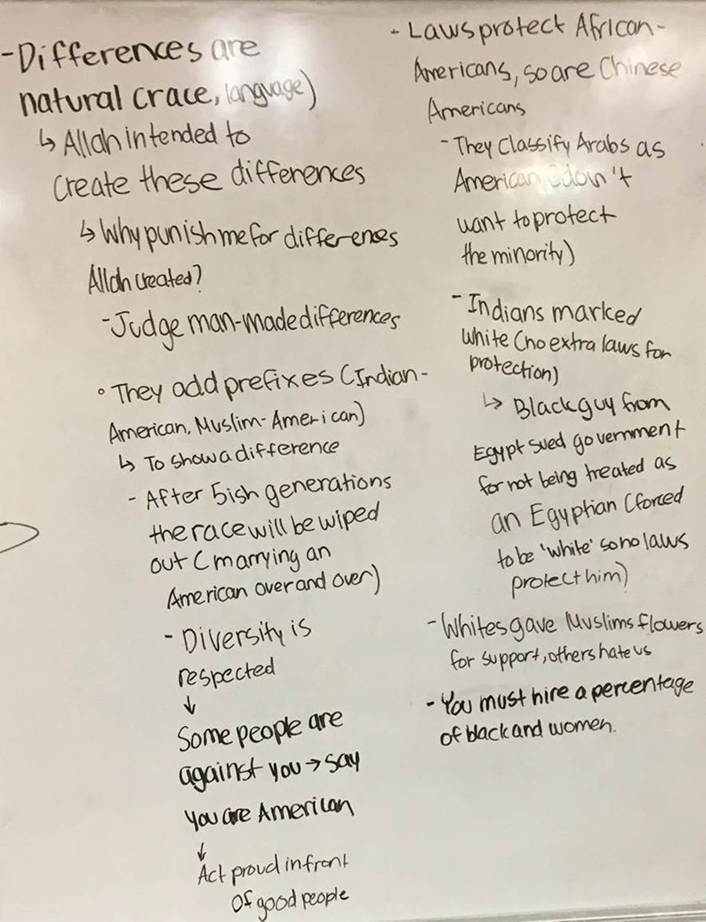
Lesson [22]: Reply to: “Islam is not civilized religion. Muslims are not civilized people” - [Part I] Analysis of the World’s Modern Civilization – The Book ‘Out of Control – Global Turmoil’.
Are
we Civilized todays?
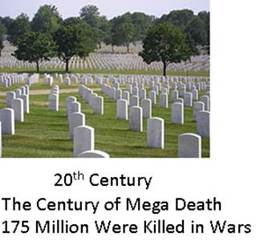
Click here to watch the video
recording of the class.
OR
Click here to listen to the audio recording of the class.
OR
Click here for the written notes.
Homework:
Listen to the audio recording or watch the video recording of the
class, read the notes, and answer the following questions thoroughly. Short
answers are not accepted. You must email me the homework via email hw@zeiny.net
v Regarding the century of
mega death:
1. Describe five of the most amazing technology we have available to
us today.
2. Describe why the previous century was called the
century of mega death. Briefly summarize the number of people who were killed
and the event that cause their death. How much is the total?
3. How long communism lived and how many lives it took?
4. What is the meaning of “total war”? Who started and who continued
doing it?
5. What is the meaning of the technology of death?
6. What is the cause of this mega death?
7. The weapons we have today, how many times they can destroy the
world?
8. Who controls the technology of death?
9. Why did not the wars in the past consume even a small fraction of
what were killed in the past century?
10. Describe the
similarity between a person playing video games and a pilot bombing a city?
11. What is carpet
bombing?
v Regarding inequality of
the distribution of wealth and power See this video:
1. Describe the global inequality? Compare the
wealth of minority to the wealth of majority? Give numbers.
2. Describe the local inequality in the
distribution of wealth in the U.S. Give numbers.
3. Describe the global inequality in the
distribution of wealth in the world. Give numbers.
4. What was the ratio of the average income of a
person in the poor world and the rich world in the eighties and nineties? Is
the ratio growing or declining? Use the data published by the United Nations
human development reports.
v Regarding Hollywood and
the entertainment industry:
1. Describe how the television affects the growing mind of the young
kids in terms of values, what is right and what is wrong.
2. Mention the data from Nielsen Media Service regarding the hours
spent watching television for different kind of people.
3. Why is many of the movies have lots of profanity, brutality,
violence and vulgarity? What is the motive behind this?
4. How much is the total export hours of U.S. movies and media as
compared to the rest of the world?
5. How many countries imported the television series “Dynasty” and
“Dallas”? How bad are they?
6. What are the American movies teaching people of other nations
about the United States?
7. What are the problems resulting from the characteristics of the
current movies and series?
8. Many poor people feel miserable when they see the luxury of the
rich. What makes this factor worse today than the past?
v Your Judgment:
In your opinion what do you think about the
current civilization? What do you think about the technology versus the
civilization? Can be civilized poor people with no technology? Can be
uncivilized rich people with marvelous technology?
Lesson [23]: Reply to: Islam Is Not Civilized Religion - Muslims Are Not Civilized People - [Part II] Criteria to Measure Civilization.

Click here to watch the video
recording of the class
Click here to listen to the audio recording of the class
OR
Click here for the written notes.
Homework:
Listen to the audio recording or watch the video recording of the
class, read the notes, and answer the following questions thoroughly. Short
answers are not accepted.
The following is the Islamic criteria to judge civilizations. In
600 words or more, talk about each criterion and explaining why is it an
important criterion and how does it affect civilization.
1. Highest Value of the society.
2. Source of Legislation.
3. Role of women.
4. Building Unit of the Society.
5. Bases of Unity.
6. Inequalities.
· Your
Judgment
In your opinion what do you think about the
current civilization?
Board
Notes:
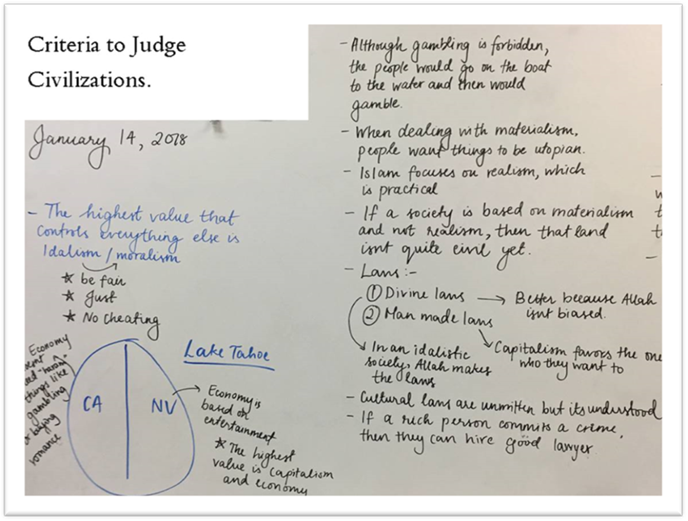
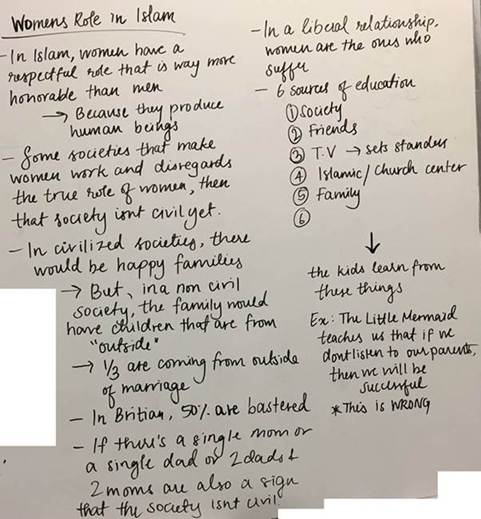
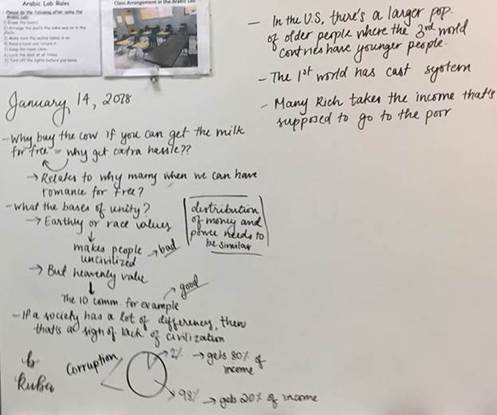
Previous
year Board Notes:
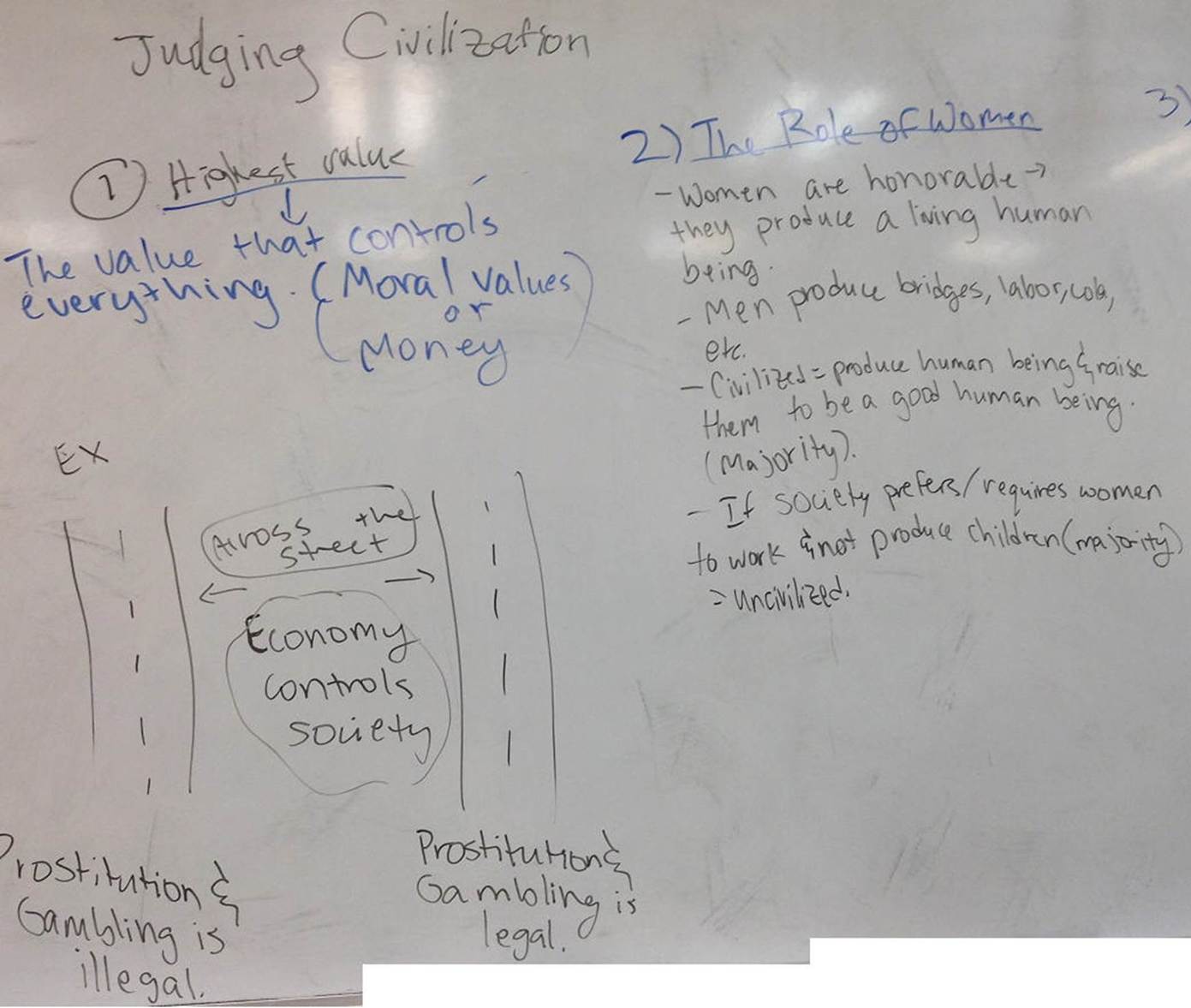
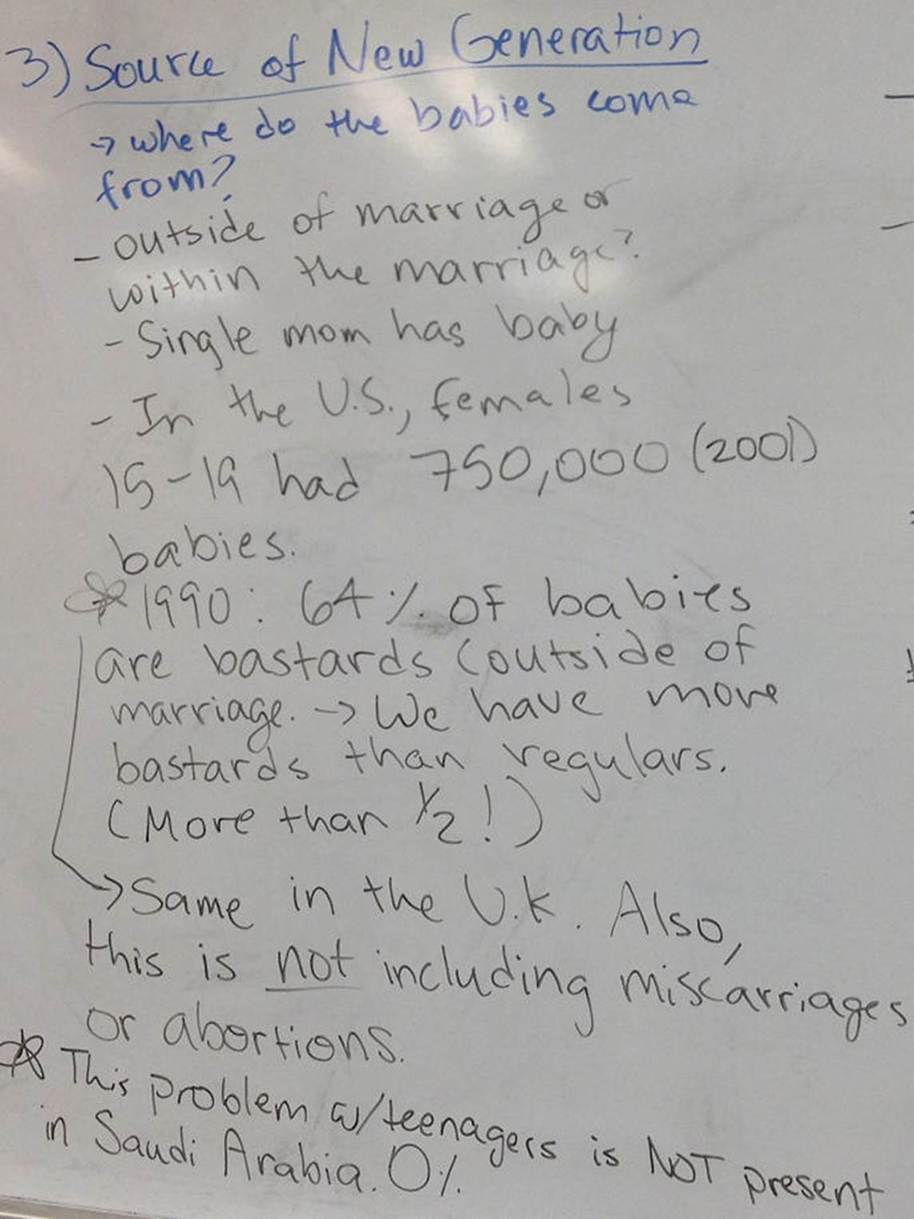
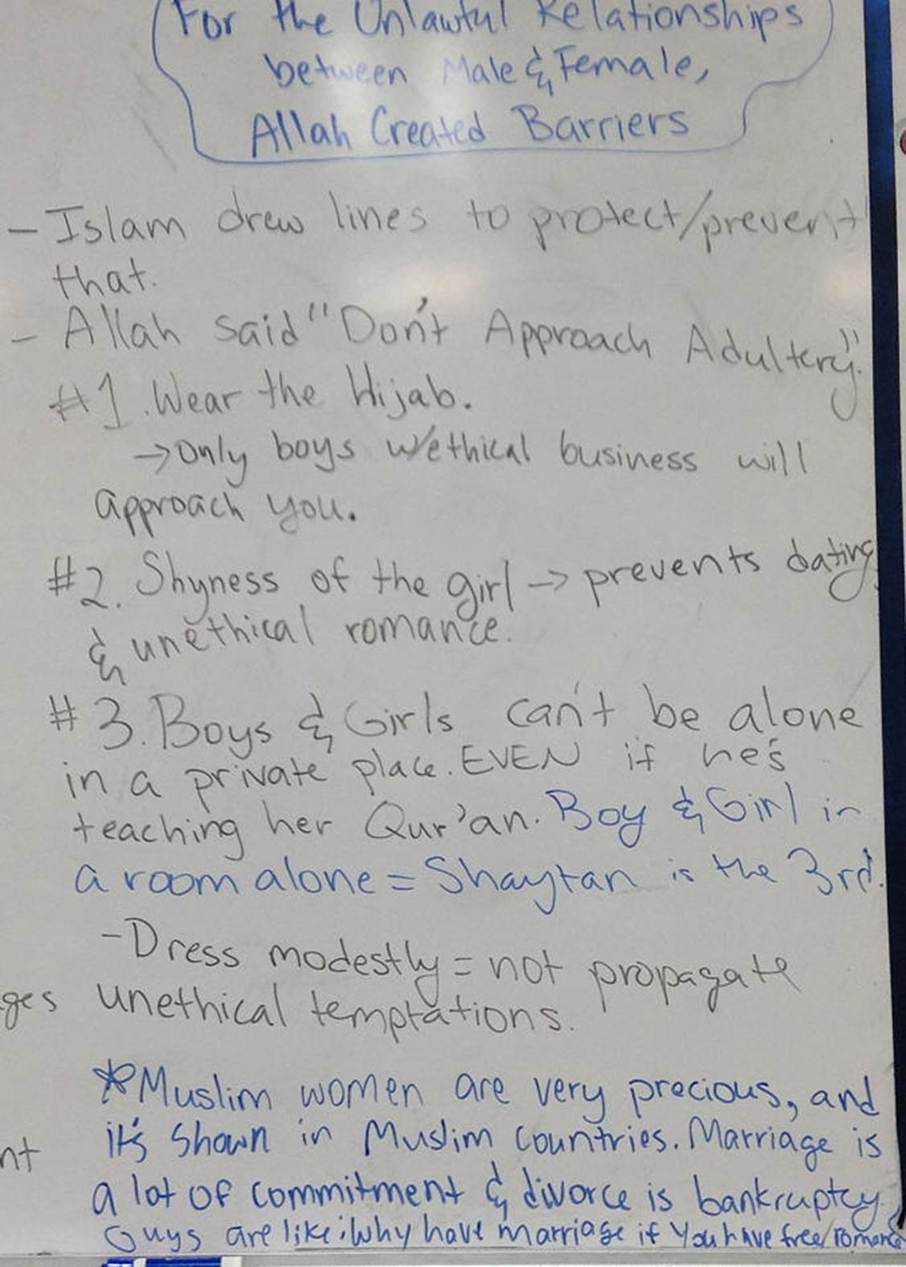
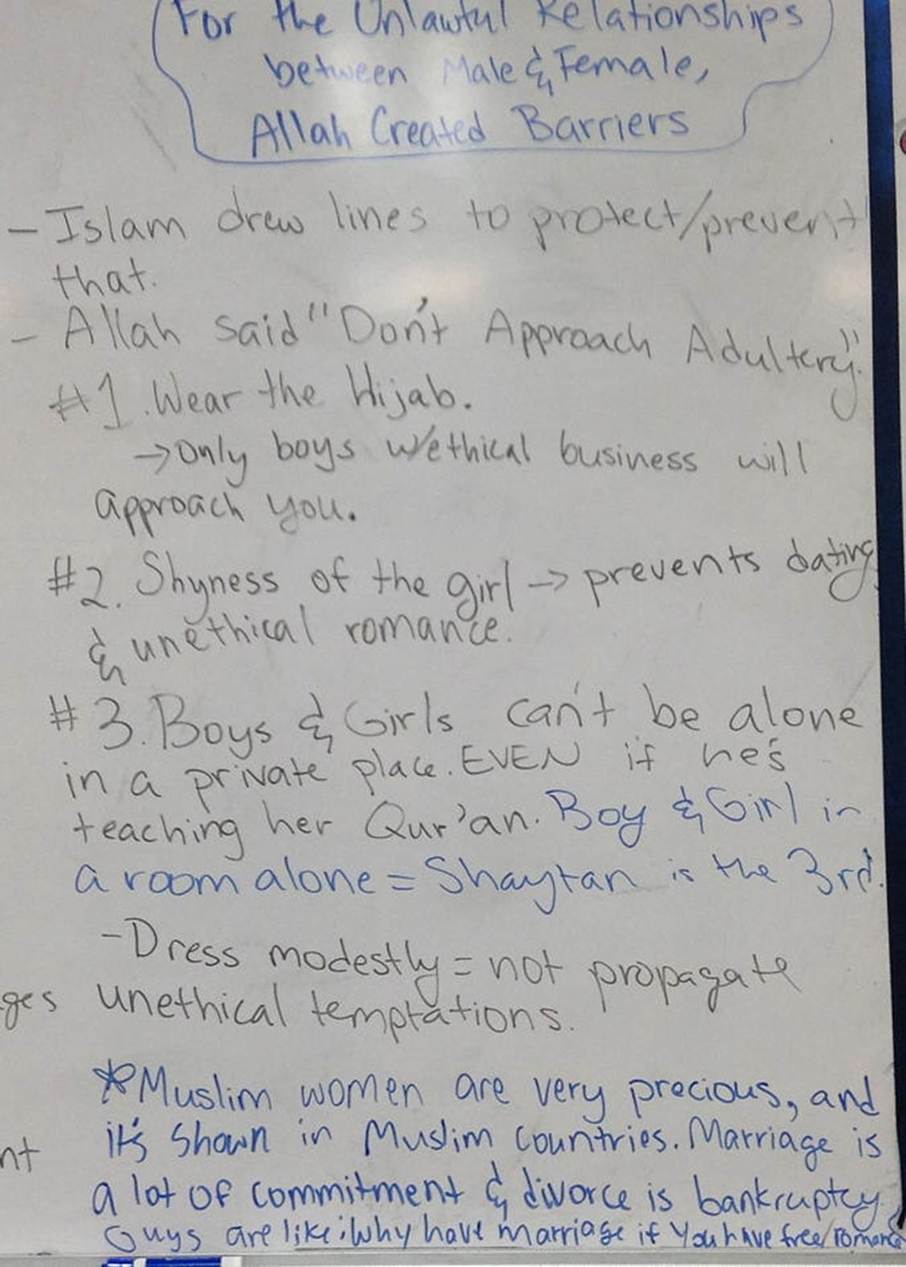
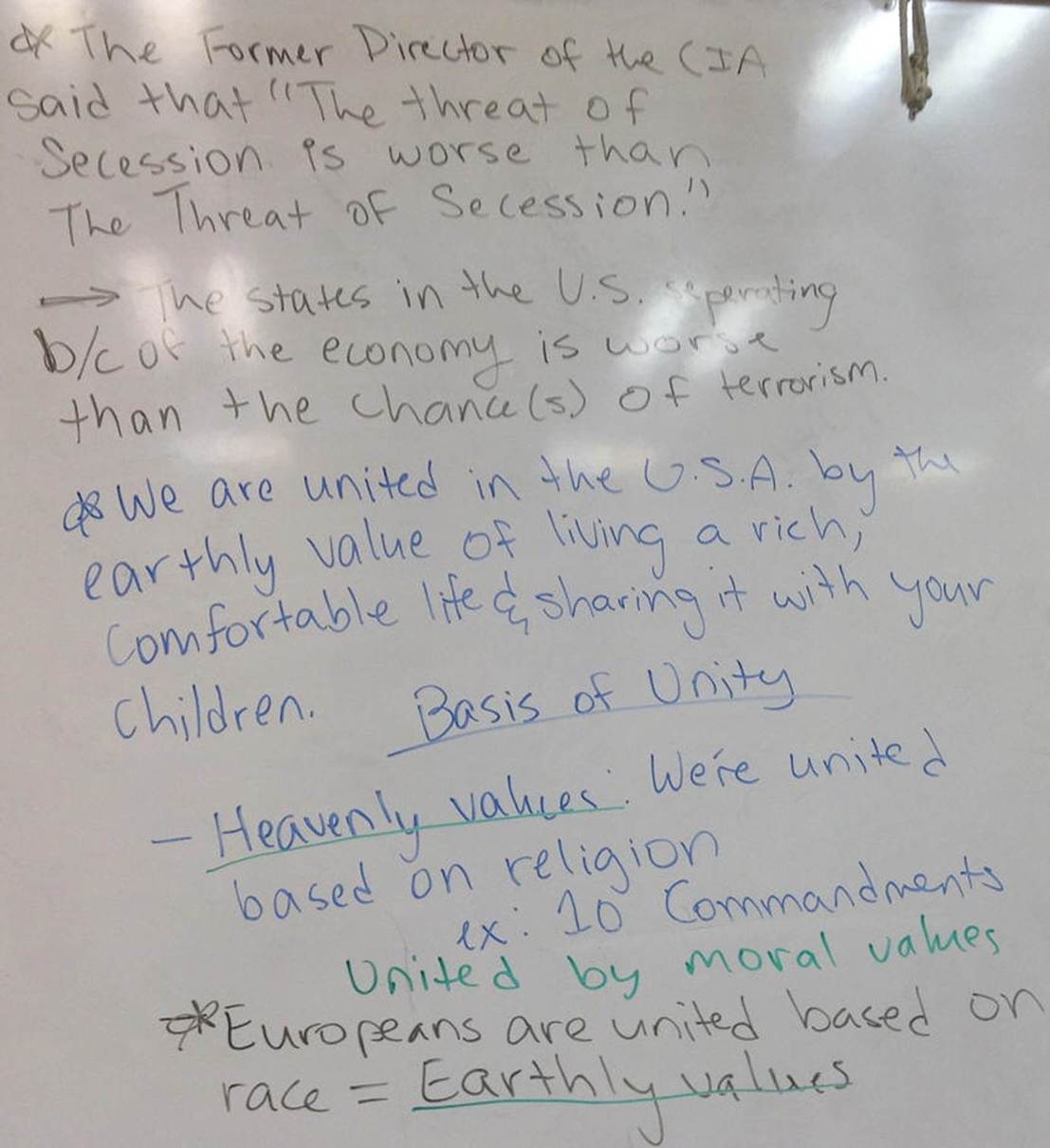
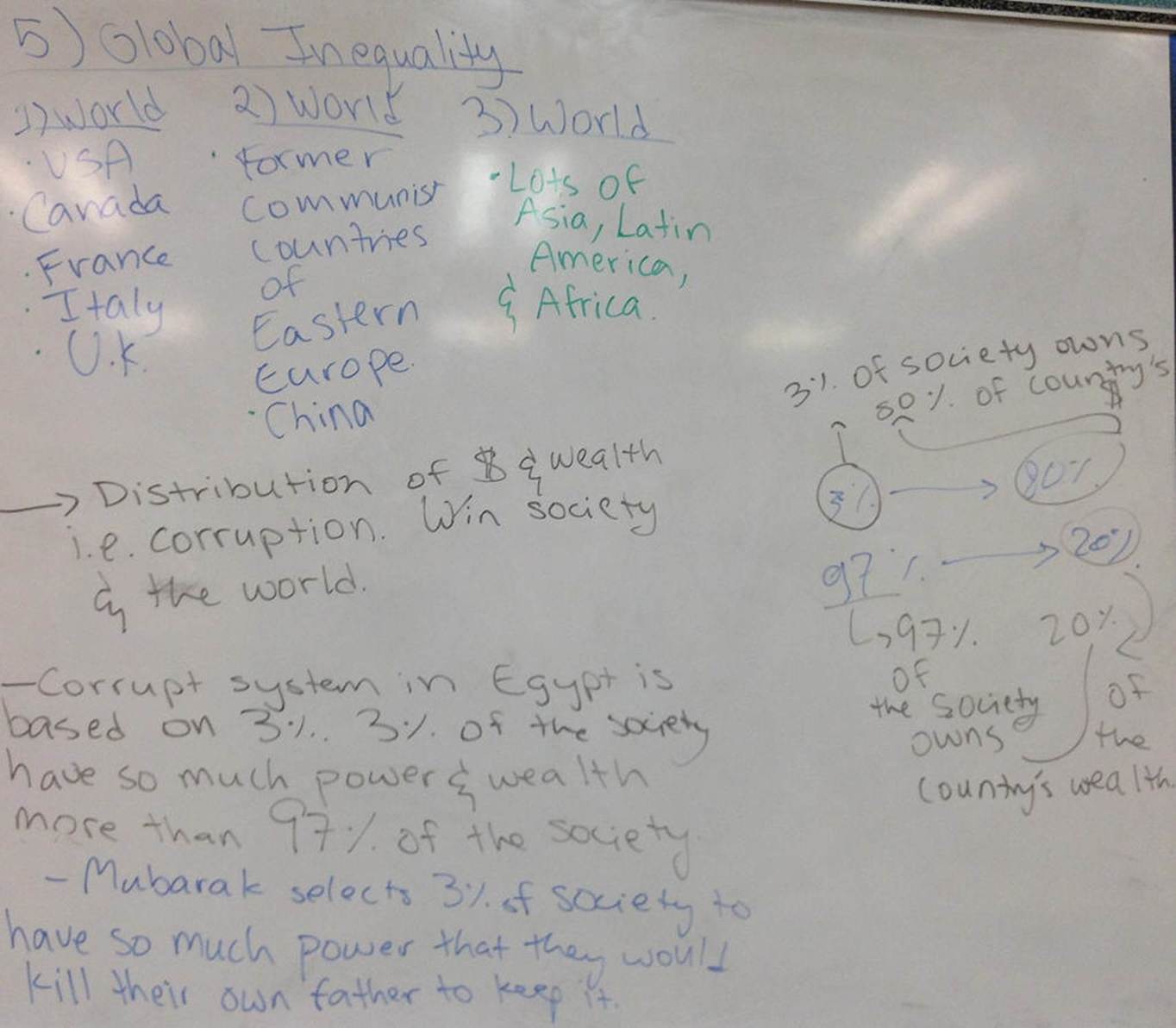
Lesson [24]: Scientific Miracles of the Holy Quran.
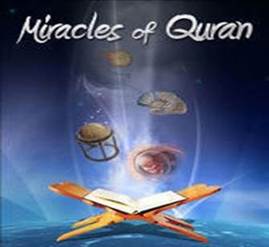
(Optional) Click here to Watch the video of the class
OR
(Optional) Click
here to listen to the class.
OR
(Main
source) Click here
for the Scientific Miracles of the Quran Web Site.
Homework:
· For homework Part A click
here
· For homework Part B click
here
· For homework Part C click
here
Lesson [25]: Why We are being Tested - The Wisdom of Fitnah and Trials for The Believer.

· (Optional) Listen to this lecturer about Fitnah by Sheikh Dr. Yasir Qadhi
·
(Optional) 3 major tests in the Donya (world)
·
(Optional) Why Allah is testing us
· Click here to watch the video recording of the class
· OR Click here to listen to the audio recording of the class
· OR Click here for the written notes.
Homework:
Listen to the audio recording or watch the video
recording of the class, read the notes, and fill in the blanks.
1. Linguistic Meaning of
the word Fitnah:
a. …..
b. The gold smith is called ….
2. Not only we want to be
tested, but we are looking for harder tests:
a. Dead people …., which is a harder test
b. People who don’t have freedom ….. is a
harder test. With freedom comes …..
c. Poor people ….., which is a harder test.
d. Powerless people ….. With power comes ….. Power increases the circle of …..
3. Reasons for Fitnahs (tests and trials)
a. [Ankabot 29:2-4] …..
b. We all know how to say … and read ….
c. Identification ….on the edge [Haj 22:11]
d. Allah ﷻ doesn’t like
evil but he likes …… evil. Allah ﷻ doesn’t like Fasad [Baqara 2 :205]…..
e. People have different levels of faith…..
sort them.
f. Source of …… sins.
g. Raise the ranks …..
h. How do you if a fitnah is a relief or a curse? …..
i. Allah ﷻ tests you
because he ….. voice praying to him for …...
j. The result of the Fitnah
will prove to the slave that he deserves …..en. No F grade without …..
k. Love of Allah ﷻ. Prophets have the …..
Fitnahs, followed by the ….., followed by the less ….,
… The best has . tests than the ….
4. Types of Fitnah
a. Testing us against …. [Forqan 25:20]…..
b. Tests on different levels …...
c. Tests for Muslims is in …….Rat race for
the money. You will be destroyed.
d. Test of money. ….. [Qasas 28:76-83]……
e. Tests of the children of Israel are …..
f. Tests of submission …….
g. Social Media is a …., video games …...
h. Fitnah of being a …..
i. The test of….. .things [Anbia 21:35]…..
j. Soliman and horses. [Sad 38:31-33]……
k. The worst kind of Fitnah is the Fitnah of the …..,
i.e., the …... Happens at the end of time but it exists in a less serious
fashion at all times.
l. Fear, hunger, shortage ….. [Baqara 2:155-157]…..
5. Results of Fitnah:
a. …. heart.
b. …. stronger
c. The one who accepts the
fitnah, …..
d. Reward to the …. ones. The reward level is proportional to ….. level.
e. Waiting for the relief
with …..is the among the best ….
f. Increase the …. against
…. Fitnah.
6. More facts about Fitnah:
a. The Prophet ﷺ predicted that this ….. will be …..
b. Hadith in Muslim. It is an obligation on every Prophet to worn his
followers from …... My Umah will be tested so much at the …. and will be less
tested in...
c. Never Ask Allah ﷻ for …... Always
pray for …...
d. Also, always pray for protection against …..
such as the ….. of a loved one.
e. Don’t test yourself and run away from ……….the
lion.
f. You might not be looking
for Fitnah, but it …….
g. Seek ways to prevent
Fitnah. ……….. is a protection from Fitnah.
h. The Prophet ﷺ said that worshiping Allah ﷻ during the time of Fitnah is like ….. See the ….. suffering hardships
around the world. Praying is very difficult to them.
i. We should increase our
…. of Allah ﷻ (ﷻ). A fitnah is meant to make us …. During times of fitnah, we
should increase …., our …. prayers, our …, our recitation of the …, and we
should race with one another in doing ….…
j. The Fitnah is even worse
than ….. [Baqara, 2:191], i.e., to cause Fitnah to someone to leave his
religion is worse …..
k. According to the hadith,
a time will come when a person will go to sleep as a …. and wake up as a …. or
wake up as a …. and go to sleep as a ….. Why? The
reason is that he will sell his own ….. for the price
of this …..
Lesson [26]: Hadeeth of Intentions. You must have a sincere intention to Allah ﷻ
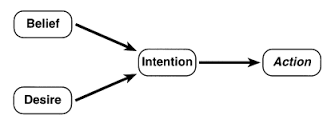
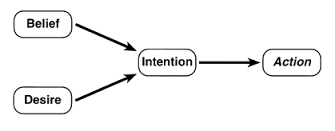
· Click here to watch the video
recording of the class
OR Click here to listen to the audio
recording of the class
· The following videos are recommended.
Hadith collections https://youtu.be/I0unMjJ7S0I
Hadith of Intentions https://youtu.be/QnFB4o0F8xU
Story about intentions. A man constructed his
new house. https://youtu.be/VVbn381-_ak
Homework:
Listen to the audio recording or watch the video
recording of the class, read the notes, and answer the following questions
thoroughly. Short answers are not accepted.
1. Explain why the
intention's hadeeth is 1/3 of Islam that the other 2/3 are no good without.
2. Similarity of hearts:
How come Allah ﷻ blamed the Jews who fought Prophet
Mohamed ﷺ for the mistakes of their predecessors?
How is that fair?
3. Many people have evil
intentions. Would Allah ﷻ allow all of them to do what they
intended? Why or why not.
4. Why The intention of the
believer is better than his/her deeds and the deeds of the hypocrite are better than
his/her intentions
5. If you pray Fajr every
day and one day you are sick. Would Allah ﷻ count the sick day as prayer in the
Masjid?
6. You don’t pray Fajr in
the Masjid when you are not sick, then do you get rewarded for praying in the
Masjid when you get sick?
7. Why would Allah ﷻ send believer to Jannah for everlasting life when they
have worshiped Allah ﷻ for a limited time period?
8. Why would Allah ﷻ send bad guys to hell for everlasting life when they
have disobeyed Allah ﷻ for a limited time period?
9. What do you say if
someone gives you a compliment?
10. Are we allowed to judge
the intentions of others? Why or why not. Mention the story of the
companion who killed a pagan guy after he said Shihada.
11.Do Angels know the intention and write it
down?
12.Explain the story of the Shytan and the
righteous slave who wanted to cut a pagan tree.
13.What if someone wanted to do a good deed then
he changed his mind? Explain.
14.What if someone wanted to do a bad deed and
then changed his mind for the following reasons
(a) Fear of Allah ﷻ. (b) Not good for health.
15.What if someone wanted to do a bad deed in Makkah
and then changed his mind because it is not good for his health.
16.Situations where we are not judged for what
we do. Are we judged for mistakes, for forgotten, and for innocent errors?
17.Explain the rule of combining intentions. If
someone intends to go to the Masjid to pray and to buy milk on the way back, is
this a sincere intention or a bad intention?
18.Can someone intend to go to the Masjid to
pray and to show off?
19.Can we combine two good intentions in the
same deed?
20.Can we combine bad intentions with good
intentions in the same deeds? explain.
21.Guarding the intention. The intention can be
spoiled before the deed, during the deed or after the deed. Give examples.
22.Explain the following rules of combining
intentions. For examples, going to the Masjid to show off and pray, or going to
the Masjid to pray and eat food offered in the Masjid. B+G=? G+G+B+G=?
B+G+G+G=? If you know the Hadith that proves your answer, then mention it.
23.Explain the following statement “never regret
a good deed that you did in the past”. Why?
24.Which intention governs, before, during
after?
|
Before Deed |
During Deed |
After Deed |
Final Results |
|
Good |
Good |
Good |
? |
|
Good |
Good |
Bad |
? |
|
Good |
Bad |
Good |
? |
|
Bad |
Good |
Good |
? |
|
Bad |
Bad |
Good |
? |
|
Bad |
Good |
Bad |
? |
|
Good |
Bad |
Bad |
? |
|
Bad |
Bad |
Bad |
? |
Lesson [27]: Sunah and Bida’a (Innovations) - Legal and Illegal Changes.
 \
\
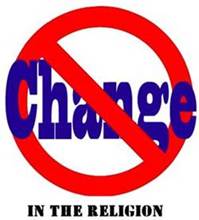
· Click here to watch the video
recording of the class
OR Click here to listen to the audio
recording of the class
· Click here for the written notes.
Homework:
Listen to the audio recording or watch the video
recording of the class, read the notes, and answer the following questions
thoroughly. Short answers are not accepted. You must email me the homework
via email hw@zeiny.net
1. The meaning of the word
Bid3a
a. What is the meaning of
the word Bid3a in Islam.
b. Can I put my hands
behind my neck during the prayer? Why?
c. Can I go to the Masjid
driving a car instead of riding a camel or horse? Why?
d. Can I pay my Zakah using
a check instead of cash? Why?
2. Pure sources of Islam
a. Why did Allah ﷻﷻ select the Arabs to establish his religion? Why did he
select illiterate Prophet ﷺ breaching to illiterate society in
the middle of the deserts of Arabia?
b. Why didn’t Allah ﷻﷻ select the Roman society to carry and deliver the message
of Islam?
c. Why didn’t Allah ﷻﷻ select the Jews of Arabia to carry and deliver the message
of Islam?
3. Mixing Islam with
Philosophy.
a. Can Allah ﷻﷻ create a rock that he can’t carry? What is the proper
answer to this question?
b. Who brought in the
philosophy to the Muslim world and what was his intentions?
c. What is the concept of
Unity of Existence defined by Ibn Arabi?
4. The Bid3as of the
Mo3tazila’s deviant group
a. Mention the Bid3as of
the Mo3tazila’s group.
b. Imam Ahmed Ibn Hunbal
define Quran as?
c. What is wrong in saying
the Quran was created?
d. Who is the Mo3tazila group? What did they do to make
themselves different than the rest of the Muslims? What was the conflict
between Imam Ahmed Ibn Hunbal and them?
e. What was the conflict
between Imam Ahmed Ibn Hunbal and the Mo3tazila group regarding the Quran? Why
was it so important to stop these clowns from messing with the Quran or the
names of Allah ﷻﷻ?
f. For what purpose Imam
Ahmed Ibn Hunbal was tortured beyond imagination for years? They tried to force
him to admit what?
g. What was the argument of
Imam Ahmed Ibn Hunbal against raising the issues of the Quran is the creation
of Allah ﷻﷻ, Allah ﷻﷻ has hands, Allah ﷻﷻ's
eyes, Allah ﷻﷻ hears, Allah ﷻﷻ sees,
Allah ﷻﷻ's rose over the throne, Allah ﷻﷻ established himself on the throne,
...etc? Do we need to discuss these issues?
h. What did Imam Ahmed Ibn
Hunbal define Quran as?
i. What is wrong in saying
the Quran was created?
j. Who is Ummar Ibn Yasir
and what happened to him?
k. About the scholars who didn’t
stand up with Imam and defend the Islamic theology against Mo3tazila’s
ideology, Ahmed, what was their excuse and why did Imam Ahmed reject it?
5. What are the four
Meanings of the word Sunnah in the Islamic terminology.
6. Bid3a divide the
Believers
a. How does Bid3a divide
the Muslims? How did it divide the Christian faith?
b. What are the differences
between Shia Islam and Sunny Islam? What is the name of the battle that was
behind this division? What caused this war and what was the outcomes?
c. Does Shia Islam have the
same Quran, six pillars of faith and five pillars of worship?
Pictures of the Board:
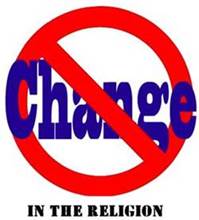
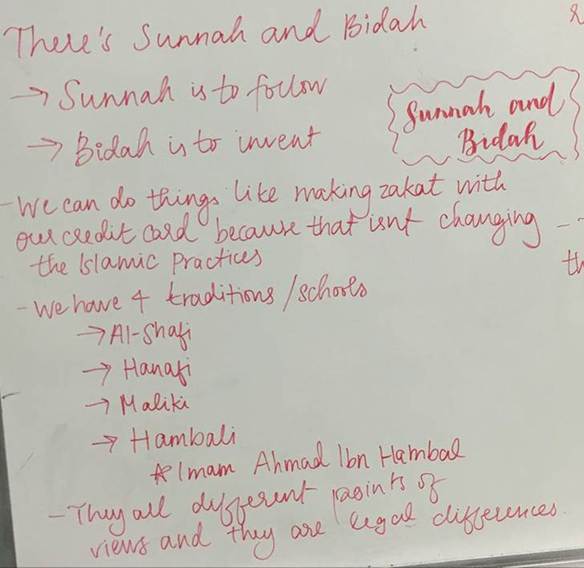
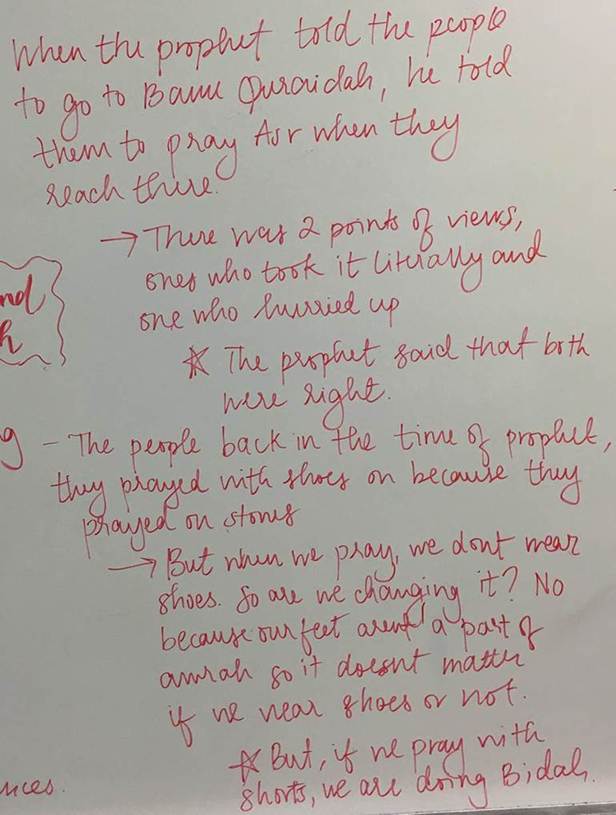
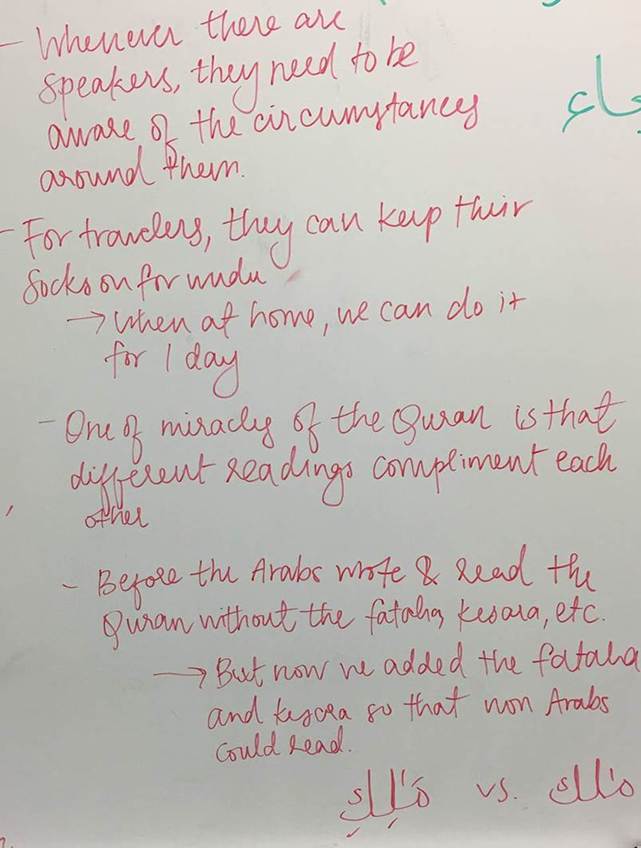
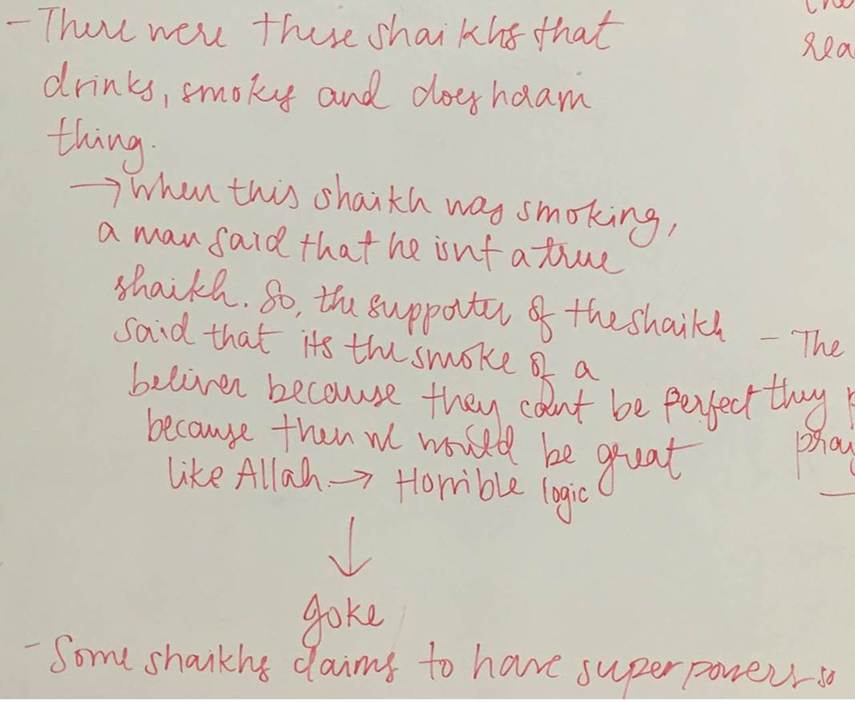
Lesson [28]: Enjoin Good and Forbid Evil - Speaking Truth to Power
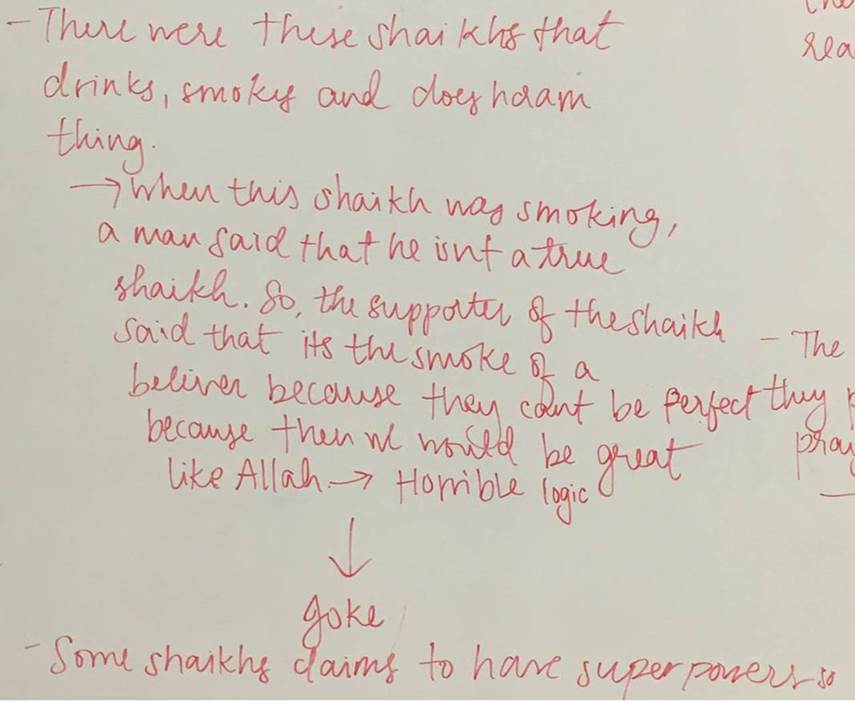
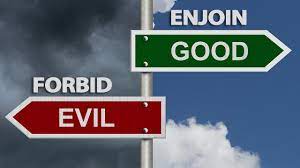
· Click here to watch the video recording of the class
OR Click here
to listen to the audio recording of the class
· Speak Truth to Power by Dr./Imam Yasir
Qadhi https://youtu.be/X6f0KXg3s9I Time 1:25 to 12:30
· Click
here for the written notes.
Homework:
Listen to the audio recording or watch the video
recording of the class, read the notes, and answer the following questions
thoroughly. Short answers are not accepted. You must email me the homework
via email hw@zeiny.net
1. Who is the best Martyr
in Islam and who is the next best, in relation to speak truth to power?
2. Briefly talk about the
following three people who spoke truth to power. What was the story and how did
it end? Malcom X, Martin Luther King and Nelson Mandela.
3. About the Islamic
concept of enjoining the good and forbidding the evil,
a. Is it mandatory or
choice? Quote the evidence from the Quran [3:104]
b. What made the Muslim
Ummah the best Ummah? Quran [3:110]
4. About the Hadith where
the Prophet ﷺ said “Whomsoever among you sees an evil,
then let him/her change it by ….., then ….., then…..“
a. Mention the Hadith and
what is the basic message of the Hadith.
b. Is the use of hands to combat
evil open to anyone? Who can use the hands to stop evil?
c. Which method that has
been always used by the Prophets?
5. About the Hadith where
the Prophet ﷺ was describing to his companions that his Ummah would
abandon the obligation of enjoining the good and forbidding the evil, and does
the exact opposite.
a. Mention the Hadith and
what is the basic message of the Hadith.
6. About the question “does
the punishment from Allah ﷻ due to committing an evil act, restricted
only to the wrong doers or that everyone would suffer, whether wrong doers,
victims, witnesses, etc.
a. Do we all get punished,
or only the wrong doers among us?
b. Use the illustrative
metaphor of different people traveling in the same ship, to illustrate what
would happen if people would stop enjoin good and forbid evil among themselves.
c. Quote the evidence from the Quran that punishment coming from
Allah ﷻ resulting from committing an evil act
is not restricted only to the wrong doers. Surat Al-Anfal (8:25)
d. Mention and explain the
Hadith about when Allah ﷻ sent angel Jibril to destroy a wicked
town that had a righteous person (not a reformer) living in it. Would the same
happen if that person was a reformer.
Lesson [29]: The Hadeeth Collections: Hadeeth of Intentions Part I:
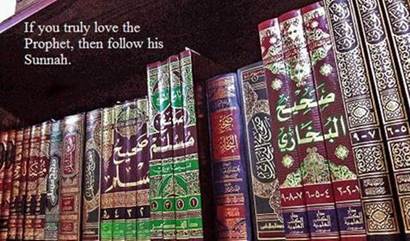
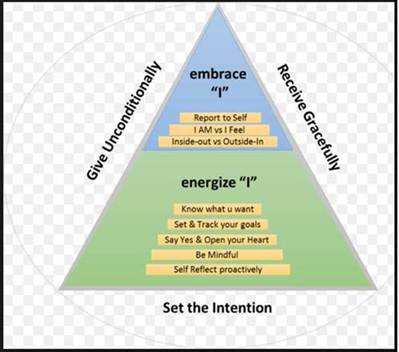
Click
here to listen to the class.
Homework:
Listen to the audio recording or watch the video
recording of the class, read the notes, and answer the following questions
thoroughly. Short answers are not accepted. Send me the homework via
email hw@zeiny.net
1. Were the Sunnah / Ahadeeth of the Prophet ﷺ written when he
was alive? Why?
2. Talk about the life of
Imam Bukhari. You can use this link or your own sources.
3. Explain how Imam Bukhari
authenticated the Ahadeeth of the Prophet ﷺ?
Mention the example of the person who cheated the camel?
4. What is the Hadith of
intention? Explain the Hadith and mention the story of the guy who wanted to
marry Um Qays.
5. Mention the two jokes
mentioned in the class regarding intentions?
6. If forty people who did
not know each other narrated one Hadeeth, would it be accepted as authentic?
Explain.
7. What is the order of the
Hadith of intention in the book of Imam Bukhari?
8. Explain why the
intention's hadeeth is 1/3 of Islam that the other 2/3 are no good without.
9. Explain how one is
rewarded for a deed and the other one is punished for the same exact deed. What
is the difference between them that caused one to be rewarded and the other to
be punished?
10.Do angels know the intentions? What do they
record?
11.Explain the Hadeeth of the four categories of
people. Relate them to the intentions.
Board
Notes:
(optional) You may also use the following
document as a reference.
The HADITH - How it was Collected and Compiled.
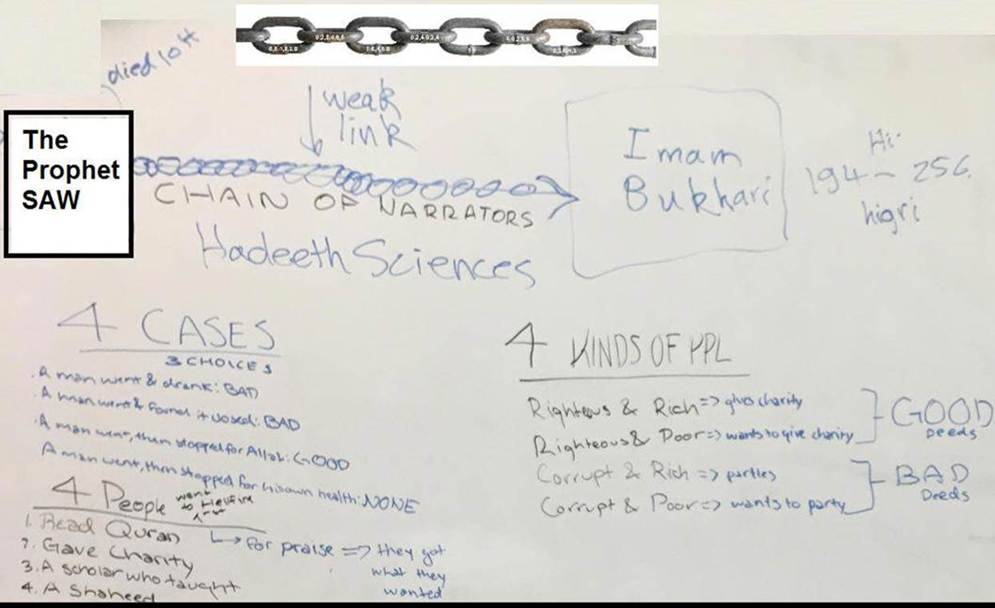
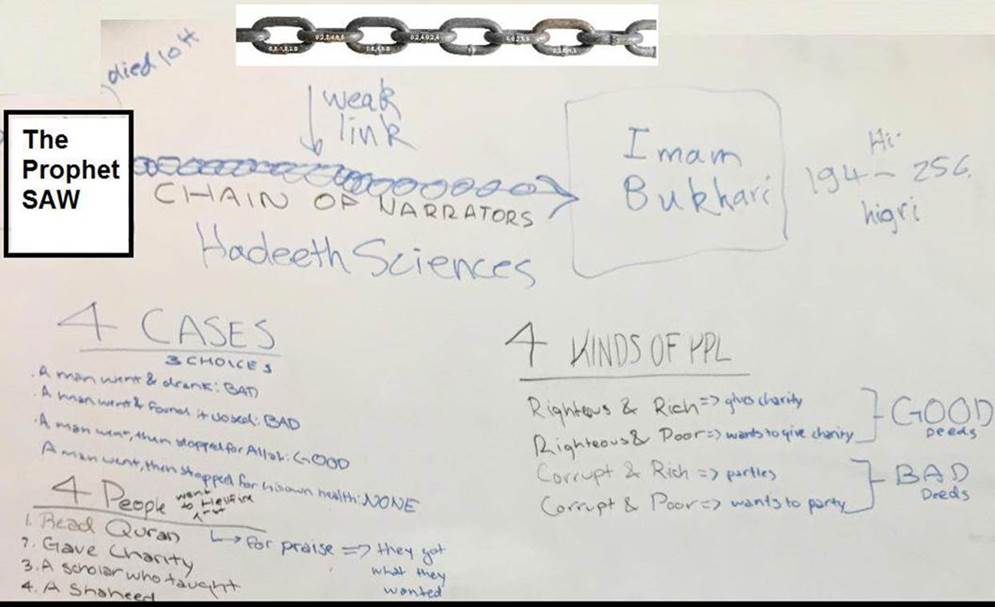
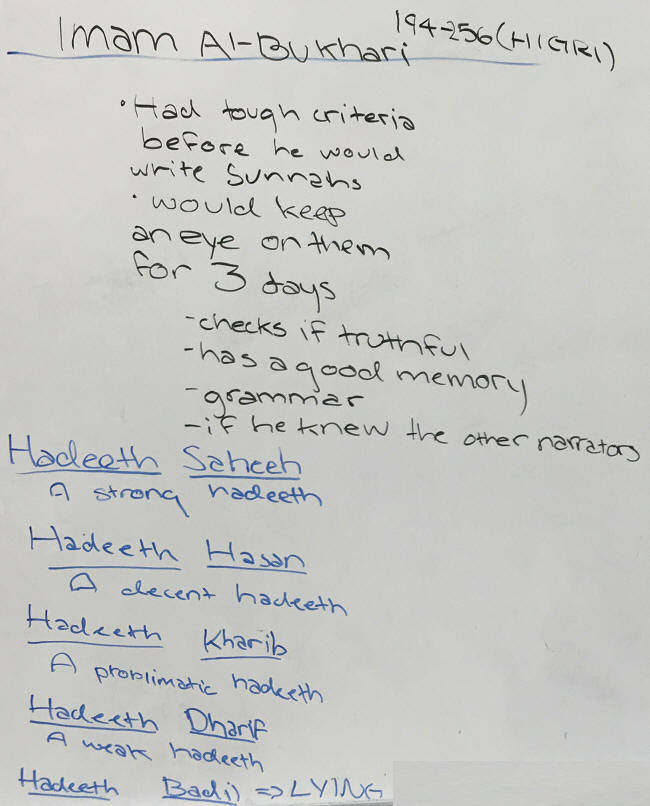
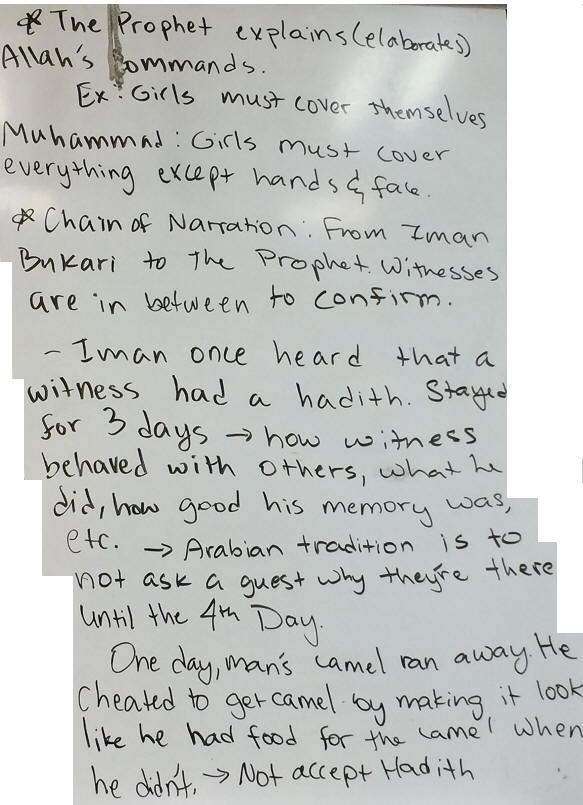
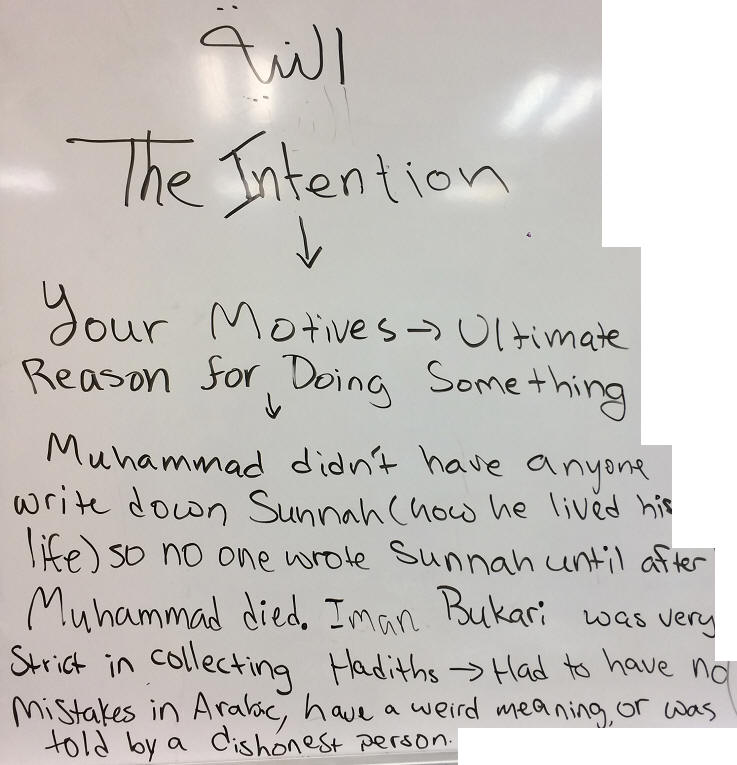
Lesson [30]: Doing Business with Allah ﷻ

Click here to listen to the class.
Homework:
Listen to the class and read the notes, and then
in no less that 600 words Answer the following
questions. Short answers are not accepted. Send me the homework via email hw@zeiny.net
1. Explain how did Allah ﷻ give you the blessings of body and money without
charging you any money and then he is asking you to give back to him from that
which he gave to you for free.
2. Hasan Al-Basry was once
asked why people hate death so much, what was his answer?
3. What happened if you are
deported to a land that you have no assets or money invested in this land?
Compare this when we are deported by the angel of death.
4. Give five examples of
how to do business with Allah ﷻ.
5. How is doing business
with Allah ﷻ different than doing earthly business
with others?
6. Did Allah ﷻ
ask us to loan him money? Explain.
7. Mention the story of the
Sahabi and his garden.
8. The Prophet ﷺ sweared by Allah ﷻ that the charity
doesn't decrease the wealth. How is that possible? Give examples.
9. Allah ﷻ sweared by himself that our shares are predetermined in
heaven. Explain how is this related to the subject.
10. If
you don't want many children because you can't afford them. Explain how is this
false?
11. What
happened to the disobedient slave who used to say to Allah ﷻ "Ya
Allah ﷻ, how many times I disobey you and you never punished me"?
Explain the story.
12. Explain
the Hadith when the Prophet ﷺ asked his companions "Who is the
bankrupt?" what was the answer and how is it related to the subject?
13. There
are recommendations regarding doing business with Allah ﷻ related the
sources of good deeds, mention one and explain it.
Notes (1):
Click here for the written notes.
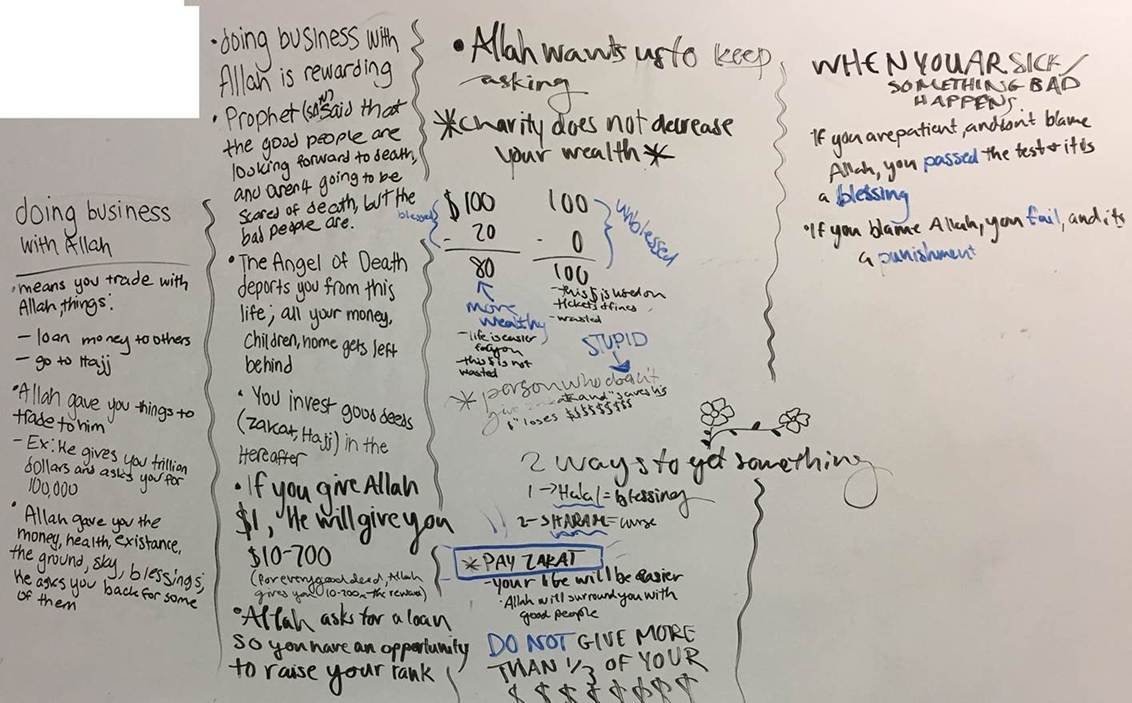
Notes (2):
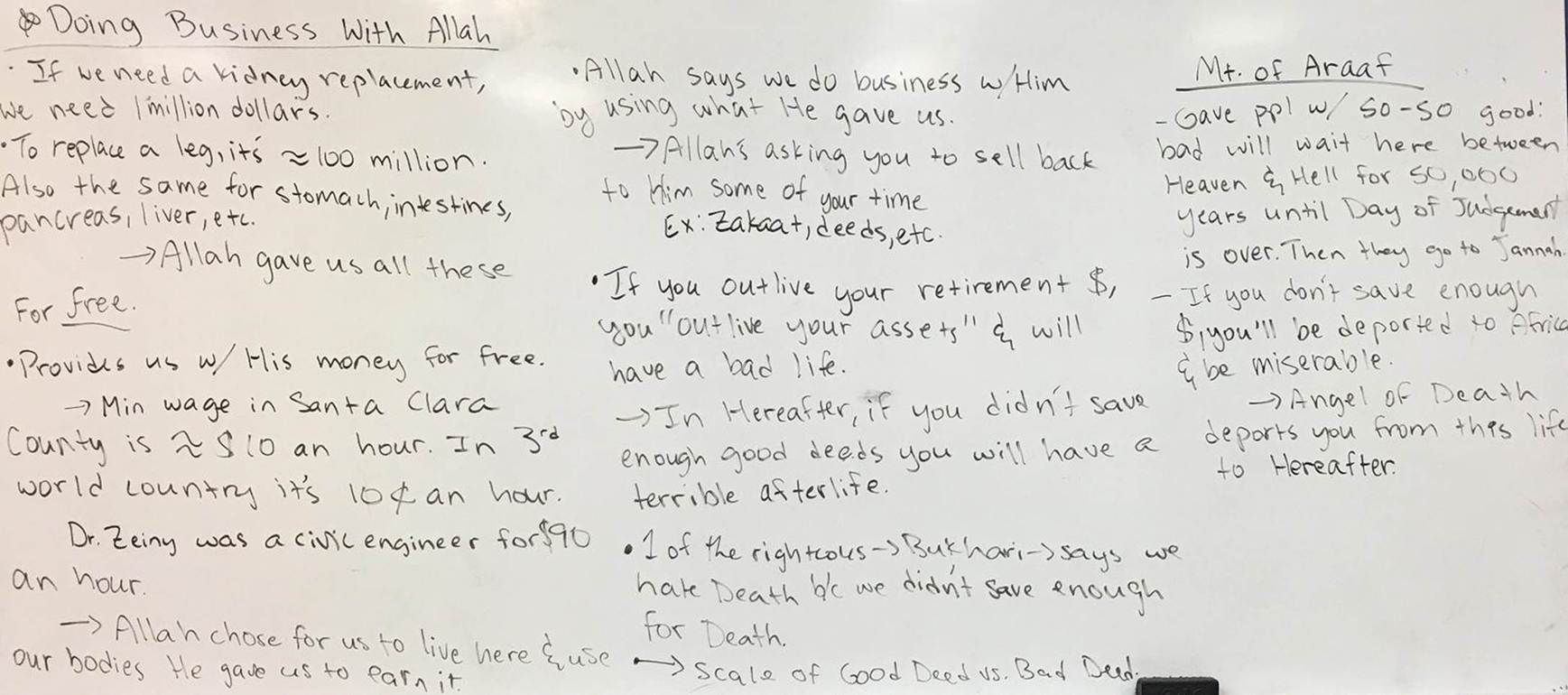
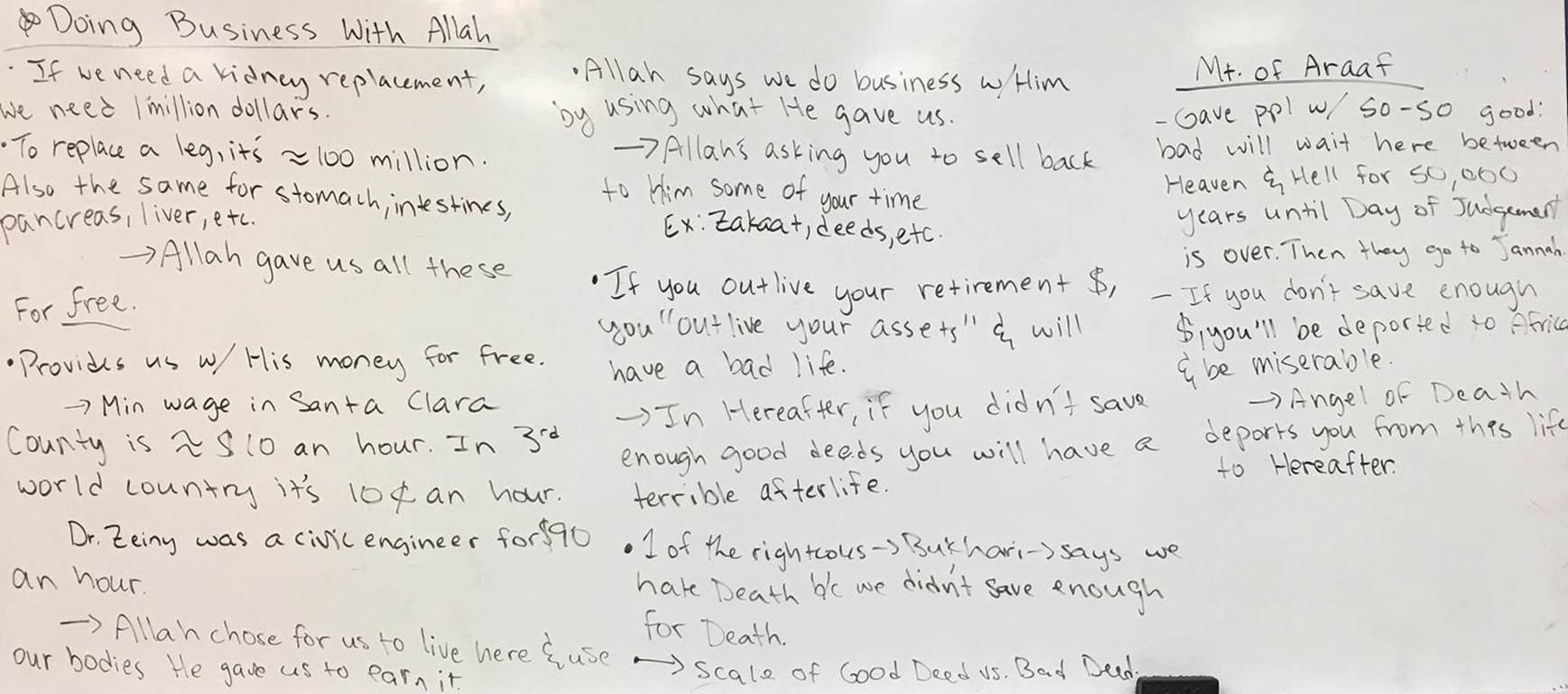
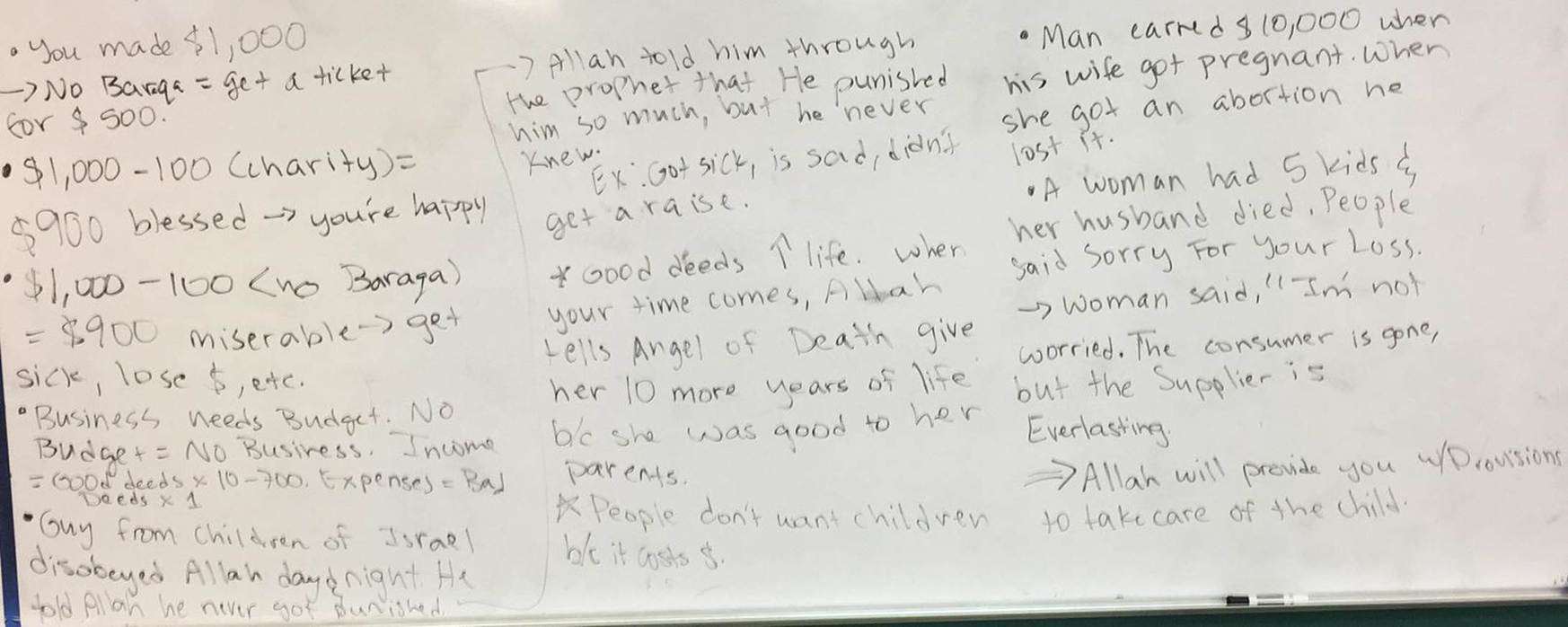
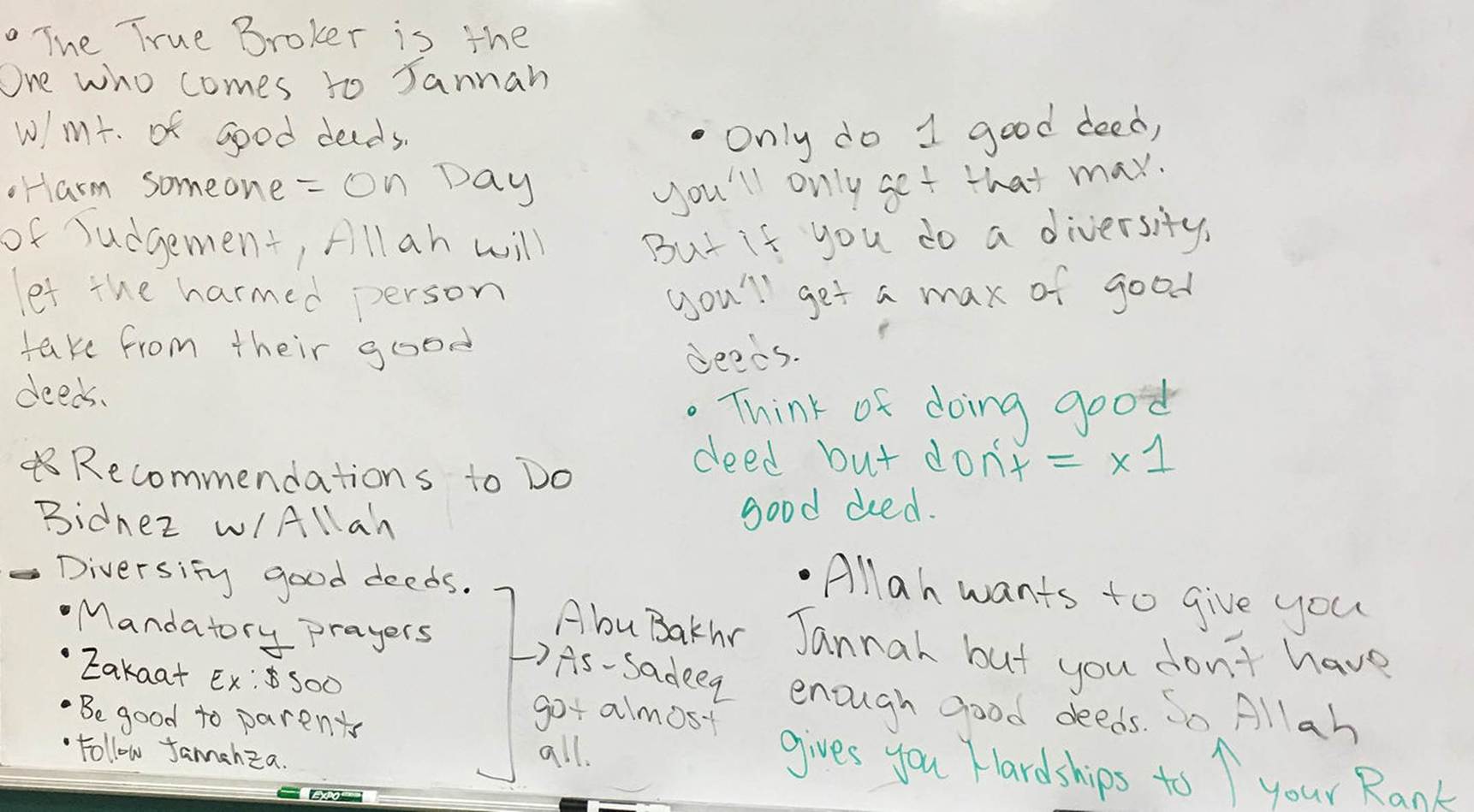
Lesson [31] Lessons from COVID-19 Crisis – By Sheikh Dr. Yasir Qadhi.


Seven Lessons from the Crises of Coronavirus
(COVID-19) by Shaykh Dr. Yasir
Homework:
Listen to the lecture and explain the seven
wisdoms that come from the crisis. Add one of your own.
Lesson [32] The American Dream – By Sheikh Dr. Yasir Qadhi.


Homework:
Listen to the lecture and answers the following
questions.
1. Why did Allah ﷻ describe all the
ones who did not answer his call to be people as cattle and worse than cattle.
2. About the pleasure of the stomach and the
pleasure of the body:
a. Are they important, not
important or don’t matter? Explain your answer.
b. Are they the purpose of
life? Describe the kind of the people who say and the ones who say no.
c. Is there a higher
purpose of life? Explain.
3. What exactly the American dream.
4. Is really there a higher power, a supreme power
or a God?
5. How many people in the world they don’t
associate themselves with organized religion?
6. What is the watch maker argument about the
existence of God? Explain it.
7. What is the morality arguments argument about
the existence of God? Explain it.
8. Do people search for a deity to commit to? Give
examples.
9. Let us say there is a God, how do we know that
he knows about us and care about us? How do we know that he is a loving God?
How do you argue this to others?
10.How do you explain the existence of harm and evil?
11.When the people of Europe and the United States reject
religion, are they rejecting Christianity or Islam? Clarify.
12.The glory years of Muslims did they happen in the presence or
absence of Islam? Explain.
13.After listening to the lecture, tell me why Islam out of all
these religions?
Lesson [33] Surat Al-Baqara 1

Click here to listen to the class.
You can use Quran Explorer to lookup the mentioned Ayat
Homework:
Read the notes (2 sets of notes), listen to the
recording and then in no less than 600 words Answer the following questions.
Short answers are not accepted. Send me the homework via email hw@zeiny.net
1. What is special about Surat Al-Baqara in terms of length?
2. Where the name of the Surah come from? Mention
the story. Mention the Ayat numbers that talks about the story.
3. How many kinds of guidance we have? What are
they? Explain them and use examples.
4. At the end of Surat Al-Fatiha, who are الضالينAl-Daleen and who are المغضوب
عيلهمAl-Magdoob Alyhm? Give examples of each.
5. Explain the similarity between someone who knows
the truth but don't want to follow it and the one who is trying to lose weight.
6. The Surah speaks about four kinds of people. Who
are they and how many Ayat were assigned for each kind. Mention the Ayat
number.
7. Why the hypocrites were described using more
Ayat than the other two kinds.
8. Why did 1/3 of the Surah dedicated to talk about
the Jews who denied the message of Prophet Mohamed ﷺ?
9. What do you learn from Ayat (6:20) and (2:75)
about the Jews?
10. What is the story mentioned in Ayah (2:89).
11. Why did Allah ﷻ blame the Jews who denied that Prophet
Mohamed ﷺ is a Prophet for the mistakes of the
early Jews who worshiped the kaaf and killed the Prophets?
12. Mention the reasons for which the Jews rejected
the Prophet ﷺ despite the fact that they had detailed description of him in
their book. Hint use Ayah (2:90).
13. Describe the link between Ayah (1:6) in Surat
Al-Fatiha and Ayah (2:2) in Surat Al-Baqra.
14. In Ayah (2:7) Allah ﷻ said that he sealed the hearts, the ears
and the eyes of the non-believers so that they can't see the truth. How is that
fair? Why didn't Allah ﷻ open their hearts, ears and eyes
instead of sealing them.
15. What is the story about the last two Ayat in
Surat Al-Baqra?.
16. Why does the hypocrites believe that righteous
people are idiots? Mention examples. Hint: you don't know what you are missing.
17. Mention the illustrative examples mentioned
about the personality of the hypocrites. Hint: one is related to the fear of
making a commitment and the other is about plugging their ears.
Notes (1):
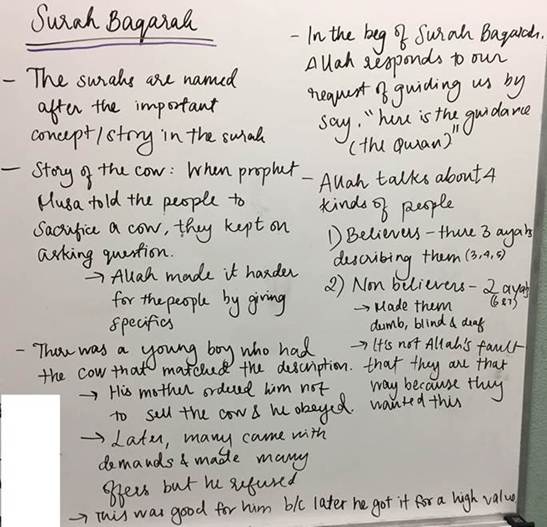
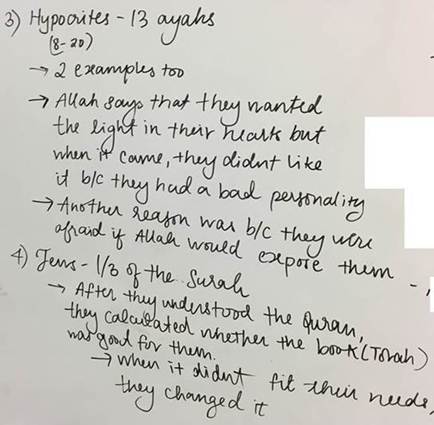
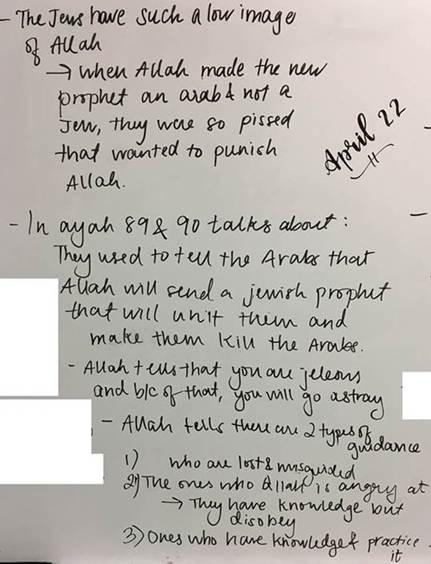
Notes (2):
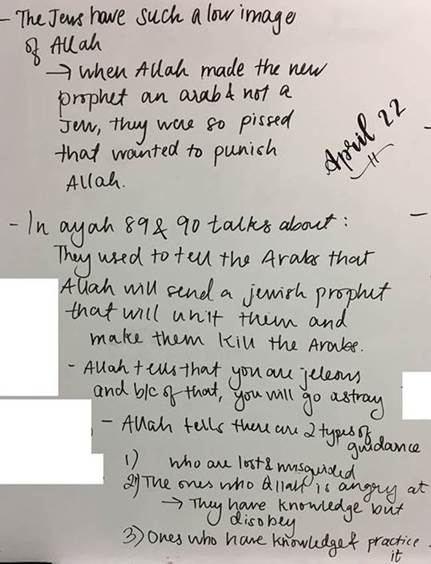
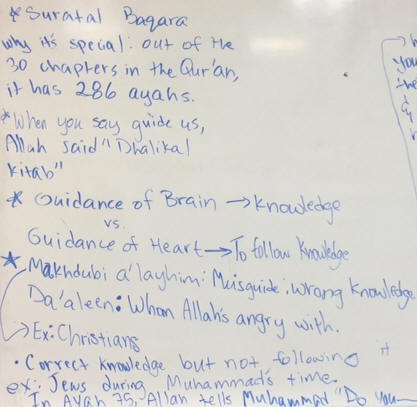
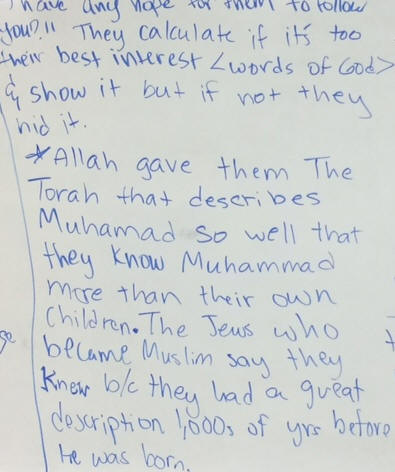
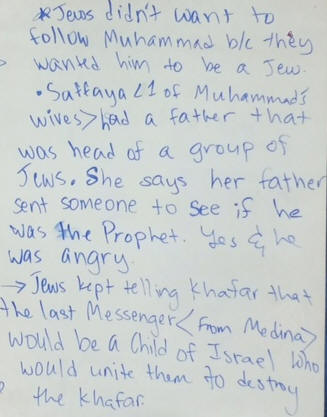
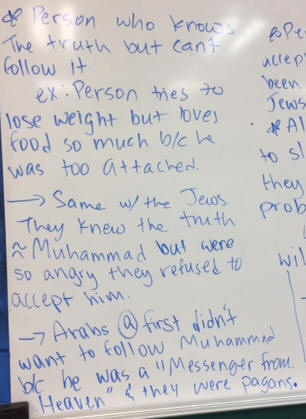
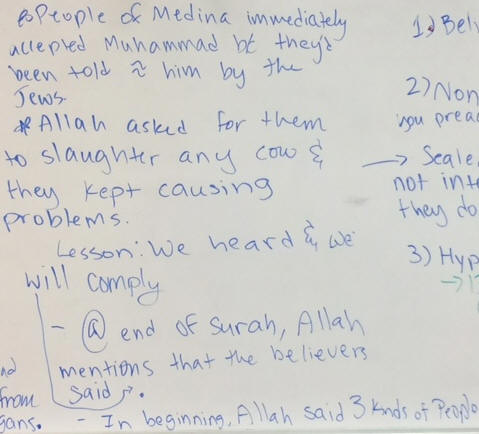
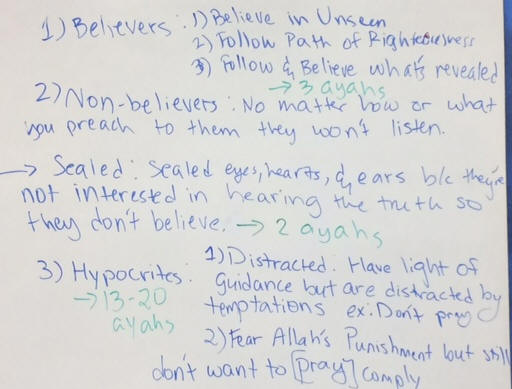

Lesson [34] Surat Al-Baqara 2
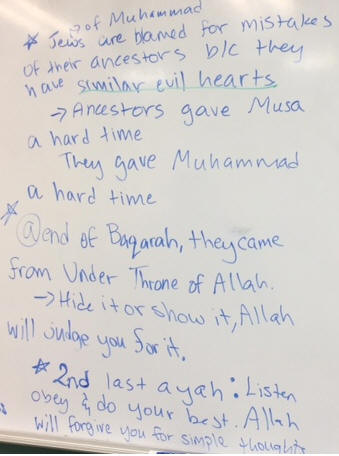
Click here to listen to recording
of the class.
You can use Quran Explorer to lookup the mentioned Ayat
Homework:
Read the notes, listen to the recording and then
in no less than 600 words Answer the following questions. Short answers are not
accepted. Send me the homework via email hw@zeiny.net
1. Explain the story in
2:102, what was the Shytans recite about the royal
powers of Suliman? Who are Haroot and Maroot mentioned in the Ayah?
2. How is black majic done?
3. Before the birth of
Prophet Mohamed ﷺ, could the Shytans sneak to heaven
and listen to the talks of the angels? What happened after the birth of Prophet
Mohamed ﷺ.
4. What is the nature of
Jinn? How can they make themselves visible to us.
5. How is the Jinn able to
bring the thrown of Balqis from Yemen to Jerusalem?
6. Mention the story of
Taloot and Jaloot (Goliath) and how Allah ﷻ
filtered the army soldiers to weed out the weak ones. Who killed Jaloot? The story is in 2:246-251.
Board
Notes:
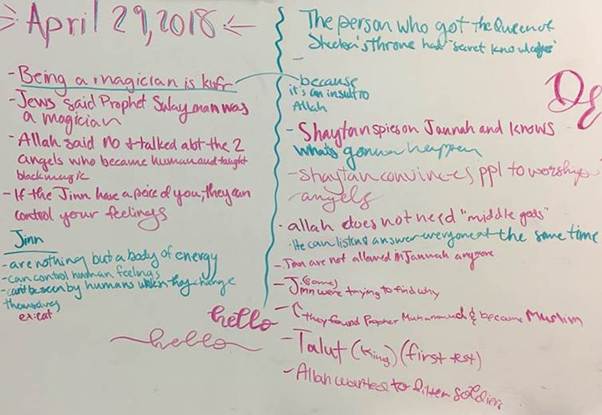
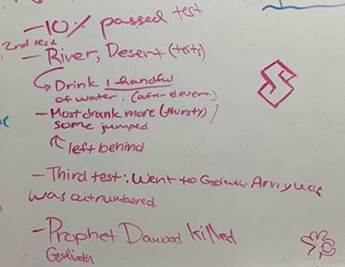
Lesson [35]: Modern Challenges – Speech to the Muslim Youth by Dr. Yasir Qadhi.
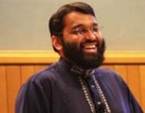
Dr. Qadhi
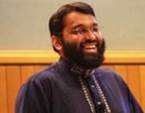
Homework:
Listen to the lecturer by Sheikh
Dr. Yasir Qadhi, and then answer the questions below from the
lecture. Be thorough. No short answers are accepted.
1. What are the differences
between the generation of Muslim youth born and raised in America and their
parents who immigrated?
2. Why some young Muslims
make fun of their immigrant parents? How do you reply to these reasons?
3. Describe the some of the
challenges that the early Muslim immigrants in the sixties and seventies had to
go through.
4. Why do we have to stand
up in support of other victims of injustice by the American government and/or
society?
5. What is the meaning of
speak truth to power? Do the Muslim youth need to do that? Why?
6. Who is the single
greatest American Muslim? What was his position regarding Vietnam war? Why did
he take this position?
7. What are our
responsibilities as American Muslims?
8. What is the true
patriotism? Is it to support America regardless if it is right or wrong?
Explain.
9. What do you think about
the speech? Provide your own thoughts.
Lesson [36]: 7 Wisdoms of pain and suffering – Shaikh Dr. Yasir Qadhi

Homework:
Listen to the lecturer by Sheikh
Dr. Yasir Qadhi, and then answer the following question from the
lecture. Be thorough. No short answers are accepted. You can add your own
thoughts at the end.
1. What are the seven
wisdoms of pain and suffering?
2. What do you think about
the speech? Provide your own thoughts.
Lesson [37]: – The Day of Judgment [1] (Lecture No. 1). By Shaikh Dr. Yasir Qadhi

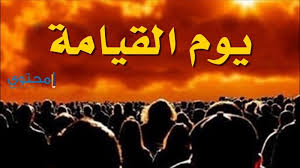
Listen to the lecturer by Sheikh
Dr. Yasir Qadhi and then answer the following question from the
lecture. You can add your own thoughts at the end. Be thorough. No short
answers are accepted.
1. This religion is based on three fundamental
pillars. What are they?
2. All religions of the world can be divided into
two kinds. What are they? Name the religions in each kind.
3. Almost all religions believe in either the Day
of Judgment, Karma or reincarnation. Which kind believe in Karma and which
religion believe in the Day of Judgement?
4. How is Karma or reincarnation related to the
concept of the Day of Judgement?
5. Did the classical early Judaism believe in the
Day of Judgment? How about the main stream modern Jews today, what do they
believe in?
6. What are the seven techniques (or genres)
mentioned in the lecture that Allah ﷻ used to prove the Day of Judgment? Give
examples of each techniques. Make sure your answer is
thorough.
7. What are the eight benefits mentioned in the
lecture of believing in the Day of Judgement? Make sure your answer is
thorough.
8. After listening to the lecturer, what are your
thoughts about the subject and the contents?
Lesson [38]: – The Day of Judgment [2] (Lecture No. 5). The Plains of Judgment Day. By Shaikh Dr. Yasir Qadhi
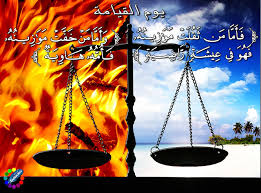

Listen to the lecturer by Sheikh
Dr. Yasir Qadhi and then answer the following question from the
lecture. You can add your own thoughts at the end. Be thorough. No short
answers are accepted.
1. The punishment is similar kind to the sin, i.e. same
genres. Give five examples of the condition of the bodies at resurrection of
the following:
a. The one who constantly
asks people and he has no need.
b. Martyrs.
c. The one who was giving
Athan.
d. The one who has been
drinking alcohol.
2. Regarding cloths at the time of resurrection,
people are going to be naked and uncircumcised. Who was the one resurrected
first and who is the first one to be clothed?
3. Animals are going to be resurrected. Mention the
evidences from the Quran that proves the answer. Why animals are resurrected
and what is going to happen to them at the end?
4. Who would wish to be ended like the animals? Why
are they making this wish?
5. Who is the one who is resurrected blind? What
was his sin and how is it from the same genres as the sin?
6. How long the Day of Judgment? Does everybody
have the same perception of how long it is? Explain how?
7. Where is the Hashir (tight gathering) take
place, also called Mawqif (موقف)?
Which land? Is it in the same earth we have now? Are the skies going to be the
same skies we have now?
8. Describe the land of gathering in details, such
as color, terrain, size, …etc?
9. How do we find each other in the Day of
Judgment?
10.Describe the default condition of the people in the land of
gathering in terms of their heads, eyes and hearts/
11.How high the sun above the heads? There are two
interpretations, mention both.
12.Due to the closeness of the sum, people will sink in sweat. How
high is the sweat and on what basis the height would be decided?
13.Add your own thoughts about the lecture.




